321 Interesting Chemistry Topics & Writing Tips
Chemistry studies matter and what it’s made of. It tells us how substances change and what properties they have. Chemistry seeks to answer questions such as: What is the Universe made of? How do elements react with each other?
Read our article to dive deeper into this intricate subject. What is more, we’ve prepared a list of 300 exciting chemistry-related topics. You can choose between organic, nuclear chemistry, biochemistry, and other branches. Our interesting topics in chemistry will make your studies more enjoyable!
Don’t forget that writing is our element. Is your assignment’s deadline closing in? Our custom writing service will take the pressure off you!

🔝 Top 10 Interesting Chemistry Topics
- ✅ Branches of Chemistry
- ✍️ Writing Tips
⭐ Top 10 Chemistry Essay Topics
- 🔬 General Chemistry Topics
- 🧑🥼 Chemistry Project Topics
- 🤔 Advanced Chemistry
- 🦠 Biochemistry
- 🧬 Organic Chemistry
- ♻️ Green Chemistry
- ⚗️ Inorganic Chemistry
- ⚛️ Nuclear Chemistry
- 🧮 Analytical Chemistry
- 🧪 Physical Chemistry
🔍 References
- Biochemistry in nursing
- Crystalloids vs. colloids
- The purpose of dilutions
- Principles of electrochemistry
- Why is stoichiometry so difficult?
- Are there alternative periodic tables?
- The polarity of bonds classification
- How is nuclear chemistry used?
- The importance of Lewis electron dot structure
- Endothermic reactions vs. exothermic reactions
✅ Main Branches of Chemistry
Chemistry is a broad subject that uses various methods of study. Because of this, scientists divide it into five main branches. These are organic, inorganic, physical, analytical, and biochemistry . Let’s investigate them:
- Organic chemistry examines life. It seeks to understand the molecular structure and behavior of living beings.
- Inorganic chemistry focuses on materials rather than living beings. Chemists of this field aim to advance technology.
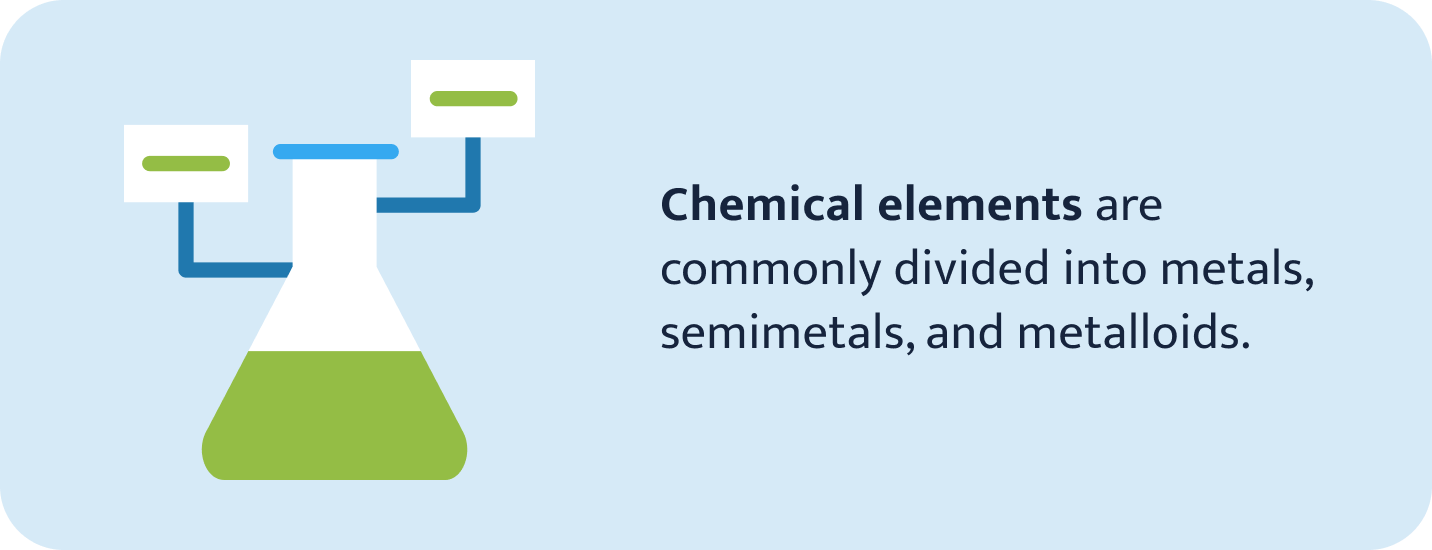
- Physical chemists examine the atomic level of matter. This branch uses physics to study the processes in chemical systems.
- Analytical chemists investigate what matter consists of. They look for new analyzing procedures and ways to enhance existing ones.
- Biochemistry studies the fundamental biological systems. It improves our understanding of essential medical issues.
Now that we’ve sorted out chemistry basics, we can examine how to write about it. Whether you’re in high school or already in college, the following guide will help you compose an excellent chemistry paper!
✍️ Tips on How to Write a Chemistry Paper
Each subject has its own rules when it comes to writing papers. In chemistry, the organization is the key. That’s why the first step is to have your lab notes in order. Keep your notebook neat and tidy, and you will see that writing becomes much more manageable.
On top of that, it’s good to have an idea of what an excellent paper should be like. There are three major points you should keep in mind: objectives, style, and structure.
- Objectives. Your goal is to identify and convey valuable information. If you want to share it with others, it should be presented as credible scientific work.
- Introduction. Say what your paper will be about.
- Methods. Present the methods and materials you use.
- Results. Describe what you observed during the experiment.
- Discussion. Analyze the results and summarize the relevance of your study.
- Style. Grammatically correct writing is a must. Your style should be formal, concise, and clear. Use the right tense: write your methods and results in the past. For general truths, you can switch to the present.
Finally, don’t forget that for any type of writing, the right topic is crucial. For inspiration, check out our excellent chemistry paper topics!
- The history of neurochemistry
- Astrochemistry vs. astrophysics
- Is radiochemistry a dying field?
- Pros and cons of being a biochemist
- New concepts of chemical engineering
- What makes quantum chemistry difficult?
- The importance of agricultural chemistry
- The impact of WW2 on computational chemistry
- Ernest Rutherford’s contribution to nuclear chemistry
- Computer chemistry vs. computational chemistry
🔬 General Chemistry Topics to Write About
Chemistry surrounds us in our everyday life. Have you ever seen moldy bread or boiling water? That’s chemistry in action. Have a look at these 30 easy topics for an introduction into chemistry:
- What happens to your body when it lacks vitamins?
- How does acid rain form?
- Understanding pheromones: how do they affect humans?
- Explain what atoms are made of.
- Ionic and covalent compounds: a comparison.
- How do you solve stoichiometry problems?
- Give an overview of the states of matter.
- A delicate balance: how do chemicals in our brains create moods?
- Describe the noble gas configuration.
- Marie Curie and her extraordinary legacy.
- An introduction into acids and bases.
- Write about hydrologic cycles.
- What happens when a substance oxidizes?
- Explain substitution reactions.
- Compare the Bohr model with the plum-pudding and the Saturnian models.
- How does a Geiger counter work?
- Describe the significance of Rutherford’s gold foil experiment.
- How Michael Faraday forever changed the scientific landscape.
- What does Prout’s hypothesis state?
- The history of european alchemy.
- What are the periodic trends?
- Explain how to analyze amino acids using protein hydrolysis.
- What do catalysts do?
- Everything about lab safety.
- The radium craze of the early 20th century.
- How does substance abuse impact your body?
- Why is it essential to study chemistry in high school?
- Reaction rates: how do we define them?
- Before chemistry: ancient philosophy of things changing.
- Examine how radioactive decay occurs.
🧑🥼 Chemistry Projects Topics for Science Fair
Experiments are, without a doubt, the most fun part of chemistry. It’s exciting to watch colorful substances fizzle and bubble. If you need ideas for your next project, look no further. Just make sure to follow safety rules!
- Discover what determines the color changes when iodine and starch react.
- Find out how to make photosynthesis visible.
- Try to synthesize Aspirin.
- Develop film and explain how you did it.
- Fiddle a wire through an ice cube without drilling holes.
- Assess the quality of water and find out what contaminates it.
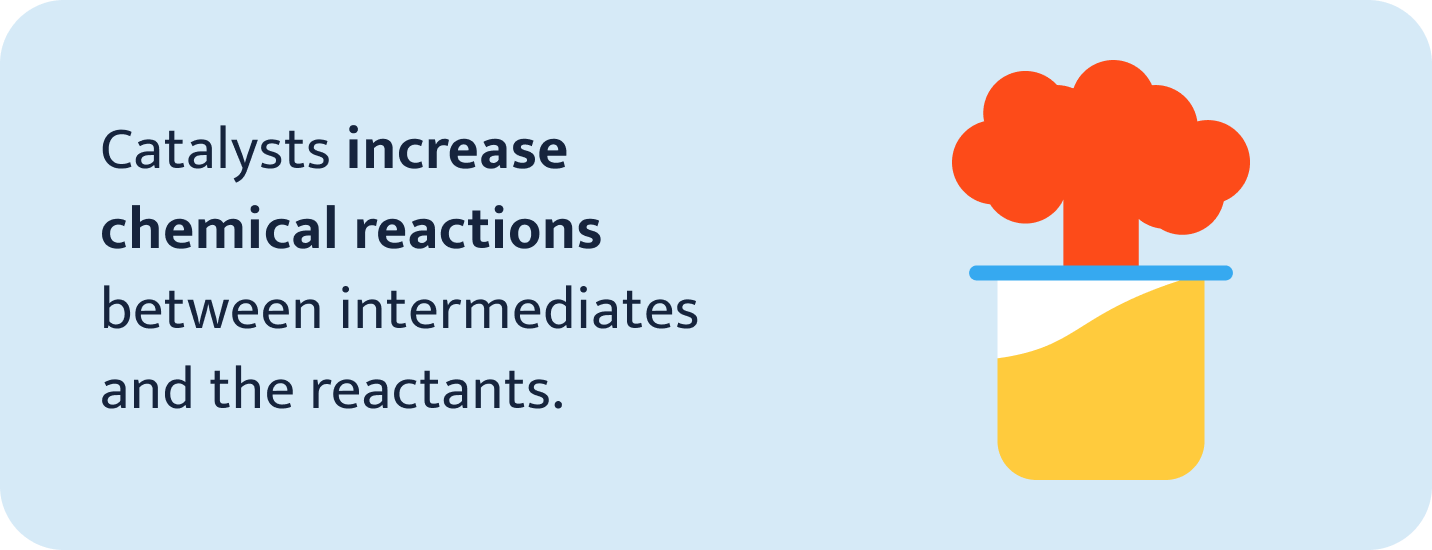
- Extract plant oil and study its properties.
- Observe what happens if you dye wool with different colors.
- Learn how to make a solution change color.
- Determine the amount of caffeine in various sorts of tea.
- How do you produce biogas or liquid from organic waste?
- Analyze the contents of your toothpaste. Can you find any health hazards?
- Make a water filter from scratch.
- Why does lemon juice stop apples from browning?
- Make a safe smoke bomb.
- Document the process of growing crystals.
- Identify the pollutants in the air around you.
- What makes a flame change color?
- Biometric technologies: how do they work?
- Study invisible ink. What makes it disappear?
- Wine: how do its chemical compounds relate to its taste?
- Emulsions: how to make and break them.
- Compare the effectiveness of different vegetable oils in biodiesel manufacturing.
- Assess the residue of pesticides in vegetables from various markets.
- Measure the density of soft drinks. How does sugar affect it?
- Conductivity: what types of solutions are the best electrical conduits?
- Food and science: how much energy do nuts and chips produce when burned?
- Analyze your hair and check for nutrients.
- Examine what soap needs to foam properly.
- Change a penny’s color to gold.
🤔 Advanced Chemistry Topics for an Essay
Once you’ve mastered chemistry’s fundamental concepts, you’re ready for the advanced part. Here, you will explore topics such as kinetics, equilibrium, and thermodynamics. Consult our list for 30 interesting advanced chemistry topics:
- Polymers: what do we use them for?
- How do spectroscopes work?
- What chemical information can we find in meteorites?
- Spectroscopy and its many applications.
- Schrödinger’s Cat: what did it reveal about radioactive decay?
- Examine the properties of imino-disaccharides.
- The importance of carbohydrate-protein interactions in immunology.
- CRISPR: how does it work?
- Compare the types of noncovalent bonding.
- Investigate how molecular recognition can be produced synthetically.
- Describe the impact of nanotechnology.
- How does nanoscience change our lives?
- What does Le Châtelier’s principle state?
- CBD: what advantages does it have?
- What causes a chemical process to result in equilibrium?
- Compare the types of equilibrium.
- BPA : how toxic is it?
- Behavior of ideal vs. non-ideal gases.
- Magnetism and coordination compounds.
- The principles of molecular orbital theory.
- Why do certain compounds not exist?
- How does water recycling work?
- Cloud seeding: when is it useful?
- What causes the weather to change?
- Why do some plants rely on photosynthesis more than others?
- Describe the properties of hydrogen.
- Explain the connection between collision theory and concentration.
- How do the ab initio methods work?
- Chemistry and the brain: impact of neurotransmitters.
- Examine the dopamine hypothesis of schizophrenia.
🦠 Biochemistry Topics to Research
Have you ever wondered what chemical processes happen inside living organisms? Here’s an example: when we breathe, we inhale oxygen and exhale carbon dioxide. Biochemistry combines biology and chemistry to find out how life works on a molecular level. It’s a life science that deals with the cells, proteins, and lipids that form the core of every being. Clinical research highly benefits from biochemical knowledge.
- Explain enzyme inhibitors and their mechanisms.
- What are the benefits of epigenetics?
- Enzyme activity: how can you regulate it?

- Understanding the role of lipase in pathophysiological processes.
- The chemical processes behind metabolism.
- Amino acids: industrial applications.
- Consequences of a protein deficiency.
- Dietary supplements: help or hazard?
- How does the Citric Acid Cycle work?
- Glycolysis : how does it convert glucose?
- How do solutes move through biological membranes?
- Explain the sodium-potassium pump.
- Describe networks and alliances of the biotechnology industry.
- How does the body react to chlorine exposure?
- Cells gone rogue: the origins of cancer .
- Investigate the functions of hormones.
- How can we develop new vaccines?
- Discuss the ethics of stem cell research.
- The legacy of Dolly the sheep.
- SCNT: process and applications.
- What are the chemical compounds of blood ?
- How do you treat hemophilia?
- The development of prokaryotes vs. eukaryotes.
- Discuss the cloning of a DNA fragment and Southern blotting.
- How does oxidative phosphorylation synthesize ATP?
- Compare the three types of crystallography.
- Copying DNA: the principles of PCR.
- How does recombination repair work?
- What causes redoximorphic features in various soils?
- Obtaining protein structures with x-ray crystallography.
🧬 Organic Chemistry Topics for Papers
Organic chemistry serves as the foundation for biochemistry. It is centered on carbon, which is essential to life. Carbon often bonds with other elements as well as itself. That’s what makes it the basis for all organic structures.
- Describe the properties of a chiral molecule.
- Atmospheric chemistry: methods and observations.
- Write about antioxidant potency of polyphenol-rich beverages.
- Enantiomers and the Fischer projection practice.
- Investigate possible relationships between stereoisomers.
- What are the benefits of chemoenzymatic synthesis?
- Explore the history of vitalism.
- The production of chemicals using carbon-carbon bond-forming reactions.
- Hydrocarbon: types and reactions.
- Examine the four essential types of organic compounds.
- How do free-radical reactions work?
- Pathogens: infection cycle and disinfection methods.
- Give examples of esters in everyday life.
- How do you turn alcohols into alkyl halides?
- Mechanisms of aerosol formation.
- Recent discoveries in molecular tuning.
- Chemical warfare: the dark side of organic chemistry.
- What makes a plant poisonous?
- What makes aromatic compounds unreactive?
- Phosgene: what makes it toxic?
- Explain the mechanism of the Diels-Alder Reaction.
- Alpha carbon reactions: when do aldol condensations occur?
- How do you identify organic compounds using infrared spectroscopy?
- Bonds as springs: the mechanical molecular model.
- Antibiotic resistance: causes and effects.
- Identify factors that influence proton chemical shifts.
- What does the electron dot structure show?
- The properties and reactions of functional groups.
- What defines a compound as aromatic?
- How do you name amines?
♻️ Green Chemistry Topics to Write About
If you’re concerned with sustainability, green chemistry is your area of choice. It finds ways to make chemical products less harmful to the environment. Research is done at every stage, from the product’s design to its disposal.
- How do you prevent pollution?
- What do you do with toxic waste?
- Discuss the twelve principles of green chemistry.
- Source reduction: what are the most effective ways?
- Biomimicry: is it the best way to sustainability?
- Eco-friendly packaging and its issues.
- Compare the effectiveness of various materials used in solar cells.
- What are the advantages of molar efficiency?
- Ionic liquids: are they the future of eco-friendly reagents?
- The U.S. acid rain program: pros and cons.
- How can the toxicity of paint be reduced?
- Innovative ways to avoid pesticides in agriculture.
- What are the types of bio-based renewable feedstocks?
- Are bioplastics beneficial for the environment?
- How do metathesis reactions help reduce greenhouse gas emissions?
- Computer chips: how do we make them more sustainable?
- Alternative energies: making fuel from chicken feathers.
- Is carbon capture effective?
- Will cultivated meat become a green alternative to traditional farming?
- How does the Plantrose process work?
- Discuss the petroleum products problem in the U.S.
- What are efficient ways to extract and use critical elements more
- How efficient is artificial photosynthesis?
- What are the best ways to remove carbon pollution?
- Electrocatalysis as a way to generate and consume fuels.
- Discuss the most pressing issues in green chemistry today.
- How does LCA work?
- What are efficient ways to extract and use critical elements more sustainably?
- Recycling and recovery of plastic.
- Describe the advantages of Levulinc Acid use.
- How can we make nuclear energy more viable?
⚗️ Inorganic Chemistry Topics for a Paper
Metals and minerals are parts of inorganic chemistry. Scientists in this field want to understand the behavior and properties of inorganic compounds. Practical uses include the manufacturing of fertilizers, adhesives, and coatings.
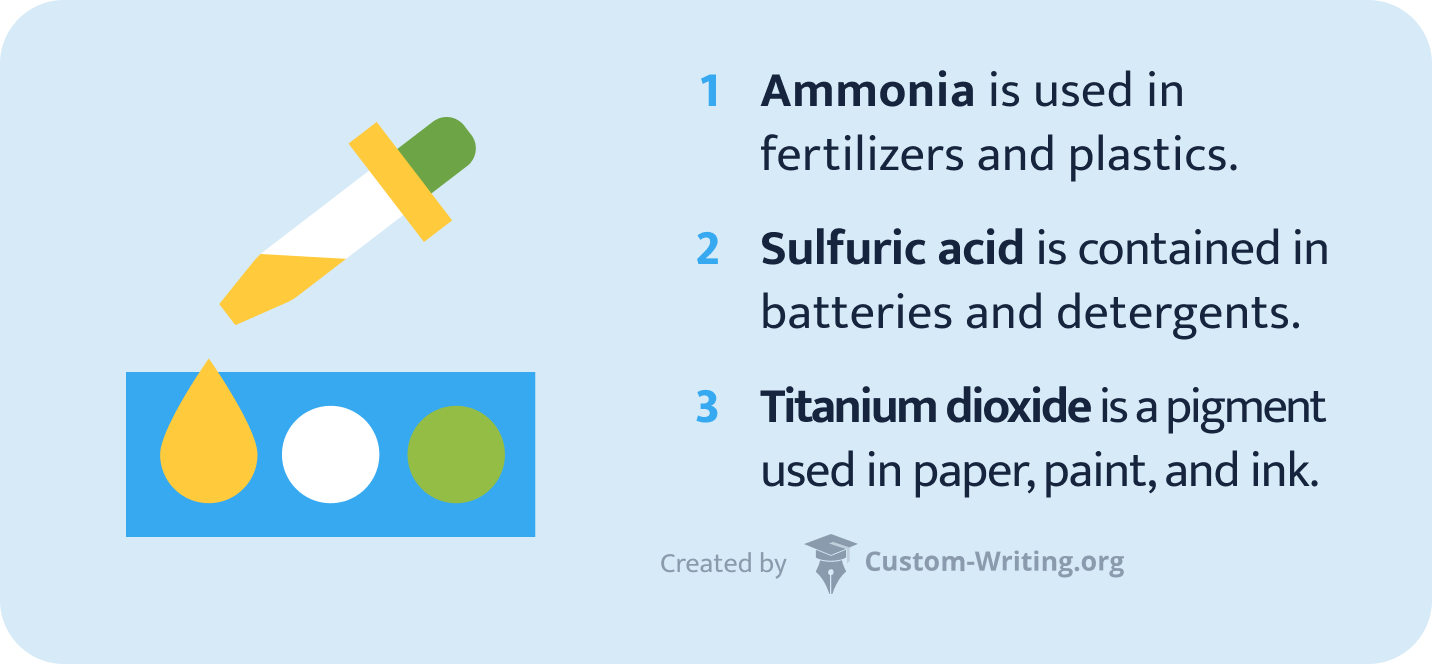
- What are the types of nucleosynthesis?
- In which ways are chemicals able to bond?
- How does molecular symmetry predict the chemical properties of a molecule?
- Vibrational spectroscopy: what is it used for?
- Discuss the importance of inorganic compounds in biochemistry.
- The history of atomic theory: an overview.
- Hematite: matter and mineral.
- The peculiarities of hydrogen bonds and polarity.
- What are the uses of point groups in inorganic chemistry?
- Determine the factors that impact Brønsted-Lowry acidity.
- How does HSAB explain reaction mechanisms?
- What is lattice energy, and how can you measure it?
- How do you use coordination compounds as catalysts?
- Red Ferrosols: soil management issues.
- Examine the drawbacks of the crystal field theory.
- Define the selection rules for vibrational transitions.
- What is the most effective way to grow synthetic diamonds?
- How do you use the angular overlap model?
- Explain ligand effects.
- The magnetic properties of transition metal oxides.
- Gold: how does it serve medicine?
- The use of chemistry in jewelry manufacturing.
- How does the chemical structure of a gemstone determine its color?
- Alexandrite: what makes it so unique?
- How do ligand substitution reactions work?
- Determine the properties of the light types.
- What are the fundamental laws of photochemistry?
- What causes phosphorescence?
- Alloys: what are their benefits?
- The history of brass and its usage.
⚛️ Nuclear Chemistry Topics for an Essay
You’ve probably been x-rayed before. It means you’ve been exposed to radiation. Nuclear chemistry seeks to understand radioactivity-related processes. One of atomic science’s most critical problems is the disposal of radioactive waste.
- How do you calculate an element’s half-life?
- Compare the three different types of radiation.
- What are the common uses of radioactive elements?
- How do we know that a nucleus is stable?
- Fukushima and Chernobyl disasters: a comparison.
- How do elements transmute in the process of nuclear fission?
- Cold fusion: will it ever be possible?
- Radiation: how does it harm biological systems?
- Describe the types of decay.
- Nuclear waste: reprocessing, disposal, and transportation.
- How is nuclear chemistry used in medicine?
- Ways to destroy toxic organic compounds using irradiation.
- Interactions between water and radioactive elements.
- How are chemosensors used in radiation chemistry?
- What are the biological applications of radiochemistry?
- The nuclear fuel cycle: managing the disposal of nuclear fuel.
- Discuss reactive hazards in the chemical industry.
- Compare the efficiency of different extraction methods.
- Fission products and surfaces: what happens when 9TcO2 gets in contact with steel?
- Isotopic chemistry: what distinguishes it from nuclear chemistry?
- Explore the history of NMR.
- Henri Becquerel and the discovery of radioactivity.
- The relevance of hydrogen in nuclear fusion.
- What causes radioactivity?
- The adverse effects of ionizing vs. non-ionizing radiation.
- Why are some people skeptical about the term “nuclear?”
- The Big Bang: how did it create the Universe as we know it?
- Discuss the unsuccessful efforts in nuclear arms control.
- How does radiocarbon dating work?
- Mass spectrometry: ionization techniques.
🧮 Analytical Chemistry Topics for Essays
The matter comes in all forms and shapes. It can be a compound or a single element. If you want to know how matter is structured, analytical chemistry has the answer. Scientists of this branch ensure that our food and other products are safe to consume.
- How does activation analysis work?
- Why is analytical chemistry important for the environment?
- How do you find iron in a mixture of metals?
- What are the ways to measure the amount of a specific substance in a compound?
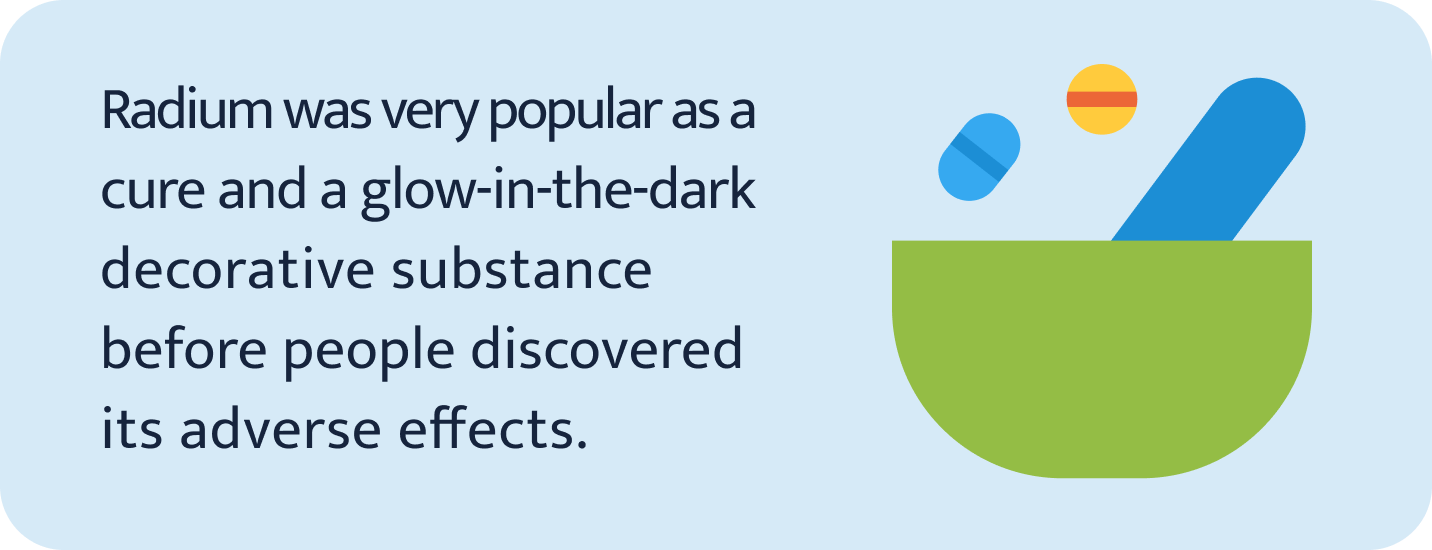
- Identifying hazardous substances in cheese.
- A simple way to separate chemical compounds: gas chromatography.
- Aspirin vs. Ibuprofen: comparing the chemical mechanisms of pain relievers.
- Genetically modified foods and their impact on human health.
- Food allergies: where do they come from?
- The best techniques for quantitative chemical analysis.
- What are the standard techniques to measure the endpoint of a titration?
- Mass-based analysis: gravimetric analysis.
- How do you neutralize WVO?
- Drug safety approach in administration and nursing.
- Describe the three types of electroanalytical methods.
- How do you measure temperature using a calorimeter?
- Understanding thermodynamics: the Carnot cycle.
- The process of analyzing salt.
- How do you identify the shelf life of a medicine?
- Ways to find adulterants in drugs.
- Compare the healthiness of bottled water based on its chemical compounds.
- How can you test cholesterol in blood samples?
- Examine how analytical chemistry is used in forensic science.
- What are the advantages of spectrochemical methods?
- How do you detect pesticides using immunoassays?
- Miniaturization: how does it advance analytical chemistry?
- Capillary Liquid Chromatography: an overview.
- Immunochemistry: applications in environmental analysis.
- The development of analytical technology in the past 20 years.
- Explain how to determine PAH sources in soil.
🧪 Physical Chemistry Topics for Papers
Is chemistry not enough for you? Try combining it with physics! For physical chemists, it is crucial to understand how molecules and atoms act. They use various models to study the structure and behavior of these tiny particles.
- Explain how to determine an atom’s electron configuration.
- Describe the structure of an atom.
- Isotopes: why do they exist?
- What is the Time-of-Flight principle?
- How do you calculate the mass of an atom?
- Define successive ionization energies.
- What are the gas laws?
- Equation of state: ideal vs. real gases.
- Explain why the Earth is considered a closed thermodynamic system.
- What is the Avogadro constant?
- The difference between empirical and molecular formulae.
- Calculating percentage yields: balanced equations.
- How do intermolecular forces affect the melting point of a substance?
- What are the four types of crystal structures?
- Define the types of forces that exist between molecules.
- Explain how to relate the melting point and conductivity of a substance to their type of structure.
- What is fire in terms of chemistry and thermodynamics?
- Reasons why molecules with polar bonds might not have a permanent dipole.
- How do internal combustion engines work?
- Endothermic or exothermic? Determining enthalpy change.
- What are the applications of Hess’s law?
- Explain the use of mean bond enthalpy.
- When does a collision not cause a reaction?
- How does temperature affect the reaction rate?
- How do catalysts work?
- Describe what Born-Haber cycles are used for.
- Explore the history of thermochemistry.
- Give examples of quasi-static processes.
- The study of chaos: calculating entropy.
- When is a reaction reversible?
We hope that you found a topic you like. Now good luck with your essay!
You might also be interested in:
- 501 Research Questions & Titles about Science
- A List of 212 Brilliant Research Proposal Topics to Investigate
- 220 Best Science and Technology Essay Topics to Write About
- A List of 300+ Research Paper Topics: Interesting & Unique
- 281 Best Health & Medical Research Topics
- 150 Best Environmental Essay Topics & Questions
- 625 Excellent Presentation Topics & Tips
- 560 Unique Controversial Topics & Tips for a Great Essay
- Chemistry: Encyclopedia Britannica
- Different Types of Chemistry: University of Wisconsin
- General Chemistry Topic Review: Purdue University
- General Chemistry: University of Tennessee Chattanooga
- Topics in Advanced Chemistry: University of Otago
- Biochemistry Topics List and Learning Tools: Vital-IT
- Organic Chemistry: Khan Academy
- Basics of Green Chemistry: US EPA
- Exploring the Role of Green Chemistry at a Research University: Harvard
- Inorganic Chemistry: American Chemical Society
- Advanced Inorganic Chemistry Syllabus: Westfield State University
- Nuclear Chemistry: University of Pennsylvania
- Analytical Chemistry: American Chemical Society
- Physical Chemistry: AQA
- Share to Facebook
- Share to Twitter
- Share to LinkedIn
- Share to email

Culture is a set of knowledge, behaviors, and beliefs shared by a group of people. You would probably agree that it’s an integral part of humanity. It’s no wonder that students are often assigned to write about it. That’s why we came up with a list of interesting and creative...

The Earth is a complex system. To understand it, geologists examine the lithosphere and its layers. They trace our planet’s history by using physical and chemical methods. At the same time, geographers observe environmental patterns. They also focus on the interaction between humans and nature. Keep reading to find out...

Mathematics is the science of numbers and shapes. Writing about it can give you a fresh perspective and help to clarify difficult concepts. You can even use mathematical writing as a tool in problem-solving. In this article, you will find plenty of interesting math topics. Besides, you will learn about...

Cause and effect essays examine how an event happened and what consequences it had. Gaining weight after eating lots of fast food is an example of a cause-and-effect relationship. Possible topics cover a variety of subjects ranging from mental health to history and politics. This article gives you an outline...

An analysis essay aims to break down the subject in order to understand it. You can choose to analyze a text, a process, or an idea. This article will help you write a great essay! Selecting an interesting topic makes writing a lot easier. We’ve prepared a list of excellent...

Everybody knows that being healthy requires effort. We should exercise regularly and maintain a balanced diet. However, the reward is worth it. A healthy lifestyle prevents chronic illnesses and leads to better body performance. Besides, if you improve your physical well-being, your mental health will strengthen as well! In this...

Our code of ethics is derived from what we think is right or wrong. On top of that, we have to agree to the moral standards established by the society we live in. Conventional norms generally label theft, murder, or harassment as bad. However, there are many influences that impact...

A definition explains the meaning of a term or a concept. In a dictionary, you’ll find a definition in a single sentence. A definition paper, however, encompasses several paragraphs. Such an essay, amongst other things, can include personal experience and examples. To write a successful definition paper, you need to...

As simple as it is, the purpose of the descriptive essay is to explain or portray its subject. It can focus on any topic or issue you want to write about. Be sure that any middle school, high school, or college student can manage this type of creative writing assignment!...

Rhetorical analysis essay focuses on assessing the method used for delivering a message. This assignment isn’t about giving an opinion on the topic. The purpose is to analyze how the author presents the argument and whether or not they succeeded. Keep reading to find out more strategies and prompts for...

A narrative essay tells a story about a series of events. At the core of this kind of essay can be a personal experience or a fictional plot. Any story can be a basis for a narrative essay! Narratives can look similar to descriptions. Still, they are different. A descriptive...

Similar to the instructions in a recipe book, process essays convey information in a step-by-step format. In this type of paper, you follow a structured chronological process. You can also call it a how-to essay. A closely related type is a process analysis essay. Here you have to carefully consider...
- Research Paper Guides
- Research Paper Topics
200+ Chemistry Research Topics for Papers
- Speech Topics
- Basics of Essay Writing
- Essay Topics
- Other Essays
- Main Academic Essays
- Basics of Research Paper Writing
- Miscellaneous
- Chicago/ Turabian
- Data & Statistics
- Methodology
- Admission Writing Tips
- Admission Advice
- Other Guides
- Student Life
- Studying Tips
- Understanding Plagiarism
- Academic Writing Tips
- Basics of Dissertation & Thesis Writing
- Essay Guides
- Formatting Guides
- Basics of Research Process
- Admission Guides
- Dissertation & Thesis Guides

Table of contents
Use our free Readability checker
Do you find identifying suitable chemistry research topics difficult? You are not alone! Many students consider it challenging and time-consuming to choose an interesting chemistry topic for a research paper. In this blog post, we will discuss various research topics in chemistry to help simplify your research process. Continue reading to familiarize yourself with ideas from different fields and academic levels. Apart from defining research topics and discussing how to select one, we have provided examples to help kick-start your research project or assignments. Got a deadline approaching fast? Entrust your chemistry research paper to professional writers. Our academic service proceeds all ‘ write my paper for me ’ inquiries quickly and efficiently. Get your paper written now by an expert!
What Are Chemistry Research Topics?
Chemistry is a field of science that covers the structure, composition, and properties of elements and compounds. As a student taking this subject, you will encounter multiple experiments, chemical reactions, and analytical study methods. This branch of science can be subdivided into multiple areas, including organic, inorganic, biochemistry, physical, analytical, and nuclear science, among others. Chemistry research paper topics are talking points related to the branches of science outlined above. To ensure that all learning objectives are met, instructors may require students to work on various topics in chemistry. You would be expected to source your chemistry research topics ideas from all possible branches. In one instance, your topic could be associated with analytical science, in another - with practical discussions, which is an entirely different thing despite both areas being categorized as chemistry subfields.
Characteristics of Good Chemistry Research Topics
Selecting a good research topic for chemistry plays a vital role in determining the probability of success when writing your paper. It is, therefore, important to know the characteristics of good chemistry topics for a research paper. Although you can derive discussions from many sub-areas, these research topic ideas share many common characteristics. A great research topic should be:
- Precise, meaningful, clear, and straightforward
- Analytical and researchable using logical methodologies
- Of theoretical or practical significance
- Supported by numerous academic evidence and sources.
How to Choose a Chemistry Research Topic?
Chemistry is a broad subject with multiple research areas. If you are not keen enough, you may easily get lost in its variety and fail to select a congenial title. So, how do you deal with this issue? In a nutshell, the process comes down to two aspects – your passion and competence. Below are step-by-step guidelines that you can follow to determine interesting topics about chemistry:
- Pick chemistry research topics with your knowledge capabilities in mind. Do not choose a topic that is beyond your academic level.
- Choose something that is interesting to you. If you are fascinated with the selected topic, you will find responding to the research questions to be much simpler.
- Select a research title that is convenient to work on due to the sufficient amount and availability of existing evidence and references.
- Ensure that the chosen chemistry topics for research paper are within the subfield you are majoring in and that it meets your instructor’s requirements.
Once you select the most appropriate title, see how to write a research paper like an expert.
Chemistry Research Paper Topics List
There are many research topics for chemistry to choose from. In this section, we have compiled examples of the best topics from various sub-areas. Below is a list of chemistry research topics for papers:
- Latest developments in DNA technology.
- Negative effects of using pesticides in food production.
- Importance and potential drawbacks of using fertilizer in commercial agriculture.
- Acids and bases: composition, properties, and applications.
- Industrial chemicals and environmental pollution.
- Dangers and side effects of using ibuprofen.
- Acid-base neutralization process.
- Air pollution implication on global warming and climate change.
- Ageing and the brain.
- Catalytic reaction mechanisms.
The chemistry research topics list above is created by drawing ideas from different sub-areas, thus covering a significant part of scholars’ inquiries.
Interesting Topics in Chemistry
In some instances, one may select a research topic because it is just fascinating. There are interesting chemistry topics that can explain intriguing phenomena in your day-to-day life. Alternatively, you can also opt for something related to essential issues in the current society. Here are sample chemistry interesting topics you can research into:
- Composition and effects of e-cigarettes.
- Food dye composition.
- Measuring electrical conductivity in a salt solution.
- How to change a penny’s color to gold.
- The scientific explanation of foam formation.
- Silicon usage in cosmetic surgery.
- Evidence and application of surface tension in day-to-day life.
- Examining pesticide residue in farm products from different grocery stores.
- How does molecule composition affect the physical appearance of things?
- Sodium metal reaction on water surfaces.
- How to separate dissolved sugar from water.
- How to clean up oil spills at sea.
- Rust formation on metal surfaces.
- How to chemically remove rust from stainless steel.
- The science behind turning boiling water into “snow” in a cold winter.
Easy Chemistry Research Topics
The science studied in high schools is way simpler compared to postgraduate one. You can find easy chemistry topics to research if you focus on certain academic levels and sub-areas. For example, physical chemistry has easy chemistry topics to do research paper on. On the other side, inorganic or analytical sub-areas tend to offer scientific research research topics that are more technical. The list below outlines easy topic examples you can pick from:
- Determining the percentage composition of oxygen in the air.
- Patterns in the periodic table.
- Atomic theory: primary principles and applications.
- Chemical and physical properties of starch.
- Determining the pH level of various liquids.
- Properties of acids and bases.
- Why is glass the preferred material in laboratories?
- Balancing chemical equations.
- Analyzing different chemical bonds.
- Alkali metals and their properties.
- General characteristics of metals.
- Noble gasses: properties and reaction characteristics.
- Water purification methods.
- The periodic table: its historical background.
- Alkaline earth metals: properties and reactivity.
Innovative Research Topics in Chemistry
Innovative chemistry topics for research paper relate to new ideas and ways to go about things. Using these ground-breaking topics related to chemistry, you can discuss new materials or methodologies. If you are interested in innovative research topics, here are some examples you can borrow from:
- Gene modification in medical chemistry .
- Improved cancer treatment using bacteria-based biohybrid microrobots.
- New methods used to detect explosive residues.
- Studying the molecular makeup of particles in space.
- Substitute for pesticides in farming.
- Nanophotonics in aeronautics.
- Nanomaterials production process and techniques.
- Clean energy alternatives for fossil fuels.
- Photocatalysis usage in 3D printing technology.
- Biodegradable polymers as alternatives for plastics.
- Silicon dioxide usage in solar cells.
- Chemical reactions in lithium-ion batteries.
- Self-healing concrete: basic principles.
- New materials for lightweight planes and vehicles.
- Polymer analysis in a restricted environment.
Cool Chemistry Research Topics
Sometimes, our title selection might be guided by how cool and fun the study results will be. If you are looking for cool chemistry topics to research on, you are in the right place. We have compiled some cool chemistry topics for you to choose from.
- How World War II influenced computational chemistry.
- How do chemicals in our brains create different moods?
- Composition and properties of laughing gas.
- European alchemy: historical background and its impact on modern science.
- Developing a film at home: chemicals required and process.
- Why lemon juice stops apples from browning.
- Different flame colors and their scientific explanation.
- Using a potato to light a bulb.
- Principles of chromatography.
- Utilizing cloud seeding in alleviating drought conditions.
- Finding iron in a mixture of metals.
- Gas chromatography: how it works and its applications.
- Application of vibrational spectroscopy.
- Surface tension and the dish soap experiment.
- How to make a homemade water filter.
Have you spotted any ideas but can’t get the research process started? Contact our professional writing service where you can pay for research paper and be sure that you will get outstanding results within your deadline.
Intriguing Chemistry Topics for Research
There are many chemistry topics to write about. However, not all topics are intriguing (and frankly, most are the other way around). Below are topic examples that can instantly draw readers’ attention:
- Non-existing chemical compounds.
- Molecular structure of artificial honey as compared to natural honey.
- Stem cell studies: ethical implications.
- Principles of polymerase chain reaction and DNA replication.
- Organic chemistry applications in our daily living.
- Chemicals as weapons of mass destruction.
- How does adding sugar to a soft drink affect its density?
- Synthetic molecules in the pharmaceutical industry .
- Aerosol formation and its application in body spray manufacture.
- Analyzing the gasoline production process.
- Benzene molecular structure and its use in the cosmetic industry.
- Why are 96,000,000 black balls dumped into the LA reservoir?
- Water recycling methods.
- The discovery of oxygen.
- Importance of esters in our day-to-day living.
If you closely review the research topics for chemistry paper above, you will find them arousing your curiosity much more than the ones in other sections. These topics will challenge your initial line of thinking or introduce you to the concepts that just stand out.
Unique Chemistry Research Topics
There are some chemistry paper topics that are rarely worked on by students. People ignore these topics because they are either complex or lack adequate conclusive information from previous studies. If you are brave enough and wish to have a unique presentation, you can consider the research topics in chemistry below:
- Organosilicon compounds and their use.
- Nucleophiles and electrophiles.
- Molecular structure of Teflon and its industrial application.
- Sodium azide usage in automobile airbags.
- Dangers of COVID-19 tests that use sodium azide as the reaction reagent.
- Chemical composition of steroids and their effects on human beings.
- Artificial diamond production process.
- Insulin production biotechnology.
- Evolution of lethal injection.
- Effects of chiral class drugs on human health.
- Chemical residues in livestock.
- Artificial organs and their potential implication on transplantation.
- Role of nanoreactors in nanotechnology and biotechnology.
- Dangers of phosgene to human health.
- Production of dry ice.
Popular Chemistry Research Paper Topics
Unlike the unique study subjects discussed in the previous section, popular topics relating to chemistry are widely researched. Students favor these topics due to reasons like their simplicity, availability of adequate evidence, and their relevance to current issues. You can pick a hot topic in chemistry from the list below:
- Metal oxide usage in electronics.
- Importance of nitrogen to human survival.
- How do temperature changes affect chemical reactions?
- Lewis structure for ionic compounds.
- Analysis of the hydrophobic effect.
- Hydrogen as an alternative to fossil fuel.
- Application of thermodynamics law in our lives.
- pH level calculations and analysis.
- Gas laws and their application.
- Why is Earth viewed as a closed thermodynamic system?
- Redox reactions and their industrial applications.
- Decomposition process of polymers.
- The anomalous expansion of water.
- Impact of fluoride ion on dental health .
- The use of lithium, magnesium, and calcium compounds in clinical medicine.
>> View more: Medical Research Paper Topics
Controversial Chemistry Topics for Papers
Just like in any other subject, there exist chemistry project topics that are controversial in nature. People are understandably more passionate about some subject matters compared to others. Discussions related to, for instance, chemical usage in battlefields and the health effects of using certain chemicals tend to attract heated debates. Below are some controversial topics in chemistry that you can write about:
- Biochemicals usage in warfare.
- Impact of fast-food chemicals on the human brain.
- Gene modification in human embryos.
- Bioconjugation techniques and how they are used in drug delivery.
- Synthetic molecules replication techniques.
- Use of lethal injection in execution of criminals.
- Ethical justification for euthanasia.
- Manufacture of chemical poisons.
- Fritz Haber’s controversial inventions.
- Artificial organs and their role in healthcare.
- Electromagnetic energy conversion to chemical energy.
- Dangers of using fertilizer in farming.
- Analyzing the water memory effect.
- Synthesis of food from non-edible items.
- Bio-inspired molecular machines and their applications.
Chemistry Research Ideas for Students
Students are often required to work on some chemistry project ideas to successfully complete their course. Depending on the sub-area one specializes in, and the academic level, research matters will vary significantly. For instance, chemistry undergraduate research project ideas are incomparable to highschool research titles. Some subject matters are only suitable for professional research. This section sorts the research ideas into their respective academic levels.
Chemistry Research Topics for High School
Chemistry research project ideas for highschool students are relatively easy compared to higher academic levels. The tasks are not very demanding in terms of the research methodologies used and the time required to complete them. At this level, students are introduced to the basic concepts of the subject. Common chemistry topics for high school are outlined in the list below.
- Acids and bases in the reduction-oxidation reaction.
- Importance of studying chemicals and chemical processes in high school.
- Ionization techniques for the mass spectrometry process.
- Avogadro’s Law: analysis, formulae, and application.
- Thermochemistry lab experiments.
- Laboratory safety rules.
- The hydrolysis analysis.
- Acids: structural composition, properties, and use.
- Noble gasses configuration.
- States of matter and their characteristics.
- Optimizing indoor plants life through chemistry.
- Role of enzymes in chemical and biological reactions.
- Thermal effects of chemical reactions.
- The law of multiple proportions in chemical reactions.
- Constant and changing variables in Boyle’s law .
Chemistry Research Topics for College Students
Chemistry project ideas for college often require students to dive deep into a subject. Rather than explaining the basic concepts, you may be instructed to apply them in addressing problems. A college chemistry project will require you to dedicate more time and conduct more research. Below are some of the title ideas for college students and undergraduates:
- How much energy is produced from burning nuts and chips?
- Dangers of using radon in construction and potential solutions.
- Chemical composition of aspirin and its effect on human physiology.
- Green chemistry application in the food industry.
- Phosphorescence versus fluorescence.
- Dihydroxyacetone phosphate conversion.
- Big data and biocomputing in chemical studies.
- Thermoelectric properties of materials.
- Artificial organic tissue development in laboratories.
- Nuclear fusion: primary concepts and applications.
- Power production process in lithium nickel batteries.
- Medico-biological importance of group 3B and 4B elements.
- Global cycle of biologically active elements.
- Importance of chemical knowledge in cancer treatment.
- Inorganic materials usage in the military.
Chemistry Research Topics in Different Fields
Chemistry can be divided into many sub-areas. Each subfield has interesting chemistry topics to research into. To choose a research topic in chemistry, you need to first determine a sub-area you would wish to specialize in. However, even within these fields, there are still many title options to choose from. To help reduce the confusion and simplify the selection process, we have categorized potential research discussions into their respective sub-areas.
Organic Chemistry Research Topics
Organic chemistry mainly involves studying the structure, composition, properties, and reaction of carbon-based compounds. It is among the most commercially applied subfields, which makes organic chemistry research paper topics very common. I am sure you must have encountered products manufactured using organic chemistry principles within your surroundings. If you wish to learn more about these products, you can explore these latest research topics in organic chemistry:
- Pain relief medicine: chemical structure and composition.
- Composition, use, and effects of polymers.
- Retin-A usage in acne treatment.
- Organic chemistry usage and application in daily life.
- Types of organic compounds isomerism.
- Aromatic hydrocarbons as industrial raw materials.
- Alcohol hydrophilicity in aqueous solutions.
- Physical and chemical properties of polyhydric alcohols.
- Synthetic polymer applications: synthetic fiber, Teflon, and isoprene rubber.
- Fetal alcohol syndrome: types and symptoms.
- Structure and properties of phenols.
- The application of organic chemistry in birth control.
- Nucleic acid stability.
- Parameters affecting proton chemical shifts.
- Structure and properties of lipids.
Inorganic Chemistry Research Topics
This branch deals with the study of structure, composition, and properties of materials that do not contain carbon. Research paper topics for inorganic chemistry focus on metals, minerals, and inorganic compounds. The list below compiles chemistry projects topics and ideas related to inorganic chemistry.
- How to create new and improve existing alloys.
- Implication of inorganic chemistry on the environment.
- Application of inorganic chemistry in the cosmetic industry.
- Interaction between sulfuric acid and organic materials.
- Lattice energy and enthalpy for different ionic bonds.
- Characteristics of different types of nucleosyntheses.
- Uniqueness of hydrogen bonds and polarity.
- Hard and soft acids and bases ( HSAB ) theory.
- Dalton’s Law: principles and applications.
- Structure of a gemstone and how it impacts its appearance.
- Relationship between inorganic and biochemistry.
- Parameters affecting Bronsted-Lowry acidity.
- Crystal field theory: analysis and disadvantages.
- Application of angular overlap model.
- Primary laws of photochemistry.
Analytical Chemistry Research Topics
The determination of the objects’ primary makeup of objects is the main interest of this branch. Various analytical methods, including spectroscopy, chromatography, and electroanalytical techniques, are often discussed in the subfield. As such, many analytical chemistry research paper topics focus on these or other analysis techniques. Below is a list of research topics on analytical chemistry:
- Analytical techniques used in forensic science.
- Examining the electroanalytical techniques.
- Importance of analytical chemistry to the environment.
- Miniaturization and its use in analyzing pharmaceutical substances.
- Evaluating the working principles of activation analysis.
- Gravimetric analysis principles.
- GMOs usage and their potential hazards to human health.
- Potentiometric measurement methods.
- Liquid and gas chromatography.
- Spectroscopy methods and their use in detecting and quantifying molecular and structural composition of samples.
- Dispersive X-ray analysis of tissues.
- Analytical methods for determining the side effects of ibuprofen usage.
- Benefits of the isomerism framework.
- Acid-base titration as a quantitative analysis technique.
- Application of spectroscopy in medicine.
Environment Chemistry Topics for Research
The apparent global warming and climate change threats have led to the development of a new area of study. This sub-area has project topics in chemistry that explore the impact of human activity on the environment and the potential solutions for slowing down and reversing the climate change process. Common environmental chemistry related topics include:
- Negative effects of deep-sea mining.
- Ground water contamination: causes, dangers, and potential solutions.
- Oil spillage and its effect on marine life.
- Effect of heat engines on the environment.
- Safe disposal of toxic waste.
- Global warming: causes and potential remedies.
- Potential alternatives to fossil fuels.
- Innovative methods to minimize pesticide usage in agriculture.
- Cultivated meat as an alternative to livestock farming.
- How efficient is artificial photosynthesis.
- The Chernobyl ecological disaster.
- Analysis of life-cycle assessment (LCA).
- Environmental benefits of using energy-saving lamps.
- Environmental pollution by nano toxins.
- Potential solutions for global warming.
Need more ideas on the environment? Check our list of the best environmental research topics for students.
Physical Chemistry Research Topics
Physical chemistry is the study of the behavior of matter. Physical chemistry topics for research papers focus on analyzing the physical and chemical properties of atoms and molecules and how they interact with each other. You can use a project topic on chemistry from the list below:
- Surface tension and its impact on mixtures.
- Diffusion of liquid and gasses.
- Reaction of bromine under UV rays.
- Pressure effect in chemical reactions.
- Bonding between atoms and molecules.
- Analyzing Schrodinger’s equation.
- Hess’s laws: principles and application.
- Effects of intermolecular forces on the melting point of a material.
- Entropy law of thermodynamics.
- Relationship between quantum mechanics and atomic orbitals.
- Chemical kinetics in pharmacy.
- Analyzing the physical and chemical indicators of milk.
- How to determine atoms’ electron configuration.
- Why isotopes exist.
- Determining the group based on its successive ionization energies.
Chemical Engineering Research Topics
In this section, we will discuss research topics of chemistry related to the design and application of chemical processes. Here are some of the chemical research project ideas that will impress your instructor:
- Chemical engineering concepts in the food production industry.
- Analyzing wastewater treatment techniques.
- Conversion of rocket fuel to energy.
- Analyzing different mixture separation techniques.
- Industrial application of chemical engineering concepts.
- Non-reactive mass balances and mass balance with reaction.
- Binary distillation and its application.
- Gas absorption usage in the chemical industry.
- Reaction kinetics in a plug flow reactor.
- Water splitting for hydrogen production.
- The application of MIMO theory in the control of chemical process operation.
- Chemical engineering applications in the healthcare sector.
- Nanofiltration member usages in pharmaceutical wastewater treatment.
- General overview of microfluidics.
- Production of high-quality foam.
Nuclear Chemistry Research Topics
A nuclear chemistry research project deals with radioactivity-related processes. You may encounter this branch of science in nuclear energy production, military applications, and even in the hospital. Some of the researchable topics in chemistry of nuclei transformation include:
- Computation of an element’s half-life.
- Radioactive elements in real life and how they are being used.
- Nuclear fusion: the process and its function.
- Types of radioactive decay.
- Effects of radiation on biological systems.
- Safe radioactive waste disposal.
- Application of nuclear science in the healthcare sector.
- Analyzing the three types of radiation.
- How to destroy toxic organic compounds using irradiation.
- Is there a possibility of cold fusion ever happening?
- Biological application of radiochemistry.
- Dangerous consequences of ionizing versus non-ionizing radiation.
- Optical chemo sensors: principles and applications.
- Interaction between water and radioactive materials.
- Radiation accident cases in human history.
There is a vast assortment of research ideas for your study on our platform. Be it biology research topics or nursing research paper topics , we have all of them here.
Bottom Line on Chemistry Research Topics
In sum, chemistry is a broad subject with multiple sub-areas. Depending on your preference, you can choose interesting chemistry research topics for papers from the many subfields. Apart from selecting a good research subject, also remember that is always mandatory to adhere to proper writing procedures! Besides, select chemistry essay topics that will keep you excited till the end of research, as you wouldn’t want to quit in the middle and switch to another topic. If you combine all provided tips together, you will definitely find it easy to select and work on research in chemistry topics.
Our academic writing service is always happy to help. Our platform was created by students who also struggled. So the writers deliver excellent papers focusing on fast and high-quality writing.

Joe Eckel is an expert on Dissertations writing. He makes sure that each student gets precious insights on composing A-grade academic writing.
You may also like

- How It Works
- PhD thesis writing
- Master thesis writing
- Bachelor thesis writing
- Dissertation writing service
- Dissertation abstract writing
- Thesis proposal writing
- Thesis editing service
- Thesis proofreading service
- Thesis formatting service
- Coursework writing service
- Research paper writing service
- Architecture thesis writing
- Computer science thesis writing
- Engineering thesis writing
- History thesis writing
- MBA thesis writing
- Nursing dissertation writing
- Psychology dissertation writing
- Sociology thesis writing
- Statistics dissertation writing
- Buy dissertation online
- Write my dissertation
- Cheap thesis
- Cheap dissertation
- Custom dissertation
- Dissertation help
- Pay for thesis
- Pay for dissertation
- Senior thesis
- Write my thesis
177 Hot Chemistry Topics Every Student Should Have

Finding a topic in chemistry may not be every student’s favorite idea. Many college and university students perceive chemistry as a technical field that needs only top minds. Statistics point to a dwindling number of students pursuing chemistry-related courses. For the few who still follow this field, arriving at impressive general chemistry topics is also a hard nut to crack.
Let us first break down the myth concerning chemistry paper topics.
What Is A Chemistry in the Field of Academics?
Chemistry refers to a branch of science specializing in the composition, properties, and structure of elements and compounds. It also looks at how they change and the energy they release or absorb during the change. You will find the latest findings of tests or experiments and what they mean to typical day-to-day life.
Topics in chemistry will therefore range from experimental to theoretical concepts that come into play. Chemistry is applied in what we do regularly and thus the ease of identifying interesting chemistry topics for presentation or research.
When thinking of what to have for your chemistry project topics, consider the following:
- The specific field of chemistry you are handling
- The relationship between your idea and the society at large
- How the topic will impact society positively
To have excellent chemistry topics, ensure that you follow your professor’s instructions to the latter. Many online sites offer help for students, but not all can precisely meet your requirements.
That is why you need a quality writing site that offers you the best chemistry topics for research papers.
What To Avoid When Writing Chemistry Related Topics
The knowledge of the do’s and don’ts of any paper is crucial in giving the best piece. Furthermore, it will help you stick within the scope of your supervisor’s requirements. As such, here are some of the pitfalls to avoid in writing chemistry topics for presentation:
- A lot of technical terms: The field of chemistry has jargon that can turn off a reader who is new to it. Therefore, using many technological times that are only known to a few individuals for topics in current chemistry may not auger well with the readers.
- Using numbers in chemistry topics: We understand that issues requiring experiments may have several numerical data. However, these numerals should not be part of the topic. It is because staffing numbers at the beginning of any paper turn off many prospective readers.
- Lengthy chemistry topics: This does not only apply in chemistry topics but all other papers as well. Extended issues may not give the reader a good picture of the gist of the content. As such, it may confuse them all the more.
- Do not use rhetorical questions: Unlike English or literature papers, chemistry-related assignments require a specific topic. The idea should be precise and point the reader to what they should expect in the subsequent paragraphs. Remember that there is a difference between scientific papers and those in the humanities and arts fields.
So, whether you are writing chemistry research topics for high school or controversial chemistry topics, always use the right words to present your stance, void of any disputes. Your case should clearly state your stand rather than try to force the reader to adopt your particular point of view.
When presenting your arguments, ensure that you support them with undisputed evidence. Science requires facts rather than mere speculations and hearsay. Therefore, avoid the temptation of assuming that your reader may not be skeptical of your arguments. Persons in science are keen on facts, figures, numbers, and outcomes of various experiments.
Finally, remember always to show the relationship between chemistry and other related fields. Since this is an interdisciplinary subject, its relationship must come out so that the reader can make the comparison for himself/herself.
You can find a hot topic in chemistry from:
- Chemistry encyclopedias
- Research findings and other chemistry-related articles online
- Well-reputed scientific repositories
- Science documentaries and features
Join me as we explore 177 of the most brilliant chemistry topics from top-notch experts.
Nuclear Chemistry Topics For Undergraduates
- The role of the electronic structure of species in chemical reactions
- What is the essence of ions, molecules, and atoms in nuclear chemistry?
- How does the arrangement of the electrons around atoms influence nuclear reactions?
- The role of the discovery of radioactivity in nuclear chemistry
- Discuss the implication of various technologies related to energy in nuclear chemistry
- How has nuclear chemistry evolved from the 18 th century to date?
- What facilitates the repulsion of protons during reactions?
- Assess why a nucleus contains less mass than the total mass of the constituent nucleons
- The role of the binding energy in ensuring nuclear stability
- Discuss the application of Einstein’s mass-energy equivalence equation
- Evaluate reactions that make nuclei change their energy state
- Evaluate the part of high-energy helium nuclei
- How to use high-energy electromagnetic radiation in a chemical reaction
- Why do unstable nuclei experience spontaneous radioactive decay?
- Discuss positron emission and electron capture
- Factors that contribute to the formation of a stable isotope
- Discuss the relevance of first-order kinetics in radioactive decay
Fun Chemistry Research Topics
- How the PH of acids and bases apply to aqueous solutions
- Catalysts that are necessary for acid-base reactions in chemistry
- The role of chemical reactions in living cells and industrial processes
- Why is it essential to study the atomic structure?
- Discuss the factors that affect oxidation-reduction reactions or redox reactions.
- How to produce electrodes and batteries from electrochemical reactions
- The role of measurements and performing calculations in chemistry
- How thermochemistry plays out in physical chemistry
- Evaluate the role of enthalpy and entropy in thermochemistry
- Factors that affect endothermic reactions and exothermic reactions
- The role of oxidation numbers in covalent bonding
- Describe the unique characteristics of the periodic table
- How to balance chemical equations
- Factors that affect the rate of chemical reactions
- Discuss the properties of various mixtures and solutions
- What is the essence of suspensions, dilutions, and colloids?
Interesting Chemistry Topics
- The role of nanophotonic in military operations
- How does the chemical equilibrium influence reactions?
- The role of chemistry in preparing drugs and dosages
- Why do most students view chemistry as a prestigious course in college?
- Evaluate some of the practical applications of surface tensions
- The role of chemistry in the development of dyes
- Explain how a paper loses its color when exposed to light and moisture
- The chemical reactions behind the production of ethanol
- Evaluate the safety mechanisms applied in gas chambers
- Compare and contrast between manufactured and naturally occurring oxygen
- The importance of Lewis Structure in chemical reactions
- Discuss how hydrogen and oxygen combine to produce water
- What properties of the laughing gas make it unique from the others?
- Describe the stabilization process of lithium
- Evaluate the risks and dangers associated with Ibuprofen
- The role of chlorophyll in the green color of plants
High School Chemistry Topics
- Discuss the considerations for a chemistry experiment in the lab
- How to minimize heat loss during endothermic reactions
- The role of technology in advancing chemical reactions
- How UV rays affect the response of gases
- Evaluate the role of chemistry in medicine
- Why are most chemicals kept away from light and heat?
- Discuss why most chemicals have a shorter life span
- Is the chemistry curriculum in high schools sufficient enough?
- What makes caffeine an additive element in coffee?
- Discuss the chemical implications of an overdose
- What is the role of enzymes in chemical reactions in the body?
- What makes petroleum products highly flammable?
- Discuss how scientists can separate the gases from the atmosphere
- The process of detecting heavy metals in plants
- How to evaluate the oxidation levels of various experiments
- Effects of having excess catalysts in a reaction
Current Topics In Medicinal Chemistry
- The role of chemistry in managing the current coronavirus pandemic
- Chemical reactions involved in the formation of 5G technology
- The impact of online journals on the practice of chemistry
- What should be the minimum academic qualification of a chemistry lecturer?
- The role of the Brownian chamber if assessing chemical properties of gases
- How does fermentation occur in the production of ethanol?
- Why is chemistry an essential component of any society?
- Discuss the chemical properties involved in the development of ventilators
- What makes gas masks effective in filtering between different gases?
- Discuss the process of determining and reducing toxicity levels
- The role of chemistry in the study of anthropology
- Chemical reactions involved in dating
- How acid rain causes corrosion of iron sheets
- The influence of chemicals on human allergies
- Discuss the effect of soft drinks on the human body?
- Is there any chemical implication of serving food on a plastic plate?
Impressive Chemistry Projects Topics
- The application of chemistry in the cosmetic industry
- How aluminum foils and cling films affect the quality of food
- The role of cold weather in facilitating enzymatic action
- How have scientists made the world healthier and safe?
- Latest chemical inventions in the field of chemistry
- Impact of vitamins in the human body reactions
- The role of fatty acids in human metabolism
- How the structure and properties of various enzymes affect reactions
- The role of chemical reactions in biological developments
- Discuss some of the ethics involved in chemical reactions
- The part of chemistry in the manufacture of bioweapons
- Discuss how chemical reactions affect synthetic molecule replication
- What are the dangers of bioconjugation chemistry?
- The impact of pesticides in affecting agricultural development
- Why are photocatalysts necessary in 3D printing?
- Discuss the role of polymers in chemical reactions
Organic Chemistry Topics
- Discuss the factors involved in the formation of enolate anions
- What are the catalysts involved in benzene reactions?
- What is the procedure of naming benzene derivatives?
- Discuss the aromatic suitability of compounds in reactions
- What are the processes involved in the synthesis of alcohols?
- Discuss the nomenclature and properties of alcohols
- Evaluate the effectiveness of alkene reactions under extreme heat
- What are the factors that affect free radical reactions?
- Discuss the stereoisomerism relationships of various compounds
- What constitutes the conformation of alkanes?
- Discuss the properties of functional groups
- Factors that affect organic acid-base chemistry
- What is the implication of bond-line structures
- Factors affecting electronegativity in chemical reactions
- What are the optimum levels for nucleophilicity and basicity?
- The role of elimination reactions in chemistry
Inorganic Chemistry Topics
- Discuss the structure and periodicity of the atom in inorganic chemistry
- How symmetry and group theory affect inorganic chemistry
- Analyze the origin of elements and their distribution
- The impact of the discovery of aspects in inorganic chemistry
- How the electronic structure of elements affects their reactions
- Evaluate the block classification of various bonding states
- Geometrical factors involved in inorganic reactions
- Discuss the relationship between inorganic chemistry and thermodynamics
- How the structures of metal complexes affect their reactions
- Discuss the concepts and scope of the ligand field
- Evaluate the electronic spectra of complexes
- Discuss the magnetic properties of complexes
- How symmetry elements co-relate with optical isomerism
- Describe the osmotic pressure and the theory of solution
- Evaluate the idea of ionization
- Discuss the bonding theories both in inorganic molecules and in the solid-state
Environmental Chemistry Topics
- Chemistry of air and soil with specific emphasis on the effects of human-made chemical products
- Discuss the tragedy of environmental problems
- Eliminating the carbon foot-print using chemistry
- Discuss the history of environmental regulations
- Factors that facilitate the formation and destruction of ozone
- Specific requirements for the Chapman mechanism
- Catalytic processes of ozone destruction in the 21 st century
- Analyze the chemistry of ozone depletion using carbon as a case study
- What are the properties of chemicals that cause ozone destruction?
- Evaluate the CFC replacements that are effective
- Analyze the effectiveness of international agreements in environmental management
- Evaluate the chemical fate of trace gases in the air
- Factors that necessitate the photochemical smog process
- Chemical ways of improving air quality
- How to limit VOC and NO emissions
- The role of catalytic converters in environmental conservation
Physical Chemistry Topics
- The role of sulfur-based emissions in contributing to air pollution
- Discuss the evolution of the atomic structure over time
- How to use mass number to find the number of fundamental particles in ions and atoms
- Discuss the existence of isotopes in various reactions
- Analyze the principles of a simple time of flight (TOF) mass spectrometer
- How to obtain accurate information about relative isotopic mass
- Discuss how to write equations for first and successive ionization energies
- Evaluate the role of The Avogadro Constant in physical chemistry
- How does the concentration of a substance in a solution affect its reaction?
- Discuss the functions of the ideal gas equation in physical chemistry
- Explain the relationship between empirical formula and a molecular formula
- Discuss the economic challenges of developing chemical processes with a high atom economy
- How to write balanced equations for reactions in physical chemistry
- What determines the concentrations and volumes for reactions in solutions?
- How to predict the charge on a simple ion using the position of the element in the Periodic Table
- Discuss why multiple bonds contain multiple pairs of electrons
Chemistry Presentation Topics
- Discuss the environmental and health consequences of polluted air
- What are the chemical mechanisms involved in the Greenhouse effect?
- Discuss the global energy use and energy sources
- Analyze the process of treatment of wastewater and sewage
- Discuss the effects of chloro-organic, organophosphate, and carbonate insecticides
- Evaluate the litmus lichen found in West Africa
- How does Ammonia gas dissolve in water to form aqueous ammonia?
- Discuss the catalysts that dissolve ionic compounds and other polar solvents
- What makes some acids strong and others weak?
- The role of the number of moles in the concentration of an acid
- How ions present in a solution conduct electricity
- Discuss the role of chemistry in the development of robotics
- The role of women in the field of chemistry
- Engaging ways of learning chemistry apart from experiments
- Chemical compounds that facilitate the development of cancerous cells
- Discuss the current results in rational drug design
Do you need help to complete your chemistry paper fast? Our professional assistance is all you need. Try our cheap writing help today and succeed in your chemistry paper effortlessly.
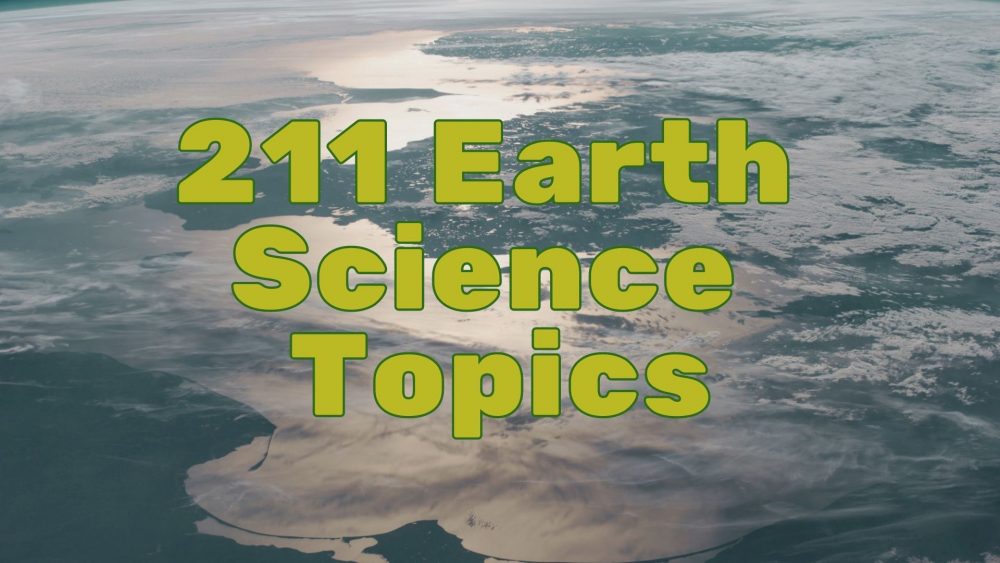
Leave a Reply Cancel reply
Your email address will not be published. Required fields are marked *
Comment * Error message
Name * Error message
Email * Error message
Save my name, email, and website in this browser for the next time I comment.
As Putin continues killing civilians, bombing kindergartens, and threatening WWIII, Ukraine fights for the world's peaceful future.
Ukraine Live Updates
232 Chemistry Research Topics To Make Your Neurochemicals Dance

Speaking from experience, science can be fun. The only thing that matters is that you should always choose the theme/field that fascinates you the most. Chemistry, if done right, can give you more dopamine rush than riding a racing bike. The trick is to choose a chemistry research paper topic that moves your quarks when you’re writing about it.
Table of Contents
Chemistry Research Topics: Biochemistry, Chemical, Organic, and more
Our chemistry research writers are not regular researchers but people who actually study and love chemistry. They have spent a lot of time unearthing some of the cool topics that could pump any chemistry geeks with an adrenaline rush. They have years of experience offering chemistry research paper writing services, so you can trust their work. (Many people around the world already do and you can find that in testimonials on our PhD Research Paper Writing Services page.)
Physical chemistry research topics
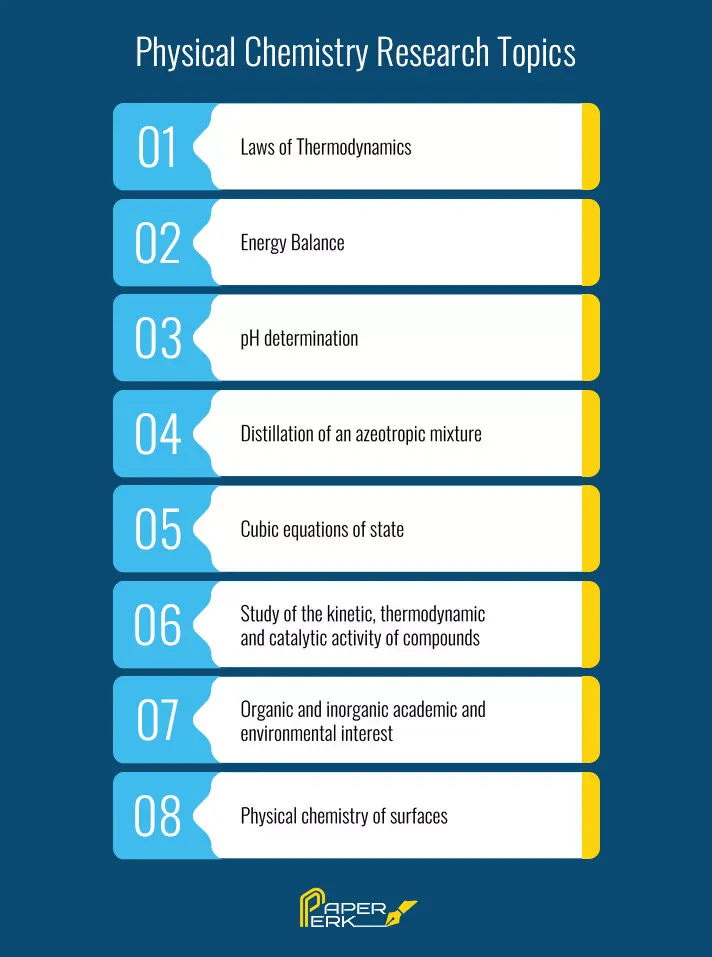
- Laws of Thermodynamics
- Energy Balance
- Gases: Gas Law
- harles and Gay Lussac’s law
- General Ideal Gas Law
- The mass of a chemical compound
- The moles of an atomic species
- The flow of Fluids in Closed Ducts
- Impact of gravity on the fluids
- Strength effect of elasticity of fluid actions
- Surface tension in fluids
- Statistical Analysis Of Thermodynamic Properties
- Determination of the ideal gas constant
- pH determination
- Distillation of an azeotropic mixture
- Cubic equations of state
- Redox titrations
- Ideal solutions (liquids)
- Laboratory on the States of Matter
- Laboratory on the construction of an atom
- Research on molecular geometry
- Research on the density of bodies
- Kinetic studies of pyrolysis, combustion and gasification of various materials (organic and inorganic)
- Physicochemical Processes of Interaction of Metals with Biomaterials
- Photochemistry of Compounds of Environmental Interest
- Study of the kinetic, thermodynamic and catalytic activity of compounds
- Organic and inorganic academic and environmental interest
- Determination of heat of combustion of acetamidophenols
- Experimental determination of thermochemical properties of chemical compounds
- Experimental evaluation of thermal properties of dangerous organic liquids
- Synthesis and characterization of hydrogels based on acrylic acid
- Incorporation of salts and other chemical substances in acrylic acid/acrylamide hydrogels
- Physical chemistry of polymers and macromolecules
- Pharmaceutical physical chemistry
- Physical chemistry and material sciences
- Biomimetic chemistry
- Petrochemical and related sciences
- Physical chemistry of semiconductors
- Physical chemistry of extractive processes
- Physical chemistry of surfaces
We bet these chemistry essay topics have blown you away. Don’t worry we have more useful topics coming your way.
Read More: Accounting Research Topics
Electrochemistry research topics
Below are some of the best topics for research paper about chemistry and its affiliate subjects. Check them out:
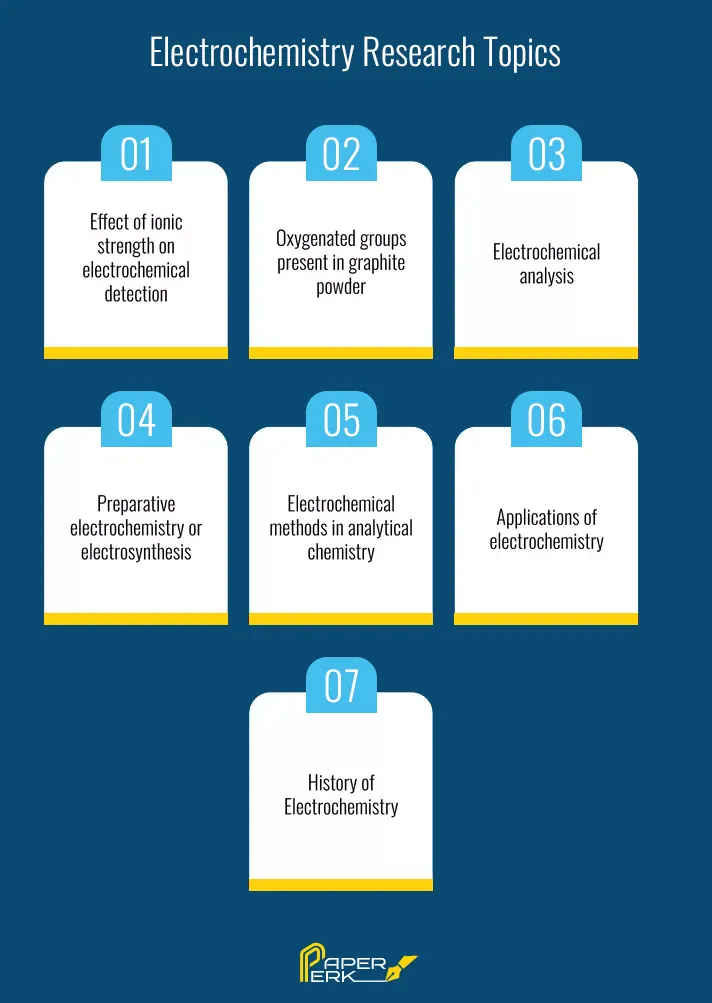
- Calibration of carbon paste electrodes modified with iron particles
- Effect of ionic strength on electrochemical detection
- Oxygenated groups present in graphite powder
- Electrochemical analysis
- Potentiometric titrations of functional groups
- Physical and chemical characterization of the modified and unmodified material
- Electrochemical recovery of toxic metals
- Carbon paste electrodes
- Biological and bioelectrochemical reactors with an optimization approach based on computational methods
- Electrogeneration of oxidizing species
- Electroremediation of contaminated water and water soils
- Electrochemistry: Importance in Robotics and Nanotechnology
- Electrochemistry in Ecology and Environmental Processes
- How electrochemistry plays an important role in energy generation
- Photovoltaic cells and hybrid energy systems
- Nanostructured materials for fuel cells
- Solar Systems and Electrochemistry
- Biomolecular interactions and electroanalysis
- Chemical and electrochemical methods in disease diagnosis
- Synthesis and Electrochemical Properties of Hexacyanoferrate-Doped Polypyrrole
- Energy Storage in Hybrid Organic-Inorganic Materials
- Conducting Organic Polymers with Electroactive Dopants
- Electrochemistry for bioprocess engineering applications
- Electrochemical enhancement of microbial product formation
- Electron transfer of electrode-bound enzymes
- Transport mechanism and interfacial reactions within the oxide layer
- Oxide layer modelling
- Preparative electrochemistry or electrosynthesis
- Electrochemical methods in analytical chemistry
- Electrochemical synthesis methods
- Fuel cell technology in Technical Chemistry
- Electrochemical reactions
- Phase boundary electrode-electrolyte
- Phase boundary between an electronic conductor (electrode) and an ionic conductor (electrolyte)
- Applications of electrochemistry
- Reduction of metal salts for the production of base metals, mainly by electrolysis
- Use of electrolytic metal deposition in electroplating
- Provision of an electrical voltage, especially for mobile applications
- History of Electrochemistry
We know your chemistry research projects are incomplete without these eyecatching topics. Read them and wisely write on these subject to amaze your professor.
Read More: Business Research Topics
Organic Chemistry research topics
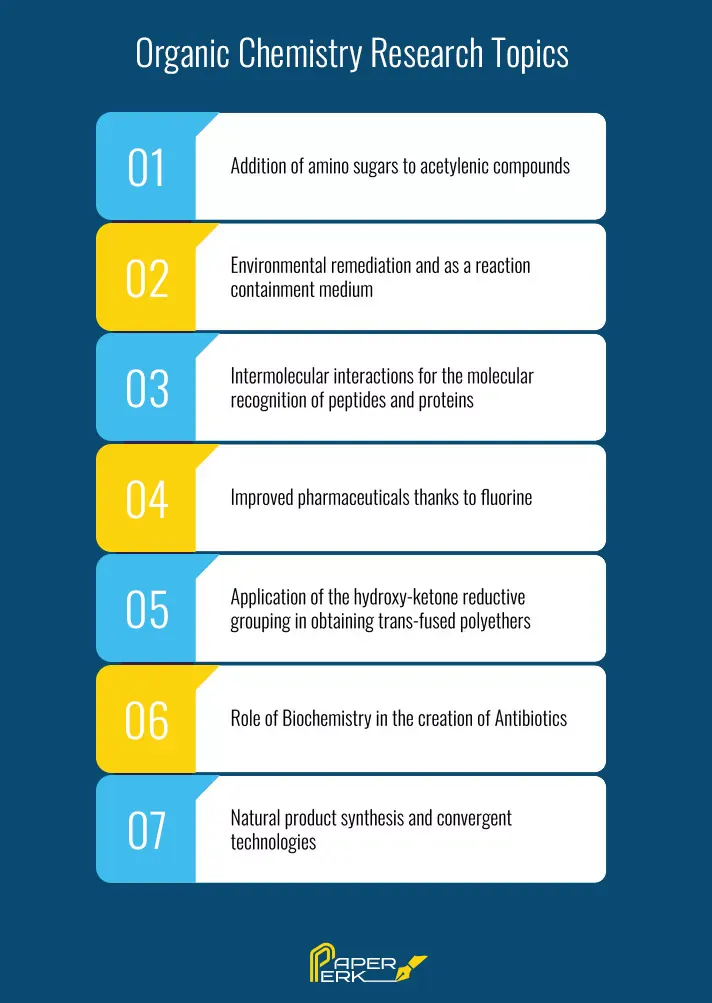
- A novel process for the production of sophisticated molecules
- Addition of amino sugars to acetylenic compounds
- Environmental remediation and as a reaction containment medium
- Intermolecular interactions for the molecular recognition of peptides and proteins
- Synthesis of glycosylamines from disaccharides and lipooligosaccharides
- Catalysis with metal and organocatalysts, photocatalysis, natural product synthesis, unnatural amino acids and peptide foldamers
- Development and modification of gels based on polymers for use in drug delivery
- Reusable catalyst makes oxidation of CH bonds with oxygen easier and more efficient
- Structural analysis of nodulation factors produced by bacteria of the genus Rhizobium
- Imidazopyridines as new materials
- Effects of Ultra-Violet Light on Activation of Oxygen
- Synthesis of large unsymmetrical imines by a palladium-catalyzed cross-coupling reaction
- Improved pharmaceuticals thanks to fluorine
- Application of the hydroxy-ketone reductive grouping in obtaining trans-fused polyethers
- Role of Biochemistry in the creation of Antibiotics
- Application of the olefin metathesis (RCM) reaction in the synthesis of Orthocondensated polyoxepanes
- Sugars in green olives
- Synthetic applications of d-glucose derivatives
- Synthesis, structure, coordination and applications in asymmetric catalysis
- Natural product synthesis and convergent technologies
- Activation of growth factors for fibroblasts by glycosaminoglycans effect
- Thiols, preparation and handling
- Biotransformations of industrial interest catalyzed by fungal peroxygenases
- Carbohydrate multivalent systems functionalize proteins and surfaces
- Fused n-heterocyclic carbenes in biaryl systems
- Hair structure
- Biochemistry for bioremediation
- Chemical and structural characterization of lignin and lipids of lignocellulosic materials of industrial interest
- Physicochemical characterization of citronella, soapstone, and eucalyptus essential oil
- Electrophilic Substitution Reactions: Synthesis of Nitrobenzene
- Essential oils: uses and properties
- Activation of growth factors for fibroblasts by glycosaminoglycans
Read More: Finance Research Topics
Inorganic Chemistry research topics
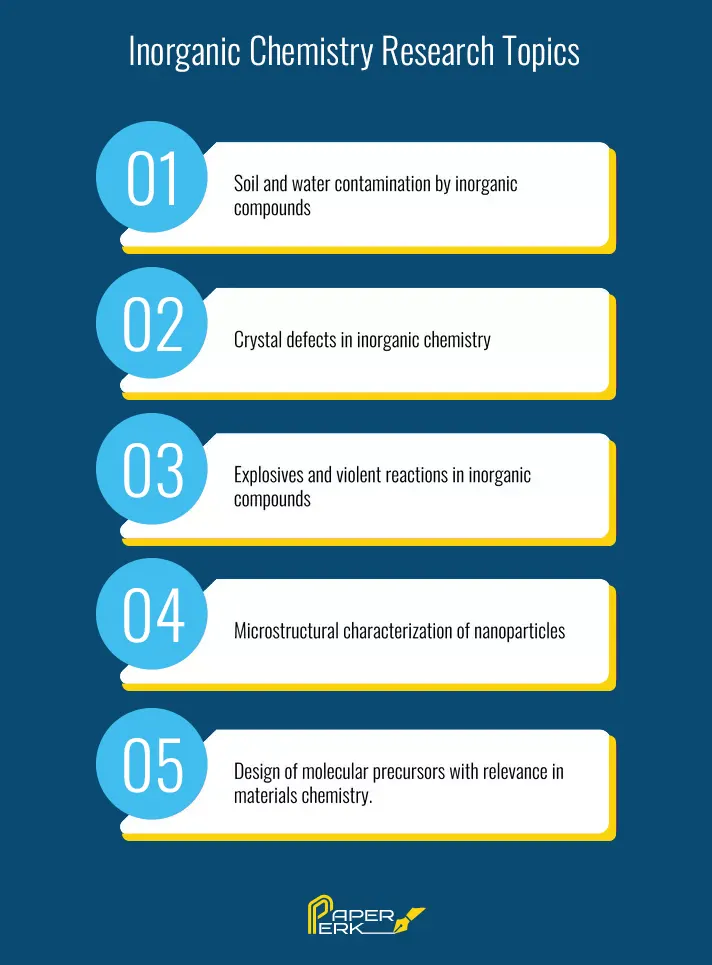
- Soil and water contamination by inorganic compounds
- Synthesis and characterization of Coordination Compounds and their use as homogeneous catalysts
- Free Radicals and Antioxidants
- Analytical Chemistry associated with the study of inorganic compounds
- Quantum molecular modeling and mechanics
- Inorganic Materials
- Hydrogen reactivity with inorganic compounds
- Bond theory analysis
- Chemistry of some transition elements
- Boric Acid Preparation
- Types of inorganic chemical reactions
- Introduction to inorganic chemistry
- Study of the atomic spectrum
- Crystal defects in inorganic chemistry
- Explosives and violent reactions in inorganic compounds
- Objective characterization of wines through aroma components
- Microstructural characterization of nanoparticles and magnetic “nano-composites” of iron
- Chemical, morphological, mineralogical, and genesis characters of the salt mines
- Physical and chemical characteristics of the soils occupied by olive groves
- Theoretical analysis and development of instrumentation to apply the new technique of thermal analysis at a constant rate of reaction
- Alteration of rocks and soil formation in Utah
- The catalytic activity of 4f metal oxides in the decomposition of various carboxylic acids and alcohols
- Activation of ethylene and carbon dioxide by molybdenum complexes
- Platinum promoting action on nickel catalysts supported on activated Bentonite
- Homogeneous catalysis (with an organometallic, transition metal, lanthanide and representative compounds)
- Methods of synthesis of organometallic compounds assisted by microwaves.
- Design of molecular precursors with relevance in materials chemistry.
- Chemistry of inorganic heterocycles.
- Immobilization of organometallic and coordination compounds in polypropylene membranes.
Read More: High School Research Topics
Biochemistry research topics
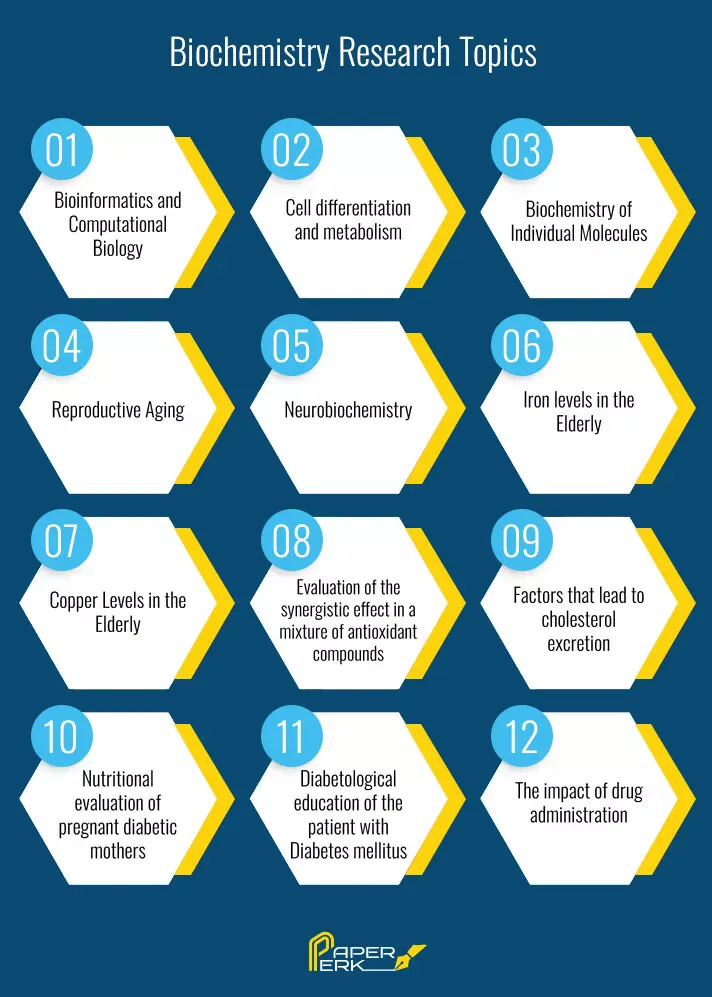
- Bioinformatics and Computational Biology
- Cell differentiation and metabolism
- Biochemistry of Individual Molecules
- Enterobacteriaceae envelopes: modulation of their structure in response to environmental cues and impact on pathogenicity
- Neuroplasticidad y Neurogenética
- Environmental biotechnology applied to water decontamination.
- Reproductive Aging
- Neurobiochemistry
- Regulatory proteins of iron metabolism
- Iron deficiency anaemia and cardiovascular disease
- Iron deficiency anaemia and oxidative stress
- Nutritional anaemias independent workers
- Food incompatibilities for iron absorption
- Evaluation of anaemia and iron deficiency in schoolchildren
- Iron deficiency anaemia and evaluation of school performance
- Iron deficiency anaemia in students of Educational Centers
- Copper Levels and Oxidative Stress in the Elderly
- Iron Levels and Oxidative Stress in the Elderly
- Evaluation of transcription factors (surgical samples)
- Biochemical markers in oxidative stress
- Antioxidant activity in irradiated food products
- Kinetics of the reactivity of antioxidants in food
- Evaluation of oxidative stress in various pathological states
- Iron levels in the Elderly
- Copper Levels in the Elderly
- Evaluation of the synergistic effect in a mixture of antioxidant compounds
- Antioxidant activity in medicinal plants
- Food patterns and evaluation of antioxidant capacity in food
- Markers in Diabetes mellitus and cardiovascular disease
- Biochemical markers in Diabetes mellitus
- Chemotherapy with redesigned Methotrexate
- The Biosynthesis of triglycerides or triacylglycerides
- Consequences of suffering from coronary disease
- What medications should be administered in patients with osteoporosis?
- Appearances of physiological alterations in older adults
- The impact of the administration of clindamycin, amikacin, and ceftazidime in hospitalized patients
- Pharmaceutical advice to reduce stress
- Dyslipidemia in Diabetes mellitus
- Diabetes mellitus and transcription factors (Cell culture)
- Factors that lead to cholesterol excretion
- Nutritional evaluation of pregnant diabetic mothers
- How do blood alcohol levels influence drivers involved in traffic accidents?
- Pleiotropic effects of oral hypoglycemic drugs
- Importance of eating foods rich in carotenoids
- The biochemical and toxicological impact of lead with environmental contact
- The importance of emotions in the intervention of our digestive system
- Lifestyles and Diabetes mellitus
- Adiposity in Diabetes mellitus
- Diabetological education of the patient with Diabetes mellitus
- The impact of drug administration
Read More: Nursing Research Topics
Nano / Nuclear Chemistry research topics
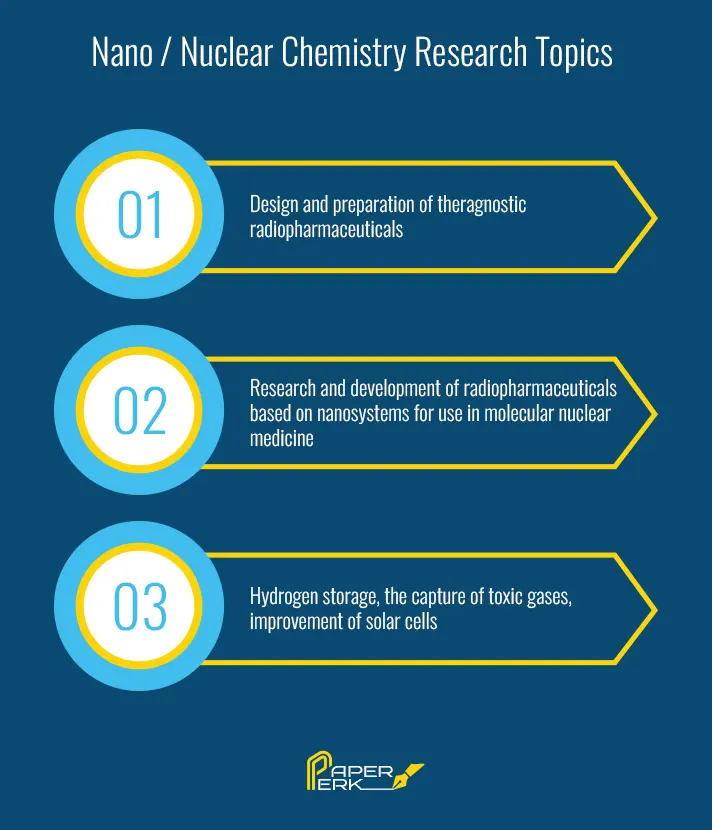
- Modeling of metallic nanostructures
- Modeling of nanostructures supported on oxides
- Development of advanced nanomaterials with specific
- Nanomaterials in the fight against cancer and spinal cord injuries in laboratory rats for neuronal reconnection
- Study of the effects of radiation on the structure and properties of nanomaterials
- Development of nanostructured substrates for Raman spectroscopy applications
- Implants in neural tissues of the spinal cord to promote lost communication between the brain and the rest of the body
- Design and preparation of theragnostic radiopharmaceuticals
- Research and development of radiopharmaceuticals based on nanosystems for use in molecular nuclear medicine
- Hydrogen storage, the capture of toxic gases, improvement of solar cells
- Geometric optimization of nanostructures using classical methods
- Calculation of energies and molecular properties
- Synthesis of supercapacitors with carbon nanotubes
- Simulation of high-resolution transmission electron microscopy images of nanostructures
- Development of bactericidal dressings based on metallic nanoparticles
- Modernization of the ININ X-Ray Diffraction Laboratory
- Thin coatings of transparent materials with high hardness
Read More: Psychology Research Paper Topics
Green Chemistry research topics
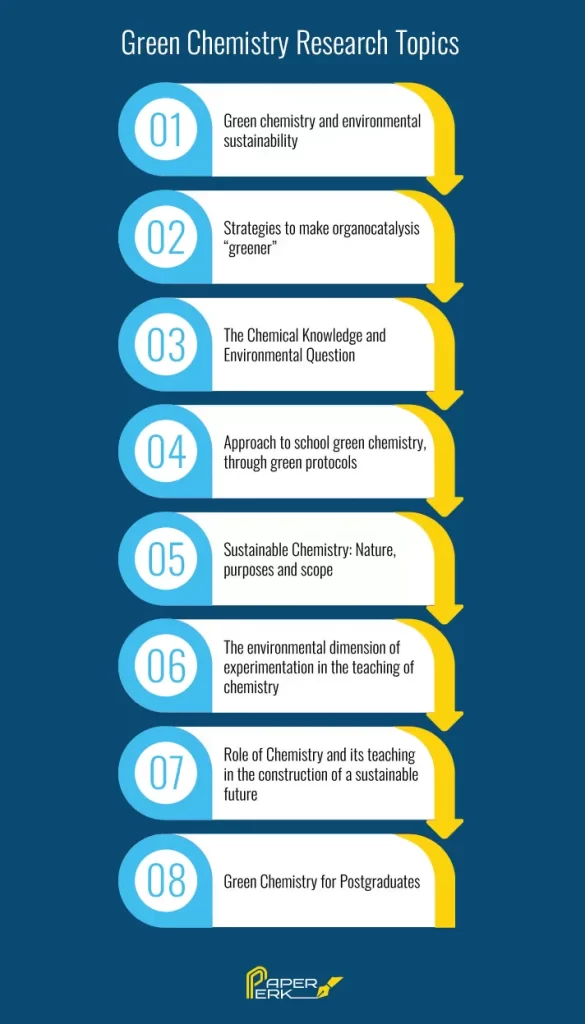
- Green chemistry and environmental sustainability
- Strategies to make organocatalysis “greener”
- The Chemical Knowledge and Environmental Question
- Approach to school green chemistry, through green protocols
- Sustainable Chemistry: Nature, purposes, and scope
- Postgraduate studies in sustainable chemistry
- Didactic knowledge of the content on green chemistry
- Photochemical synthesis by sunlight
- Green Chemistry: A Present and Future Theme for Chemistry Education
- The environmental dimension of experimentation in the teaching of chemistry
- Role of Chemistry and its teaching in the construction of a sustainable future
- A foundation for the incorporation of green chemistry in organic chemistry curricula
- Contribution of green chemistry to the construction of a socially responsible science
- Aspects of the pedagogical knowledge of the content of green chemistry in university professors of chemistry
- Asymmetric organocatalyzed reactions in the absence of a solvent
- Green Chemistry for Postgraduates
Read More: Social Work Research Topics
Archaeological Chemistry research topics
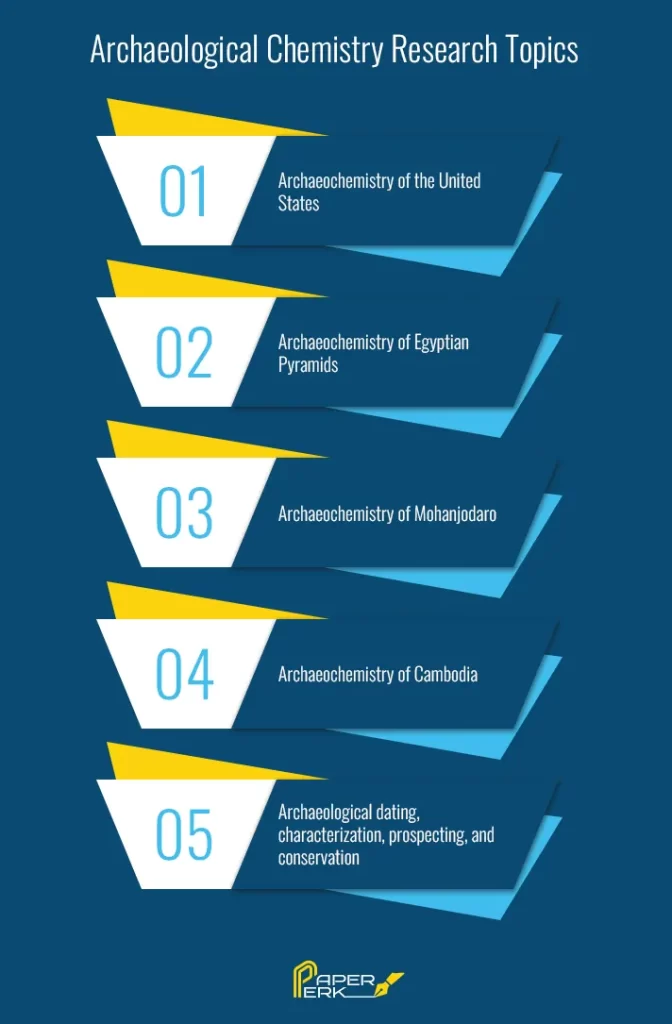
- Archaeochemistry of the United States
- Archaeochemistry of Egyptian Pyramids
- Archaeochemistry of Mohanjodaro
- Archaeochemistry of Cambodia
- Archaeological dating, characterization, prospecting, and conservation
- The role of bio-deteriorated ceramics in the formation processes of archaeological sites
- Study of biodeterioration in archaeological ceramics from Mayan Ruins
- Deterioration of ceramic fragments due to the action of lichens
- Applicability of preventive conservation to archaeological ceramics impacted by biodeterioration
Our highly skilled professionals have provided you with superb research topics in chemistry. You can choose anyone matching your speciality and start working on making your paper a piece of art.
Conclusion:
Never believe anyone who says you can’t go for a chemistry degree or PhD. Just listen to your heart and it will all make sense. Chemistry is one of the coolest subjects. If you do it right, with a chemistry research topic that inspires you, then no one can stop you from having your chemical breakthrough. Believe in yourself and the world will see your success like a mushroom cloud.
If you still have any confusion, or can’t find time to write a perfect chemistry paper, you can ping us through our contact page and get expert chemistry writing opinions from our writers . If you just want to get on with it and seek our services, you can place your order now .
Order Original Papers & Essays
Your First Custom Paper Sample is on Us!
Timely Deliveries
No Plagiarism & AI
100% Refund
Try Our Free Paper Writing Service
Related blogs.

Connections with Writers and support
Privacy and Confidentiality Guarantee
Average Quality Score
Chemistry Essay Examples and Topics
Aldol synthesis of dibenzalacetone.
- Words: 1136
The Synthesis of Aspirin and Determination of Product Purity
- Words: 1650
Solubility of Potassium Nitrate
- Words: 1140
Potassium Iodide and Iron (III) Chloride Chemical Reaction
- Words: 1683
Acids, Bases and Buffers in Real-Life Applications
Methyl salicylate preparation using esterification.
- Words: 2059
Hydrated Copper (II) Sulphate Experiment
- Words: 1066
Primary Salt Effect in Kinetic of Ionic Reactions
- Words: 1114
Activation Energy of the Oxalic Acid/Potassium Permanganate Solution
Plastic impact on humans and planet.
- Words: 1079
Bomb Calorimetry: Theory and Experiment
- Words: 1595
Quantitative Analysis of Aspirin Tablets by Spectrophotometry
Concentration as a factor affecting the rate of chemical reactions, chemistry application in daily life.
- Words: 1435
Functional Group Identification
- Words: 1390
Nanofabrication. Bottom-Up vs. Top-Down Method
Chemistry: expansion processes of a perfect gas, spectrophotometric determination of the pka of an acid-base indicator.
- Words: 1592
Production of Acetone from isopropyl alcohol
- Words: 2271
Pinacol Rearrangement Laboratory Experiment
- Words: 3066
KHT Molar Solubility Experiment
- Words: 1322
The Solubility of Potassium Nitrate
- Words: 1738
Buffer Solution and Determination Changes in pH
The rate and order of a chemical reaction, rate law for iodine-acetone reaction, methamphetamine (meth), organic chemistry: combinatorial synthesis of azo dyes, oxidation states of manganese ion, interrelationship of metabolic pathways.
- Words: 1417
Thin Layer Chromatography
- Words: 1218
Retinol: Physical and Chemical Properties, Sources, Benefits, and Adverse Effects
The effect of ph on water holding capacity of chicken, preparation and recrystallization of acetanilide, liquid crystals: fundamental properties, and the effects of external factors.
- Words: 2803
Chemical Laser: Definition, Environment, Process, and Types
- Words: 2769
Synthesis of 4, 4’ -di(t-butyl)biphenyl by the Friedel-Crafts reaction
- Words: 2286
The Experiment on Substitution Reactions of Alcohols
Food dye and bleach reaction experiment.
- Words: 1353
Methyl Salicylate: Carboxylic Acids and Esters
- Words: 2741
P-Nitroacetanilide: Measurements and Calculations
Determination of quinine in tonic water with fluorescence spectroscopy.
- Words: 1400
Organic Chemistry – Contributions and in Life
Effect of ph on protein solubility, hydrolysis of tert-butyl chloride: kinetics lab, micro method determination of boiling point of hydrocarbons, determination of the molecular weight and pka for an unknown weak acid by titration.
- Words: 1497
Potassium Chloride, Magnesium Sulphate and Glucose Effects
- Words: 1841
Materials Used for Ethanol Production
- Words: 2849
Extraction of Sucrose, Acetylsalicylic Acid, and Acetanilide From Phensuprin
- Words: 2894
Titration of a Strong and Weak Acid
- Words: 1233
The Heat of Dissolution and Neutralization Reaction
- Words: 1152
Formula of a Complex With the Slope-Ratio Method
Fractional distillation lab report, hair care products: components and effects.
- Words: 1383
Amperometry: Chemical Analysis
- Words: 3681
Using Solar (PV) Energy to Generate Hydrogen Gas for Fuel Cells
Carboxylic acids and esters: preparation of methyl salicylate.
- Words: 2859
Diffusion in Polymer Solutions
- Words: 5561
UV & VIS Spectroscopy Experiment
The effect of acid on enzyme activity, types of saturation indices: calcium carbonate.
- Words: 1698
Analysis of Lab: Heat of Fusion of Water
Effect of potassium chloride concentration on the rate of mung seed germination.
- Words: 1395
The Ideal Gas Law in a Practical Experiment
Organic compounds at home and at the workplace, electrochemical methods of analysis, seawater vs. brackish water reverse osmosis, chromatography in the determination of amino acids, contribution of amedeo avogadro to chemistry, long residue processing in oil refineries.
- Words: 1096
Conversion of Tyrosine to Serotonin, Dopamine, and Norepinephrine
Determination of the enthalpy of an acid-base reaction, the pinacol rearrangement organic reaction.
- Words: 1660
Cooper and Silver: Physical and Chemical Properties
- Words: 1976
Iron: Properties, Occurrence, and Uses
The scope of use of chromatography, alkanes and alkenes: structure and reactions.
- Words: 1697
Aspects of Chemistry of Oxygen
Aqueous solution definition in chemistry.
- Words: 1760
Acid Extraction by Acid-Base-Coupled Extractants
- Words: 3105
Acetone: Physical and Chemical Properties
- Words: 2200
Sugar Results: Experiment on Chocolate
Application of catalyst and energy production.
- Words: 8961
Sodium Chloride – Science of Salt
Chemical raising agent in bread in lab experiment.
- Words: 1703
Chemical and Physical Properties of Ethane
Massive leak of liquified chlorine gas.
- Words: 2169
Pinacol Rearrangement Experiment
- Words: 1230
Green Chemistry for Consumer Products
- Words: 2195
Chemical Processes: The Diels-Alder Reaction
Intrinsic viscosity: chain linkage in polyvinyl alcohol, percent composition of calcium in salt: gravimetric analysis.
- Words: 1126
Stoichiometry and Process Calculations
Recent chemistry developments and their influence on society, substitution reactions of alcohols: practical experimentation.
- Words: 2290
Biochemical Metabolism: Foreign DNA Molecule
- Words: 1272
Benadryl: Structure, Properties, Interesting Facts
Nucleophilic substitution reactions of alcohols.
- Words: 2137
The Production of Aluminum
- Words: 1101
Oxidation-Reduction (Redox) Reactions
- Words: 1201
The Chemistry Behind Mineral Make-Up
- Words: 1398
Aqueous HCl Solution Preparation
Research of amorphous solids in world.
- Words: 2570
Indirect Definition of the Unit of a Penny Weight
Nylons: production, characteristics and applications.
- Words: 4161
Polypropylene Concept in Chemistry
- Words: 5166
Lubricating Oil Extraction Methods
- Words: 2147
Eggs: The Osmosis Process Investigation
Water properties as a solvent: an experiment lab, the physical and chemical properties of water, mixtures and compounds in chemistry.
- Words: 1284
Identifying a Weak Acid by Titrimetry
The solventless reaction: the aldol reaction condensation, biogeochemical cycle: nitrogen, acid effects on starch gels in food preparation, the pinacol rearrangement as a dehydration process.
- Words: 1575
Lubricants Oil Production in Refineries
- Words: 2245
Gold’s Production and Processing
- Words: 1634
Mechanism of Formation of Benzoic Acid
Texas safety standards in the science classroom.
- Privacy Policy

Home » 300+ Chemistry Research Topics
300+ Chemistry Research Topics
Table of Contents

Chemistry is a fascinating and complex field that explores the composition, properties, and behavior of matter at the molecular and atomic level. As a result, there are numerous chemistry research topics that can be explored, ranging from the development of new materials and drugs to the study of natural compounds and the environment. In this rapidly evolving field, researchers are constantly uncovering new insights and pushing the boundaries of our understanding of chemistry. Whether you are a student, a professional researcher, or simply curious about the world around you, there is always something new to discover in the field of chemistry. In this post, we will explore some of the exciting and important research topics in chemistry today.
Chemistry Research Topics
Chemistry Research Topics are as follows:
Organic Chemistry Research Topics
Organic Chemistry Research Topics are as follows:
- Development of novel synthetic routes for the production of biologically active natural products
- Investigation of reaction mechanisms and kinetics for organic transformations
- Design and synthesis of new catalysts for asymmetric organic reactions
- Synthesis and characterization of chiral compounds for pharmaceutical applications
- Development of sustainable methods for the synthesis of organic molecules using renewable resources
- Discovery of new reaction pathways for the conversion of biomass into high-value chemicals
- Study of molecular recognition and host-guest interactions for drug design
- Design and synthesis of new materials for energy storage and conversion
- Development of efficient and selective methods for C-H functionalization reactions
- Exploration of the reactivity of reactive intermediates such as radicals and carbenes
- Study of supramolecular chemistry and self-assembly of organic molecules
- Development of new methods for the synthesis of heterocyclic compounds
- Investigation of the biological activities and mechanisms of action of natural products
- Synthesis of polymeric materials with controlled architecture and functionality
- Development of new synthetic methodologies for the preparation of bioconjugates
- Investigation of the mechanisms of enzyme catalysis and the design of enzyme inhibitors
- Synthesis and characterization of novel fluorescent probes for biological imaging
- Development of new synthetic strategies for the preparation of carbohydrates and glycoconjugates
- Study of the properties and reactivity of carbon nanomaterials
- Design and synthesis of novel drugs for the treatment of diseases such as cancer, diabetes, and Alzheimer’s disease.
Inorganic Chemistry Research Topics
Inorganic Chemistry Research Topics are as follows:
- Synthesis and characterization of new metal-organic frameworks (MOFs) for gas storage and separation applications
- Development of new catalysts for sustainable chemical synthesis reactions
- Investigation of the electronic and magnetic properties of transition metal complexes for spintronics applications
- Synthesis and characterization of novel nanomaterials for energy storage applications
- Development of new ligands for metal coordination complexes with potential medical applications
- Investigation of the mechanism of metal-catalyzed reactions using advanced spectroscopic techniques
- Synthesis and characterization of new inorganic materials for photocatalytic water splitting
- Development of new materials for electrochemical carbon dioxide reduction reactions
- Investigation of the properties of transition metal oxides for energy storage and conversion applications
- Synthesis and characterization of new metal chalcogenides for optoelectronic applications
- Development of new methods for the preparation of inorganic nanoparticles with controlled size and shape
- Investigation of the reactivity and catalytic properties of metal clusters
- Synthesis and characterization of new metal-organic polyhedra (MOPs) for gas storage and separation applications
- Development of new methods for the synthesis of metal nanoparticles using environmentally friendly reducing agents
- Investigation of the properties of metal-organic frameworks for gas sensing applications
- Synthesis and characterization of new coordination polymers with potential magnetic and electronic properties
- Development of new materials for electrocatalytic water oxidation reactions
- Investigation of the properties of metal-organic frameworks for carbon capture and storage applications
- Synthesis and characterization of new metal-containing polymers with potential applications in electronics and energy storage
- Development of new methods for the synthesis of metal-organic frameworks using green solvents and renewable resources.
Physical Chemistry Research Topics
Physical Chemistry Research Topics are as follows:
- Investigation of the properties and interactions of ionic liquids in aqueous and non-aqueous solutions.
- Development of advanced analytical techniques for the study of protein structure and dynamics.
- Investigation of the thermodynamic properties of supercritical fluids for use in industrial applications.
- Development of novel nanomaterials for energy storage applications.
- Studies of the surface chemistry of catalysts for the optimization of their performance in chemical reactions.
- Development of new methods for the synthesis of complex organic molecules with improved yields and selectivity.
- Investigation of the molecular mechanisms involved in the catalysis of biochemical reactions.
- Development of new strategies for the controlled release of drugs and other bioactive molecules.
- Studies of the interaction of nanoparticles with biological systems for biomedical applications.
- Investigation of the thermodynamic properties of materials under extreme conditions of temperature and pressure.
- Development of new methods for the characterization of materials at the nanoscale.
- Investigation of the electronic and magnetic properties of materials for use in spintronics.
- Development of new materials for energy conversion and storage.
- Studies of the kinetics and thermodynamics of adsorption processes on surfaces.
- Investigation of the transport properties of ionic liquids for use in energy storage and conversion devices.
- Development of new materials for the capture and sequestration of greenhouse gases.
- Studies of the structure and properties of biomolecules for use in drug design and development.
- Investigation of the dynamics of chemical reactions in solution using time-resolved spectroscopic techniques.
- Development of new approaches for the synthesis of metallic and semiconductor nanoparticles with controlled size and shape.
- Studies of the structure and properties of materials for use in electrochemical energy storage devices.
Analytical Chemistry Research Topics
Analytical Chemistry Research Topics are as follows:
- Development and optimization of analytical techniques for the quantification of trace elements in food and environmental samples.
- Design and synthesis of novel analytical probes for the detection of biomolecules in complex matrices.
- Investigation of the fundamental mechanisms involved in the separation and detection of complex mixtures using chromatographic techniques.
- Development of sensors and biosensors for the detection of chemical and biological species in real-time.
- Investigation of the chemical and structural properties of nanomaterials and their applications in analytical chemistry.
- Development and validation of analytical methods for the quantification of contaminants and pollutants in water, air, and soil.
- Investigation of the molecular mechanisms underlying drug metabolism and toxicity using mass spectrometry.
- Development of analytical tools for the identification and quantification of drugs of abuse in biological matrices.
- Investigation of the chemical composition and properties of natural products and their applications in medicine and food science.
- Development of advanced analytical techniques for the characterization of proteins and peptides.
- Investigation of the chemistry and mechanism of action of antioxidants in foods and their impact on human health.
- Development of analytical methods for the detection and quantification of microorganisms in food and environmental samples.
- Investigation of the molecular mechanisms involved in the biosynthesis and degradation of important biomolecules such as proteins, carbohydrates, and lipids.
- Development of analytical methods for the detection and quantification of environmental toxins and their impact on human health.
- Investigation of the structure and properties of biological membranes and their role in drug delivery and disease.
- Development of analytical techniques for the characterization of complex mixtures such as petroleum and crude oil.
- Investigation of the chemistry and mechanism of action of natural and synthetic dyes.
- Development of analytical techniques for the detection and quantification of pharmaceuticals and personal care products in water and wastewater.
- Investigation of the chemical composition and properties of biopolymers and their applications in biomedicine and biomaterials.
- Development of analytical methods for the identification and quantification of essential nutrients and vitamins in food and dietary supplements.
Biochemistry Research Topics
Biochemistry Research Topics are as follows:
- The role of enzymes in metabolic pathways
- The biochemistry of DNA replication and repair
- Protein folding and misfolding diseases
- Lipid metabolism and the pathogenesis of atherosclerosis
- The role of vitamins and minerals in human metabolism
- Biochemistry of cancer and the development of targeted therapies
- The biochemistry of signal transduction pathways and their regulation
- The mechanisms of antibiotic resistance in bacteria
- The biochemistry of neurotransmitters and their roles in behavior and disease
- The role of oxidative stress in aging and age-related diseases
- The biochemistry of microbial fermentation and its applications in industry
- The biochemistry of the immune system and its response to pathogens
- The biochemistry of plant metabolism and its regulation
- The molecular basis of genetic diseases and gene therapy
- The biochemistry of membrane transport and its role in cell function
- The biochemistry of muscle contraction and its regulation
- The role of lipids in membrane structure and function
- The biochemistry of photosynthesis and its regulation
- The biochemistry of RNA splicing and alternative splicing events
- The biochemistry of epigenetics and its regulation in gene expression.
Environmental Chemistry Research Topics
Environmental Chemistry Research Topics are as follows:
- Investigating the effects of microplastics on aquatic ecosystems and their potential impact on human health.
- Examining the impact of climate change on soil quality and nutrient availability in agricultural systems.
- Developing methods to improve the removal of heavy metals from contaminated soils and waterways.
- Assessing the effectiveness of natural and synthetic antioxidants in mitigating the effects of air pollution on human health.
- Investigating the potential for using algae and other microorganisms to sequester carbon dioxide from the atmosphere.
- Studying the role of biodegradable plastics in reducing plastic waste and their impact on the environment.
- Examining the impact of pesticides and other agricultural chemicals on water quality and the health of aquatic organisms.
- Investigating the effects of ocean acidification on marine organisms and ecosystems.
- Developing new materials and technologies to reduce carbon emissions from industrial processes.
- Evaluating the effectiveness of phytoremediation in cleaning up contaminated soils and waterways.
- Studying the impact of microplastics on terrestrial ecosystems and their potential to enter the food chain.
- Developing sustainable methods for managing and recycling electronic waste.
- Investigating the role of natural processes, such as weathering and erosion, in regulating atmospheric carbon dioxide levels.
- Assessing the impact of urbanization on air quality and developing strategies to mitigate pollution in cities.
- Examining the effects of climate change on the distribution and abundance of species in different ecosystems.
- Investigating the impact of ocean currents on the distribution of pollutants and other environmental contaminants.
- Developing new materials and technologies for renewable energy generation and storage.
- Studying the effects of deforestation on soil quality, water availability, and biodiversity.
- Assessing the potential for using waste materials, such as agricultural residues and municipal solid waste, as sources of renewable energy.
- Investigating the role of natural and synthetic chemicals in regulating ecosystem functions, such as nutrient cycling and carbon sequestration.
Polymer Chemistry Research Topics
Polymer Chemistry Research Topics are as follows:
- Development of new monomers for high-performance polymers
- Synthesis and characterization of biodegradable polymers for sustainable packaging
- Design of stimuli-responsive polymers for drug delivery applications
- Investigation of the properties and applications of conductive polymers
- Development of new catalysts for controlled/living polymerization
- Synthesis of polymers with tailored mechanical properties
- Characterization of the structure-property relationship in polymer nanocomposites
- Study of the impact of polymer architecture on material properties
- Design and synthesis of new polymeric materials for energy storage
- Development of high-throughput methods for polymer synthesis and characterization
- Exploration of new strategies for polymer recycling and upcycling
- Synthesis and characterization of responsive polymer networks for smart textiles
- Design of advanced polymer coatings with self-healing properties
- Investigation of the impact of processing conditions on the morphology and properties of polymer materials
- Study of the interactions between polymers and biological systems
- Development of biocompatible polymers for tissue engineering applications
- Synthesis and characterization of block copolymers for advanced membrane applications
- Exploration of the potential of polymer-based sensors and actuators
- Design of novel polymer electrolytes for advanced batteries and fuel cells
- Study of the behavior of polymers under extreme conditions, such as high pressure or temperature.
Materials Chemistry Research Topics
Materials Chemistry Research Topics are as follows:
- Development of new advanced materials for energy storage and conversion
- Synthesis and characterization of nanomaterials for environmental remediation
- Design and fabrication of stimuli-responsive materials for drug delivery
- Investigation of electrocatalytic materials for fuel cells and electrolysis
- Fabrication of flexible and stretchable electronic materials for wearable devices
- Development of novel materials for high-performance electronic devices
- Exploration of organic-inorganic hybrid materials for optoelectronic applications
- Study of corrosion-resistant coatings for metallic materials
- Investigation of biomaterials for tissue engineering and regenerative medicine
- Synthesis and characterization of metal-organic frameworks for gas storage and separation
- Design and fabrication of new materials for water purification
- Investigation of carbon-based materials for supercapacitors and batteries
- Synthesis and characterization of self-healing materials for structural applications
- Development of new materials for catalysis and chemical reactions
- Exploration of magnetic materials for spintronic devices
- Investigation of thermoelectric materials for energy conversion
- Study of 2D materials for electronic and optoelectronic applications
- Development of sustainable and eco-friendly materials for packaging
- Fabrication of advanced materials for sensors and actuators
- Investigation of materials for high-temperature applications such as aerospace and nuclear industries.
Nuclear Chemistry Research Topics
Nuclear Chemistry Research Topics are as follows:
- Nuclear fission and fusion reactions
- Nuclear power plant safety and radiation protection
- Radioactive waste management and disposal
- Nuclear fuel cycle and waste reprocessing
- Nuclear energy and its impact on climate change
- Radiation therapy for cancer treatment
- Radiopharmaceuticals for medical imaging
- Nuclear medicine and its role in diagnostics
- Nuclear forensics and nuclear security
- Isotopic analysis in environmental monitoring and pollution control
- Nuclear magnetic resonance (NMR) spectroscopy
- Nuclear magnetic resonance imaging (MRI)
- Radiation damage in materials and radiation effects on electronic devices
- Nuclear data evaluation and validation
- Nuclear reactors design and optimization
- Nuclear fuel performance and irradiation behavior
- Nuclear energy systems integration and optimization
- Neutron and gamma-ray detection and measurement techniques
- Nuclear astrophysics and cosmology
- Nuclear weapons proliferation and disarmament.
Medicinal Chemistry Research Topics
Medicinal Chemistry Research Topics are as follows:
- Drug discovery and development
- Design and synthesis of novel drugs
- Medicinal chemistry of natural products
- Structure-activity relationships (SAR) of drugs
- Rational drug design using computational methods
- Target identification and validation
- Drug metabolism and pharmacokinetics (DMPK)
- Drug delivery systems
- Development of new antibiotics
- Design of drugs for the treatment of cancer
- Development of drugs for the treatment of neurological disorders
- Medicinal chemistry of peptides and proteins
- Development of drugs for the treatment of infectious diseases
- Discovery of new antiviral agents
- Design of drugs for the treatment of cardiovascular diseases
- Medicinal chemistry of enzyme inhibitors
- Development of drugs for the treatment of inflammatory diseases
- Design of drugs for the treatment of metabolic disorders
- Medicinal chemistry of anti-cancer agents
- Development of drugs for the treatment of rare diseases.
Food Chemistry Research Topics
Food Chemistry Research Topics are as follows:
- Investigating the effect of cooking methods on the nutritional value of food.
- Analyzing the role of antioxidants in preventing food spoilage and degradation.
- Examining the effect of food processing techniques on the nutritional value of fruits and vegetables.
- Studying the chemistry of food additives and their impact on human health.
- Evaluating the role of enzymes in food digestion and processing.
- Investigating the chemical properties and functional uses of food proteins.
- Analyzing the effect of food packaging materials on the quality and safety of food products.
- Examining the chemistry of food flavorings and the impact of flavor on consumer acceptance.
- Studying the role of carbohydrates in food texture and structure.
- Investigating the chemistry of food lipids and their impact on human health.
- Analyzing the chemical properties and functional uses of food gums and emulsifiers.
- Examining the effect of processing on the flavor and aroma of food products.
- Studying the chemistry of food preservatives and their impact on food safety.
- Investigating the chemical properties and functional uses of food fibers.
- Analyzing the effect of food processing on the bioavailability of nutrients.
- Examining the chemistry of food colorants and their impact on consumer acceptance.
- Studying the role of vitamins and minerals in food and their impact on human health.
- Investigating the chemical properties and functional uses of food hydrocolloids.
- Analyzing the effect of food processing on the allergenicity of food products.
- Examining the chemistry of food sweeteners and their impact on human health.
Industrial Chemistry Research Topics
Industrial Chemistry Research Topics are as follows:
- Development of catalysts for selective hydrogenation reactions in the petrochemical industry.
- Green chemistry approaches for the synthesis of biodegradable polymers from renewable sources.
- Optimization of solvent extraction processes for the separation of rare earth elements from ores.
- Development of novel materials for energy storage applications, such as lithium-ion batteries.
- Production of biofuels from non-food sources, such as algae or waste biomass.
- Application of computational chemistry to optimize the design of new catalysts and materials.
- Design and optimization of continuous flow processes for large-scale chemical production.
- Development of new synthetic routes for the production of pharmaceutical intermediates.
- Investigation of the environmental impact of industrial processes and development of sustainable alternatives.
- Development of innovative water treatment technologies for industrial wastewater.
- Synthesis of functionalized nanoparticles for use in drug delivery and other biomedical applications.
- Optimization of processes for the production of high-performance polymers, such as polyamides or polyesters.
- Design and optimization of process control strategies for efficient and safe chemical production.
- Development of new methods for the detection and removal of heavy metal ions from industrial effluents.
- Investigation of the behavior of surfactants in complex mixtures, such as crude oil or food products.
- Development of new materials for catalytic oxidation reactions, such as the removal of volatile organic compounds from air.
- Investigation of the properties and behavior of materials under extreme conditions, such as high pressure or high temperature.
- Development of new processes for the production of chemicals from renewable resources, such as bio-based building blocks.
- Study of the kinetics and mechanism of chemical reactions in complex systems, such as multi-phase reactors.
- Optimization of the production of fine chemicals, such as flavors and fragrances, using biocatalytic processes.
Computational Chemistry Research Topics
Computational Chemistry Research Topics are as follows:
- Development and application of machine learning algorithms for predicting chemical reactions and properties.
- Investigation of the role of solvents in chemical reactions using molecular dynamics simulations.
- Modeling and simulation of protein-ligand interactions to aid drug design.
- Study of the electronic structure and reactivity of catalysts for sustainable energy production.
- Analysis of the thermodynamics and kinetics of complex chemical reactions using quantum chemistry methods.
- Exploration of the mechanism and kinetics of enzyme-catalyzed reactions using molecular dynamics simulations.
- Investigation of the properties and behavior of nanoparticles using computational modeling.
- Development of computational tools for the prediction of chemical toxicity and environmental impact.
- Study of the electronic properties of graphene and other 2D materials for applications in electronics and energy storage.
- Investigation of the mechanisms of protein folding and aggregation using molecular dynamics simulations.
- Development and optimization of computational methods for calculating thermodynamic properties of liquids and solids.
- Study of the properties of supercritical fluids for applications in separation and extraction processes.
- Development of new methods for the calculation of electron transfer rates in complex systems.
- Investigation of the electronic and mechanical properties of carbon nanotubes for applications in nanoelectronics and nanocomposites.
- Development of new approaches for modeling the interaction of biomolecules with biological membranes.
- Study of the mechanisms of charge transfer in molecular and hybrid solar cells.
- Analysis of the structural and mechanical properties of materials under extreme conditions using molecular dynamics simulations.
- Development of new approaches for the calculation of free energy differences in complex systems.
- Investigation of the reaction mechanisms of metalloenzymes using quantum mechanics/molecular mechanics (QM/MM) methods.
- Study of the properties of ionic liquids for applications in catalysis and energy storage.
Theoretical Chemistry Research Topics
Theoretical Chemistry Research Topics are as follows:
- Quantum Chemical Studies of Excited State Processes in Organic Molecules
- Theoretical Investigation of Structure and Reactivity of Metal-Organic Frameworks
- Computational Modeling of Reaction Mechanisms and Kinetics in Enzyme Catalysis
- Theoretical Investigation of Non-Covalent Interactions in Supramolecular Chemistry
- Quantum Chemical Studies of Photochemical Processes in Organic Molecules
- Theoretical Analysis of Charge Transport in Organic and Inorganic Materials
- Computational Modeling of Protein Folding and Dynamics
- Quantum Chemical Investigations of Electron Transfer Processes in Complex Systems
- Theoretical Studies of Surface Chemistry and Catalysis
- Computational Design of Novel Materials for Energy Storage Applications
- Theoretical Analysis of Chemical Bonding and Molecular Orbital Theory
- Quantum Chemical Investigations of Magnetic Properties of Complex Systems
- Computational Modeling of Biological Membranes and Transport Processes
- Theoretical Studies of Nonlinear Optical Properties of Molecules and Materials
- Quantum Chemical Studies of Spectroscopic Properties of Molecules
- Theoretical Investigations of Reaction Mechanisms in Organometallic Chemistry
- Computational Modeling of Heterogeneous Catalysis
- Quantum Chemical Studies of Excited State Dynamics in Photosynthesis
- Theoretical Analysis of Chemical Reaction Networks
- Computational Design of Nanomaterials for Biomedical Applications
Astrochemistry Research Topics
Astrochemistry Research Topics are as follows:
- Investigating the chemical composition of protoplanetary disks and its implications for planet formation
- Examining the role of magnetic fields in the formation of complex organic molecules in space
- Studying the effects of interstellar radiation on the chemical evolution of molecular clouds
- Exploring the chemistry of comets and asteroids to better understand the early solar system
- Investigating the origin and evolution of interstellar dust and its relationship to organic molecules
- Examining the formation and destruction of interstellar molecules in shocked gas
- Studying the chemical processes that occur in the atmospheres of planets and moons in our solar system
- Exploring the possibility of life on other planets through astrobiology and astrochemistry
- Investigating the chemistry of planetary nebulae and their role in the evolution of stars
- Studying the chemical properties of exoplanets and their potential habitability
- Examining the chemical reactions that occur in the interstellar medium
- Investigating the chemical composition of supernova remnants and their impact on the evolution of galaxies
- Studying the chemical composition of interstellar grains and their role in the formation of stars and planets
- Exploring the chemistry of astrocytes and their role in the evolution of galaxies
- Investigating the formation of interstellar ice and its implications for the origin of life
- Examining the chemistry of molecular clouds and its relationship to star formation
- Studying the chemical composition of the interstellar medium in different galaxies and how it varies
- Investigating the role of cosmic rays in the formation of complex organic molecules in space
- Exploring the chemical properties of interstellar filaments and their relationship to star formation
- Studying the chemistry of protostars and the role of turbulence in the formation of stars.
Geochemistry Research Topics
Geochemistry Research Topics are as follows:
- Understanding the role of mineralogical and geochemical factors on metal mobility in contaminated soils
- Investigating the sources and fate of dissolved organic matter in aquatic systems
- Exploring the geochemical signatures of ancient sedimentary rocks to reconstruct Earth’s past atmospheric conditions
- Studying the impacts of land-use change on soil organic matter content and quality
- Investigating the impact of acid mine drainage on water quality and ecosystem health
- Examining the processes controlling the behavior and fate of emerging contaminants in the environment
- Characterizing the organic matter composition of shale gas formations to better understand hydrocarbon storage and migration
- Evaluating the potential for carbon capture and storage in geologic formations
- Investigating the geochemical processes controlling the formation and evolution of ore deposits
- Studying the geochemistry of geothermal systems to better understand energy production potential and environmental impacts
- Exploring the impacts of climate change on the biogeochemistry of terrestrial ecosystems
- Investigating the geochemical cycling of nutrients in coastal marine environments
- Characterizing the isotopic composition of minerals and fluids to understand Earth’s evolution
- Developing new analytical techniques to better understand the chemistry of natural waters
- Studying the impact of anthropogenic activities on the geochemistry of urban soils
- Investigating the role of microbial processes in geochemical cycling of elements in soils and sediments
- Examining the impact of wildfires on soil and water chemistry
- Characterizing the geochemistry of mineral dust and its impact on climate and biogeochemical cycles
- Investigating the geochemical factors controlling the release and transport of contaminants from mine tailings
- Exploring the biogeochemistry of wetlands and their role in carbon sequestration and nutrient cycling.
Electrochemistry Research Topics
Electrochemistry Research Topics are as follows:
- Development of high-performance electrocatalysts for efficient electrochemical conversion of CO2 to fuels and chemicals
- Investigation of electrode-electrolyte interfaces in lithium-ion batteries for enhanced battery performance and durability
- Design and synthesis of novel electrolytes for high-energy-density and stable lithium-sulfur batteries
- Development of advanced electrochemical sensors for the detection of trace-levels of analytes in biological and environmental samples
- Analysis of the electrochemical behavior of new materials and their electrocatalytic properties in fuel cells
- Study of the kinetics of electrochemical reactions and their effect on the efficiency and selectivity of electrochemical processes
- Development of novel strategies for the electrochemical synthesis of value-added chemicals from biomass and waste materials
- Analysis of the electrochemical properties of metal-organic frameworks (MOFs) for energy storage and conversion applications
- Investigation of the electrochemical degradation mechanisms of polymer electrolyte membranes in fuel cells
- Study of the electrochemical properties of 2D materials and their applications in energy storage and conversion devices
- Development of efficient electrochemical systems for desalination and water treatment applications
- Investigation of the electrochemical properties of metal-oxide nanoparticles for energy storage and conversion applications
- Analysis of the electrochemical behavior of redox-active organic molecules and their application in energy storage and conversion devices
- Study of the electrochemical behavior of metal-organic frameworks (MOFs) for the catalytic conversion of CO2 to value-added chemicals
- Development of novel electrode materials for electrochemical capacitors with high energy density and fast charge/discharge rates
- Investigation of the electrochemical properties of perovskite materials for energy storage and conversion applications
- Study of the electrochemical behavior of enzymes and their application in bioelectrochemical systems
- Development of advanced electrochemical techniques for the characterization of interfacial processes in electrochemical systems
- Analysis of the electrochemical behavior of nanocarbons and their application in electrochemical energy storage devices
- Investigation of the electrochemical properties of ionic liquids for energy storage and conversion applications.
Surface Chemistry Research Topics
Surface Chemistry Research Topics are as follows:
- Surface modification of nanoparticles for enhanced catalytic activity
- Investigating the effect of surface roughness on the wetting behavior of materials
- Development of new materials for solar cell applications through surface chemistry techniques
- Surface chemistry of graphene and its applications in electronic devices
- Surface functionalization of biomaterials for biomedical applications
- Characterization of surface defects and their effect on material properties
- Surface modification of carbon nanotubes for energy storage applications
- Developing surface coatings for corrosion protection of metals
- Synthesis of self-assembled monolayers on surfaces for sensor applications
- Surface chemistry of metal-organic frameworks for gas storage and separation
- Investigating the role of surface charge in protein adsorption
- Developing surfaces with superhydrophobic or superoleophobic properties for self-cleaning applications
- Surface functionalization of nanoparticles for drug delivery applications
- Surface chemistry of semiconductors and its effect on photovoltaic properties
- Development of surface-enhanced Raman scattering (SERS) substrates for trace analyte detection
- Surface functionalization of graphene oxide for water purification applications
- Investigating the role of surface tension in emulsion formation and stabilization
- Surface modification of membranes for water desalination and purification
- Synthesis and characterization of metal nanoparticles for catalytic applications
- Development of surfaces with controlled wettability for microfluidic applications.
Atmospheric Chemistry Research Topics
Atmospheric Chemistry Research Topics are as follows:
- The impact of wildfires on atmospheric chemistry
- The role of aerosols in atmospheric chemistry
- The chemistry and physics of ozone depletion in the stratosphere
- The chemistry and dynamics of the upper atmosphere
- The impact of anthropogenic emissions on atmospheric chemistry
- The role of clouds in atmospheric chemistry
- The chemistry of atmospheric particulate matter
- The impact of nitrogen oxides on atmospheric chemistry and air quality
- The effects of climate change on atmospheric chemistry
- The impact of atmospheric chemistry on climate change
- The chemistry and physics of atmospheric mercury cycling
- The impact of volcanic eruptions on atmospheric chemistry
- The chemistry and physics of acid rain formation and effects
- The role of halogen chemistry in the atmosphere
- The chemistry of atmospheric radicals and their impact on air quality and health
- The impact of urbanization on atmospheric chemistry
- The chemistry and physics of stratospheric polar vortex dynamics
- The role of natural sources (e.g. ocean, plants) in atmospheric chemistry
- The impact of atmospheric chemistry on the biosphere
- The chemistry and dynamics of the ozone hole over Antarctica.
Photochemistry Research Topics
Photochemistry Research Topics are as follows:
- Investigating the mechanisms of photoinduced electron transfer reactions in organic photovoltaic materials.
- Developing novel photoredox catalysts for photochemical reactions.
- Understanding the effects of light on DNA and RNA stability and replication.
- Studying the photochemistry of atmospheric pollutants and their impact on air quality.
- Designing new photoresponsive materials for advanced photonic and electronic devices.
- Exploring the photochemistry of metalloporphyrins for potential applications in catalysis.
- Investigating the photochemistry of transition metal complexes and their use as photodynamic therapy agents.
- Developing new photocatalytic systems for sustainable energy production.
- Studying the photochemistry of natural products and their potential pharmaceutical applications.
- Investigating the role of light in the formation and degradation of environmental contaminants.
- Designing new photochromic materials for smart windows and displays.
- Exploring the photochemistry of carbon nanomaterials for energy storage and conversion.
- Developing new light-driven molecular machines for nanotechnology applications.
- Investigating the photochemistry of organic dyes for potential applications in dye-sensitized solar cells.
- Studying the effects of light on the behavior of biological macromolecules.
- Designing new photoresponsive hydrogels for drug delivery applications.
- Exploring the photochemistry of semiconductor nanoparticles for potential applications in quantum computing.
- Investigating the mechanisms of photochemical reactions in ionic liquids.
- Developing new photonic sensors for chemical and biological detection.
- Studying the photochemistry of transition metal complexes for potential applications in water splitting and hydrogen production.
About the author
Muhammad Hassan
Researcher, Academic Writer, Web developer
You may also like

500+ Argumentative Research Paper Topics

1000+ Sociology Research Topics

300+ AP Research Topic Ideas

350+ Biology Research Topics

300+ Social Media Research Topics

500+ Astronomy Research Topics
Put a stop to deadline pressure, and have your homework done by an expert.
100 Best Chemistry Topics For A Project In 2023
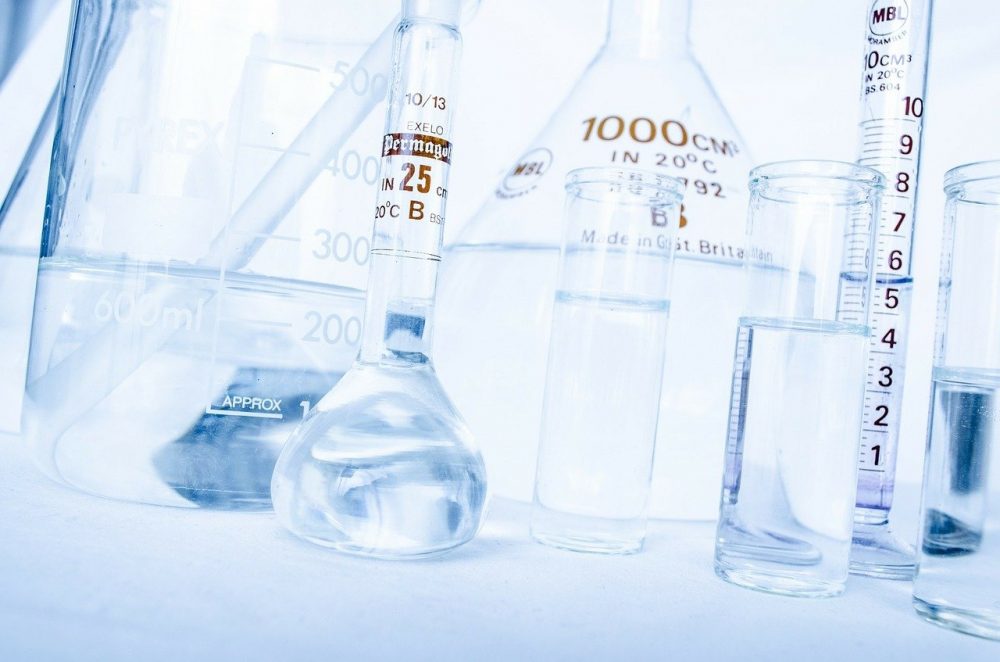
Are you looking for the best topic in chemistry? We are here to help. Take a look at our amazing chemistry research paper topics and chemistry related topics. Pick the one you like and start writing your paper in minutes!
Remember, all our chemistry paper topics are 100% original and we go to great lengths to update the list as frequently as possible. These are the topics in chemistry you need in 2023. We also have plenty of topics in chemistry high school students will love. Use any of these topics for free today!
Why Our List of Chemistry Topics?
We know that finding exceptional chemistry topics can be tough. After all, your classmates are all searching on the Internet for the exact same thing as you. There is a high probability that you will choose some chemistry topics that are already in someone else’s crosshairs. You surely want to avoid writing about the same thing, especially considering the fact that professors usually award bonus points to students who come up with something interesting to write about.
Chemistry is considered one of the hardest college majors , but it’s not a reason to give it up. If you are looking for interesting chemistry topics for presentation, chemistry topics for research or chemistry project topics, you should definitely take a look at our list.
Organic Chemistry Topics
If you are looking for some of the best organic chemistry topics on the Internet, you have arrived at the right place. Take a look at some of these ideas:
- The types of isomerism in organic chemistry.
- The chemistry of aging.
- What are nucleophiles?
- The chemistry behind hydrocarbon fuels.
- The chemistry of Organosilicon elements.
- What are electrophiles?
High School Chemistry Topics
Are you a high school student? You may want to pick one of these interesting high school chemistry topics and start writing your paper today:
- Analyze polyhydric alcohols.
- Analyze aniline dyes.
- What are Proteinogenic aminos?
- The chemical composition of Teflon.
- How is Isoprene rubber created?
Interesting Chemistry Topics
Your professor will surely appreciate you taking the time to come up with the most interesting topic possible. Choose one of our interesting chemistry topics:
- Effects of diet soda on bone density.
- The chemistry behind diet sodas.
- The chemistry of ossification.
- What makes radon dangerous?
- Forensics and the use of chemistry.
- What can replace eggs in foods?
Chemistry IA Topics
Are you looking to boost your IB grades? Get a top score on your internal assessments with our excellent chemistry IA topics:
- Determine the Kc of a particular reaction.
- Analyze the Ideal Gas Laws with a data logger.
- Analyze a redox reaction and calculate the enthalpy change.
- Using calorimetric analysis, determine the amount of CaCO3 in egg shells.
- Three brands of juice and their vitamin C percentages.
AP Chemistry Topics
Ace your AP chemistry course and get top grades on all your essays with our interesting and 100% original AP chemistry topics:
- Analyze the molar mass of a particular substance.
- Chemical equilibrium.
- Analyze three reaction types.
- Solids vs. liquids.
- Evidence for the atomic theory.
Current Topics in Medicinal Chemistry
Writing about current topics is one of the best ways to make sure you get a good grade. We have some current topics in medicinal chemistry that would work great in 2023:
- Group 3B elements and their medicinal properties.
- What are biologically active elements?
- Group 4B elements and their medicinal properties.
- Aspartame: better than sugar?
- How do modern antibiotics work?
General Chemistry Topics
If you want to write an essay about something general (to save time), we recommend the following list of general chemistry topics:
- The chemistry behind fertilizers.
- How do antiviral agents work?
- The chemistry behind synthetic food.
- Growth stimulants for animal farm productivity.
- The chemistry behind e-cigarettes.
Chemistry Projects Topics
Completing a chemistry project can be very difficult. Of course, the topic you choose is extremely important as it can make your life a lot easier. Just pick one of our chemistry projects topics:
- Plant reaction to biologically active H2O.
- Anti-icing agents and their chemistry.
- How do food additives work?
- How are artificial diamonds created?
- Detect nitrate levels in plants.
Chemistry Research Topics for High School
We have some of the best chemistry research topics for high school students you can find online. Use any of these topics in 2023 and get an A+ on your next paper:
- What causes snow pollution?
- Link between healthy nutrition and good health.
- The use of calcium in medicine.
- What causes Beryllium to be toxic?
- How to detect acids in air?
Cool Chemistry Topics
You professor will appreciate your ingenuity, so why not pick one of our cool chemistry topics? Any of these topics will work great and, in addition, they’re pretty easy to write about:
- Pest control mechanisms.
- The role of carboxylic acids in our body.
- Heat engines and their negative environmental effects.
- What are biopolymers?
- Cool ways to freeze water.
Physical Chemistry Topics
Physical chemistry can be tough, we know. But did you know that choosing the right topic can make writing the essay significantly easier? Here are some of the best physical chemistry topics:
- Analyze the atomic structure of a substance.
- Chemical equilibrium project.
- Molecular spectroscopy applications.
- Discuss statistical molecular thermodynamics.
- The second law of thermodynamics: Entropy
Inorganic Chemistry Topics
Our ENL writers have put together a list of amazing inorganic chemistry topics that you can use right now. Pick any of these topics and start writing your paper in minutes:
- Discuss chemical bonding.
- The mechanical properties of alloys.
- What is Redox stability?
- Magnetic properties of metals.
- The chemistry of acids and bases.
Controversial Chemistry Topics
Don’t be afraid to choose one of our controversial chemistry topics. You are not prohibited from writing about these topics, so you don’t have to worry about a thing.
- Is chemical warfare ethical?
- Replicating synthetic molecules.
- Is gene analysis ethical?
- The biography of Fritz Haber.
- Chemistry behind chemical weapons in WWII.
Chemistry Topics for Presentation
Are you putting together a presentation? You may be interested in some very interesting chemistry topics for presentation. Take a look at these ideas:
- How do synthetic molecules replicate?
- Everything you need to know about the Lewis structure.
- Silicon dioxide and solar cells.
- Here is how a Sapphire is formed.
- Differences between organic and inorganic elements.
Easy Organic Chemistry Research Topics
If you don’t want to spend a lot of time researching and writing the essay, you may be interested in one of our easy organic chemistry research topics:
- How does a 3D printer work?
- What is Californium?
- The use of Sodium Azide in airbags.
- The process of photocatalysis.
- How is dry ace created?
Environmental Chemistry Topics
The environment is a pretty hot topic nowadays. Of course, you professor will greatly appreciate you writing an essay on one of these interesting environmental chemistry topics:
- Effect of pesticides on the environment.
- The dangers of petroleum products.
- The effects of pollution on plants.
- Analyze quality of the air in your area.
- Barium toxicity effects on the environment.
Chemistry Research Topics for Undergraduates
Are you an undergrad looking for a chemistry topic that will awe your professor? Here are some of the most interesting chemistry research topics for undergraduates:
- The chemistry of cosmetic products.
- Ibuprofen drugs and their dangers.
- Discuss electronegative atoms.
- The concept of Stoichiometry.
- An in-depth analysis of the hydrophobic effect.

Chemistry Regents Topics
Passing the Chemistry Regents exam is a must for you, we know. However, you need to prepare thoroughly because this is not an easy test. Practice now with our chemistry regents topics:
- Compare suspensions and dispersions.
- The Law of Partial Pressures.
- Analyze hydrogen.
- Modern applications of gas laws.
- Chemical changes caused by drug abuse.
Chemical Engineering Topics
Interested in writing about chemical engineering? We have some of the best and most interesting chemical engineering topics for you:
- Describe the anharmonic oscillator.
- Application of modern polymers.
- In-depth look at petroleum engineering.
- 3D printing applications.
Easy Chemistry Topics for Project
Don’t worry, we can help you with your chemistry project. The easier the topic, the faster you’ll be done. Here are some of the best easy chemistry topics for project:
- The amazing properties of H2O.
- Lipids and their role in human life.
- How does a nano-filter work?
- Plastic packaging health risks.
Do You Need Our Help?
Do you need some more chemistry presentation topics to choose from? Or perhaps you need the most interesting topics in current chemistry. Our experts know all the ins and outs of chemistry and are always up to date with the latest news and developments. So, if you need an interesting chemistry topic, you should just get in touch with us and get chemistry homework help . We will send you a list of topics in no time (all 100% original, created just for you).
Of course, if you need more help, we are the team to rely on. We can help you with much more than just chemistry research topics. If you need writing, editing or proofreading help, contact us today. We have helped thousands of students get top grades on their academic papers, so we definitely know what we’re doing. We’ll get you the A+ you need, don’t worry!

Get on top of your homework.
Leave a Reply Cancel reply
Your email address will not be published. Required fields are marked *
Questions? Call us:
Email:
- How it works
- Testimonials
Essay Writing
- Essay service
- Essay writers
- College essay service
- Write my essay
- Pay for essay
- Essay topics
Term Paper Writing
- Term paper service
- Buy term papers
- Term paper help
- Term paper writers
- College term papers
- Write my term paper
- Pay for term paper
- Term paper topic
Research Paper Writing
- Research paper service
- Buy research paper
- Research paper help
- Research paper writers
- College research papers
- Write my research paper
- Pay for research paper
- Research paper topics
Dissertation Writing
- Dissertation service
- Buy dissertation
- Dissertation help
- Dissertation writers
- College thesis
- Write my dissertation
- Pay for dissertation
- Dissertation topics
Other Services
- Custom writing services
- Speech writing service
- Movie review writing
- Editing service
- Assignment writing
- Article writing service
- Book report writing
- Book review writing
Popular request:
Top 75 chemistry research topics for your paper.
October 10, 2019
Are you looking for the best chemistry research topics on the Internet? We are happy to tell you that you have arrived at the right place. Even though our topics are public and anyone can use them, we are doing our best to keep this list as fresh as possible. However, if you are worried about the originality of your next chemistry research paper topics, we have a great tip on how to find 100% original topics.

In this post, we will be discussing why you need interesting chemistry topics for research projects. We will also show you how to find many more topics. Of course, because we are all about helping the student, we will give you 75 interesting chemistry topics to research. You are free to use these topics as you see fit. This means you are allowed to reword them in any way.
The Truth About Chemistry Research Paper Topics
Let’s start with the beginning. Why would you want to find the most interesting chemistry research topics? You are probably well aware that professors are looking carefully at each topic they see. In most cases, students write about the same old topics. And truth be told, teachers are tired and bored of reading the same thing over and over again. This is why, when the professor sees a new topic, he instantly becomes interesting. And an interested academic is much more likely to award your hard work with a top grade. This is why we consider chemistry topics for research papers to be so important.
Finding Awesome Chemistry Topics for Research Papers
When you are looking for chemistry topics for research project, you may be tempted to turn to Google and to the myriad of websites on it. But this is not the best approach. In the beginning of the post, we promised you the best way to get 100% original topics, and we will keep our word. The best way to get research paper topics chemistry professors will be really interested in is to work with a professional. In other words, you should contact an academic writer and ask for a chemistry research topics list. Yes, it will cost you a couple bucks, but this money is well spent. You will get a list of topics that none of your peers has access to. The best way to find a reliable academic writer who will deliver on his promises is to contact an academic writing company. There are several reliable ones on the Internet, of course.
The Best 75 Chemistry Topics for Research
Looking for chemistry research topics high school teachers would love to read about? Are you a college student or an undergrad who is looking for fresh chemistry topics to research? Regardless what you need these topics for, we are here to help! We have asked our experienced chemistry writers to compile a list of the best chemistry topics; chemistry topics that they would recommend to their clients.
Organic Chemistry Research Topics
Of course, no list would be complete without organic chemistry research topics. Organic chemistry is a huge area of chemistry, so there are plenty of things to talk about. Also, new research is being done all the time, so you can easily find fresh ideas and information. Here are some of our best ideas:
- The types of isomerism in organic compounds.
- What are nucleophiles?
- What are aniline dyes?
- The stability of nucleic acids (DNA and RNA)
- Describe what an oil is.
- How is hydrocarbon fuel produced?
- What are electrophiles?
- Describe phenol as an acid.
- How are globular proteins formed?
- What is an organosilicon compound?
- How dangerous is snow pollution?
Chemistry Research Topics for High School
We have some of the best chemistry research paper topics for high school students on the Internet. These topics are not very difficult and you can easily find plenty of information online. This means that you can write an essay on any of the following topics in as little as 2 hours:
- Analyzing the PH effect on plants.
- How are pearls created?
- Growing artificial diamonds.
- How to optimize the brewing of tea?
- How do we detect heavy metals in plants?
- Analyzing the air we breathe.
- The dangers of using petroleum products.
- Natural versus synthetic detergents.
- Explain barium toxicity.
- How can indoor plants benefit from chemistry?
- How do you clean oil effectively?
Chemistry Research Topics for College
Chemistry research topics for college students are a bit more difficult. After all, college professors expect you to put in a lot more work than a high school student. This doesn’t mean that you can’t write these papers quickly though. Here are some of the best topics we can think of:
- The hidden dangers of tap water.
- How did Dmitri Mendeleev discover the Periodic Table?
- How harmful are electronic cigarettes?
- Analyzing the water memory effect.
- What’s in the first aid kit?
- The effects of carboxylic acids on humans.
- How can you freeze water fast?
- Analyzing anti-icing solutions on airports.
- The classification of chemical reactions.
- What is a covalent polar bond?
- How does water purification work?
Inorganic Chemistry Research Topics
Of course, we have to include inorganic chemistry research topics in our list. We can’t have organic topics in here without inorganic topics. There are plenty of topics about inorganic chemistry out there, but we have selected only the best for you:
- Why is NaCl salty?
- How are sapphires formed?
- Explain the Law of Multiple Proportions.
- Explain the various states of matter.
- The effect of sulfuric acid on organic material.
- Why is silicone dioxide used in solar cells?
- The difference between organic and inorganic compounds.
- Why is inorganic chemistry important?
- Discussing Lewis Structures and Electron Dot Models.
- Explain Dalton’s Law of Partial Pressures.
Chemistry Research Topics for Undergraduates
Yes, chemistry research topics for undergraduates are more difficult than those aimed at college students. However, we’ve made sure to only select topics that you can find a lot of information about. In other words, it’s not impossible to write an essay on one of our topics in one day. Here is what we propose:
- How do we use hydrogen to discover oxygen?
- How does an allergy develop?
- What is surface tension? Any applications?
- Discussing the ionization methods used in the mass spectrometry process.
- How can one stabilize lithium?
- What are food dyes really made of?
- A study of the Lewis Structure.
- Why is Ibuprofen considered dangerous?
- Explaining the chemical equilibrium effect.
- How are nanophotonics used in military applications?
Most Interesting Chemistry Research Topics
You are probably aware that professors really appreciate interesting chemistry research topics. This is precisely why we have compiled a list of interesting topics. These topics can be picked by both high school students and college students. Some of these topics can even be picked by undergrads:
- How does photocatalysis work in 3D printers?
- Who was Fritz Haber?
- What are nanoreactors in chemistry?
- Why do glow sticks glow?
- What is Californium?
- Why does the Sun burn without the need for oxygen?
- How do you freeze air?
- Why is there Sodium Azide in car airbags?
- How is dry ice made?
- What is the color of oxygen?
Easy Chemistry Topics
At the very end of our list, you can find the easy chemistry topics. These are perfect for when you need to write an essay quickly (usually in less than an hour). You don’t want to do a lot of research and you want to find all the relevant information with a single Google search. These are the topics for you:
- Why does water expand upon freezing?
- What are pesticides made of?
- How are batteries made?
- Describe a thermoelectric material.
- How can we avoid pesticides?
- How do synthetic molecules replicate?
- What are the implications of the Thermodynamics Laws?
- What is cholesterol?
- How do vitamins act in the human body?
- Why is aspirin a pain killer?
- What are steroids?
- The process of recycling plastics.
Many students have asked us if simply finding chemistry research topics is enough to get an A or an A+. Sadly, the answer is “No.” Your professor will award you some bonus points for an original, interesting topic. However, if you don’t write in the proper academic format, or if you make serious errors, you will get a low grade. This is why we always tell our readers to learn as much as possible about academic paper writing.
For a chemistry paper, the first thing you should do is read about the five paragraph essay structure. It will get you out of a lot of problems, guaranteed. After you know how to write the paper correctly, pick one of our topics and start writing. Good luck!
It’s time to nail your grades! Get your 20% discount on a chemistry writing assignment with promo “ ewriting20 ” – and enjoy your college life!

Take a break from writing.
Top academic experts are here for you.
- How To Write An Autobiography Guideline And Useful Advice
- 182 Best Classification Essay Topics To Learn And Write About
- How To Manage Stress In College: Top Practical Tips
- How To Write A Narrative Essay: Definition, Tips, And A Step-by-Step Guide
- How To Write Article Review Like Professional
- Great Problem Solution Essay Topics
- Creating Best Stanford Roommate Essay
- Costco Essay – Best Writing Guide
- How To Quote A Dialogue
- Wonderful Expository Essay Topics
- Research Paper Topics For 2020
- Interesting Persuasive Essay Topics
This website uses cookies to improve your user experience. By continuing to use the site, you are accepting our use of cookies. Read the ACS privacy policy.
- ACS Publications
28 Must-Read Topics in Chemistry
- Mar 4, 2021
- 14 min read
ACS Publications regularly produces collections of the most important chemistry research topics. These Virtual Collections of the most important chemistry research topics bring together the most important ideas in the field in a variety of ways, including Special Issues and ACS Selects from across the portfolio journals. These collections reflect the most important chemistry research […]

ACS Publications regularly produces collections of the most important chemistry research topics. These Virtual Collections of the most important chemistry research topics bring together the most important ideas in the field in a variety of ways, including Special Issues and ACS Selects from across the portfolio journals. These collections reflect the most important chemistry research topics of current scientific interest and are designed for experienced investigators and educators alike.
Browse 28 of the most important, engaging topics in chemists with Virtual Collections released by ACS Publications journals in Q4 2020:
Crystalline molecular materials: from structure to function.

This Virtual Special Issue focuses on the design and study of materials wherein the target properties arise from, or are enhanced by, the three-dimensional assembly of molecules in a solid phase. The “structure−function” relationship transcends the nature of the individual molecule, and supramolecular organization is a key component in the material’s properties. The goal of this issue is to assemble contributions from a broad community of scientists with similar research interests, as defined by the need to understand and manipulate the bulk assembly of molecules. Placing emphasis on a common interest in supramolecular architecture, this issue showcases work in apparently disparate fields, including molecule-based magnetism, rare zero thermal expansion properties, and catalytic activity.
Read the Issue. ***
Materials for Thermoelectric Energy Conversion
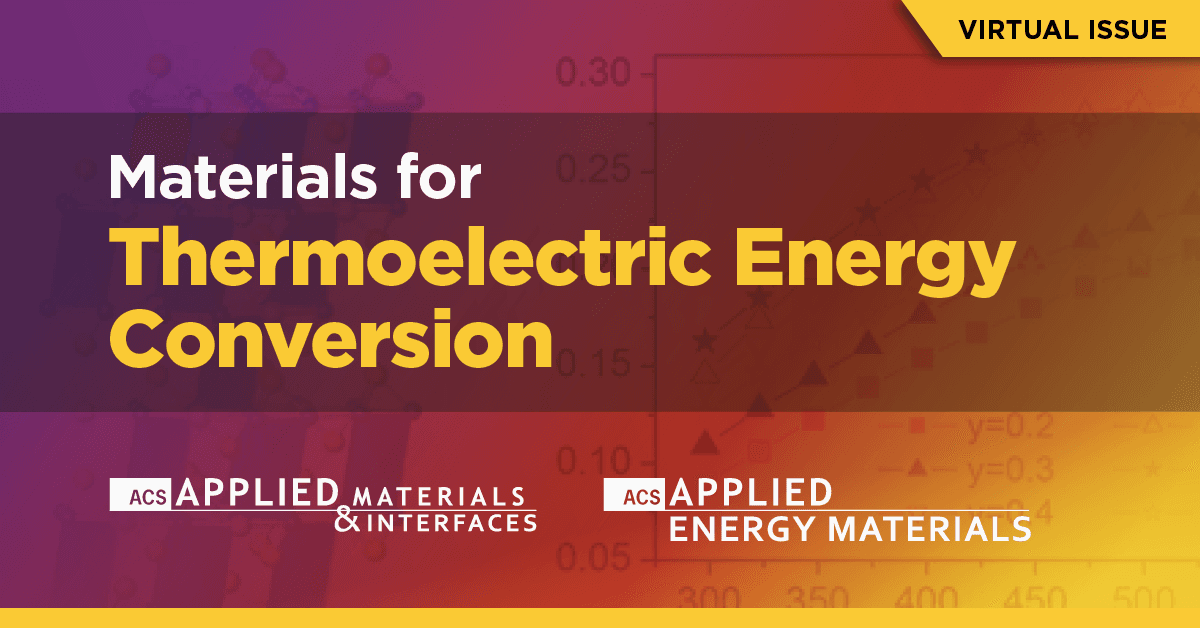
This virtual issue of ACS Applied Materials & Interfaces and ACS Applied Energy Materials presents cutting edge articles in the field of Thermoelectric Energy Conversion. Thermoelectric materials and devices are central for energy conversion and management as they convert waste heat into electricity. Given the ubiquitous nature of heat, thermoelectric materials provide total-package solutions to mitigate environmental crisis and energy needs. The realization of this has caused a surge in the development of high-performance, environmentally benign, robust, and earth-abundant inorganic materials, which can be used in heat to electrical energy generations in power plants, space, automobiles, households, battery technology, and data centers. Interestingly, flexible thermoelectric materials, mainly based on organic/polymer materials, have successfully been integrated into body-worn fabrics and watches, which simply utilize body heat to generate electricity. Furthermore, using the Peltier effect, thermoelectric coolers are developed and are one of the mainstays in the consumer market for refrigeration purposes, especially for portable applications. Hence, thermoelectricity is foreseen as a potential frontrunner in energy management for the near future.
Interfacialscience Developments at the Chinese Academy of Sciences

This virtual issue is a sampling of some of the most recent work from the Chinese Academy of Sciences, with an emphasis on work from this year (2020) so far. The 46 articles in this virtual issue cover a broad range of research topics, examples of which include Janus particle engineering and interfacial assembly, surface modification of colloid particles, stability of water monolayer in mineral under high pressure, nano-bubbles adsorption on surface, switching of underwater superhydrophilicity and superoleophobicity, nanostructured de-icing surface, lithium ion battery anode binder, bio-inspired smart liquid directional transport control, corrosion resistance of alloys, behavior of polymers at solid/liquid interface, and effect of polymer conformation on protein resistance.
Celebrating 90% Completion of the Human Proteome
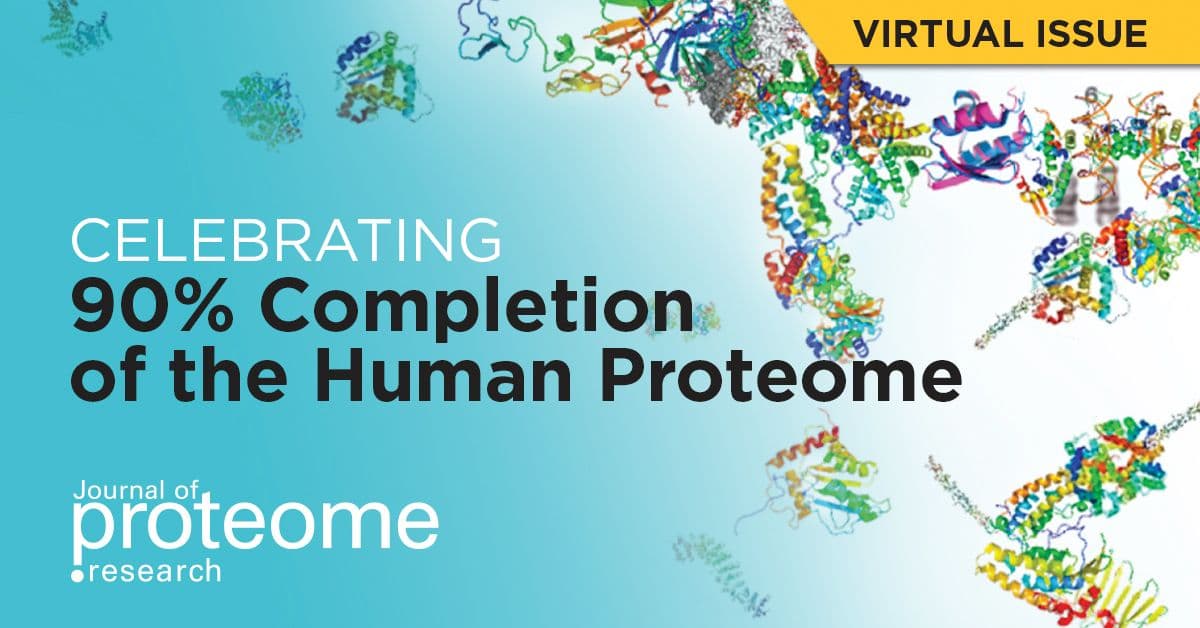
Twenty years after the establishment of the international Human Proteome Organization (HUPO) and ten years after its launch of the Human Proteome Project (HPP), researchers have much to celebrate. Today, HUPO will release the draft human proteome at the 19th Human Proteome Organization World Congress, connecting virtually, with this Virtual Issue published in the Journal of Proteome Research.
Read the Issue . ***
Nanomaterials-based Membranes for Chemical Separations
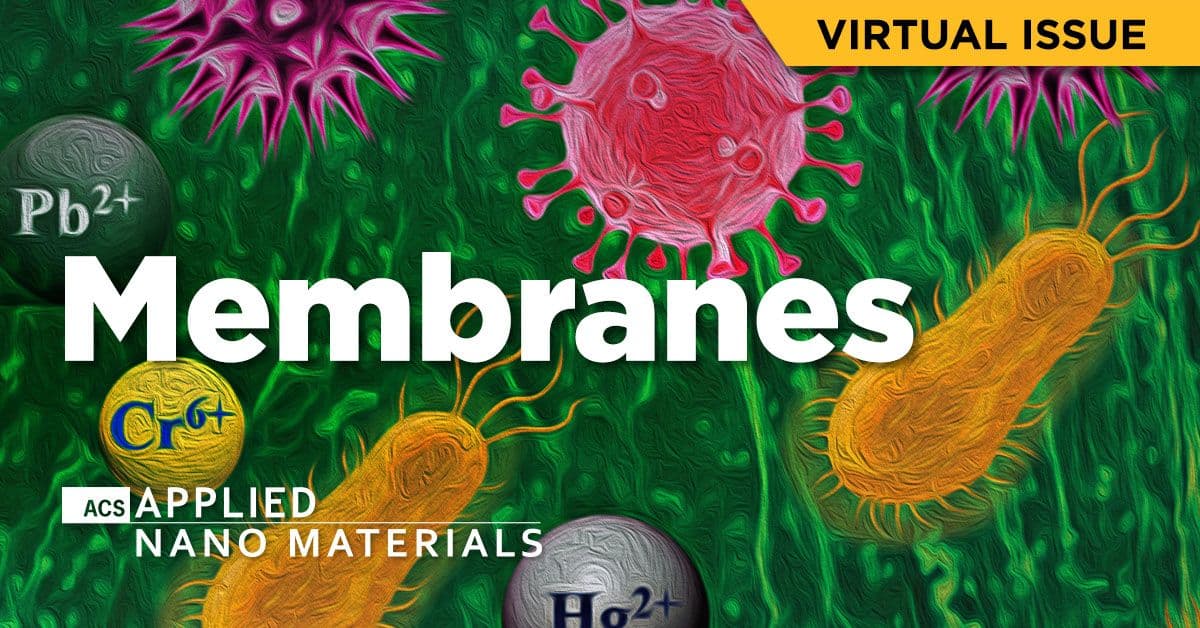
Membranes are a critical area of research in academia and have been used in industrial applications for decades. Membrane-based separations are desired in industry because they can be highly energy efficient and up to an order of magnitude less expensive than other techniques such as distillation. In addition, these separations are easily scaled to industrial levels so that advances in the laboratory can be translated to real applications. The key challenges in this field are how to separate chemicals with similar sizes by having a high flux for only one chemical through a membrane. This difference in flux should translate into a high selectivity for one chemical over one or more other chemicals present in a mixture. An unfortunate trade-off in membrane-based separations is that as the permeation of a chemical increases, the selectivity of the membrane will often decrease. To address these challenges, scientists often use cross-linked polymers with ill-defined pores, hard materials such as zeolites with well-defined pores, 2D materials, coated nanofibers, carbon nanotubes, metal nanoparticles, or other nanomaterials.
Organic Chemistry in China: Synthetic Methodology, Natural Products, and More
During the past 20 years, China has become a powerhouse in chemistry research, now leading globally in submissions of research articles to chemical journals. In recognizing these developments, Organic Letters presents a Virtual Issue that includes a collection of 25 research articles contributed by Chinese chemists during 2019-2020, selected from among the more than 1,000 articles published in the journal from China over this period.
Advances in Microfluidics Research
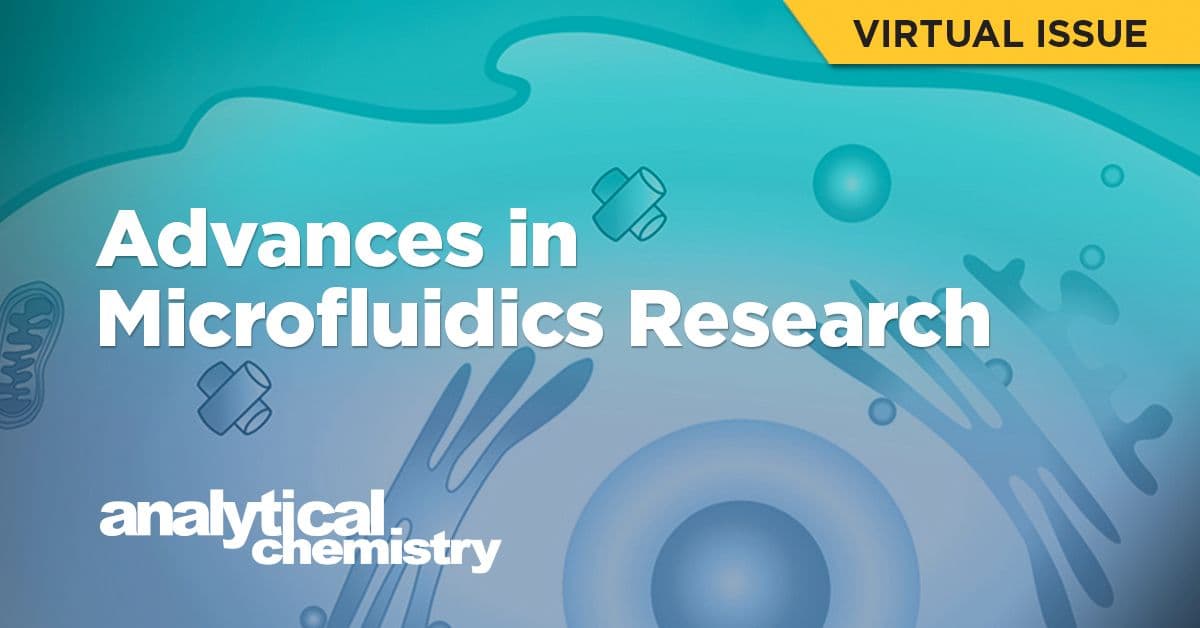
This Virtual Issue highlights articles published in Analytical Chemistry that showcase advances in microfluidics research over the past several years. The articles below are separated by sub-field and span research on virus detection to cell manipulation to 3D-printing, and are all at the cutting edge of microfluidics technologies. The thirty articles included in this collection were selected by Associate Editor Yoshinobu Baba and include previous winners of the Chemical & Biological Microsystems Society (CBMS)/ Analytical Chemistry co-sponsored Young Innovator Award.
Chemistry in Korea: IBS and Beyond
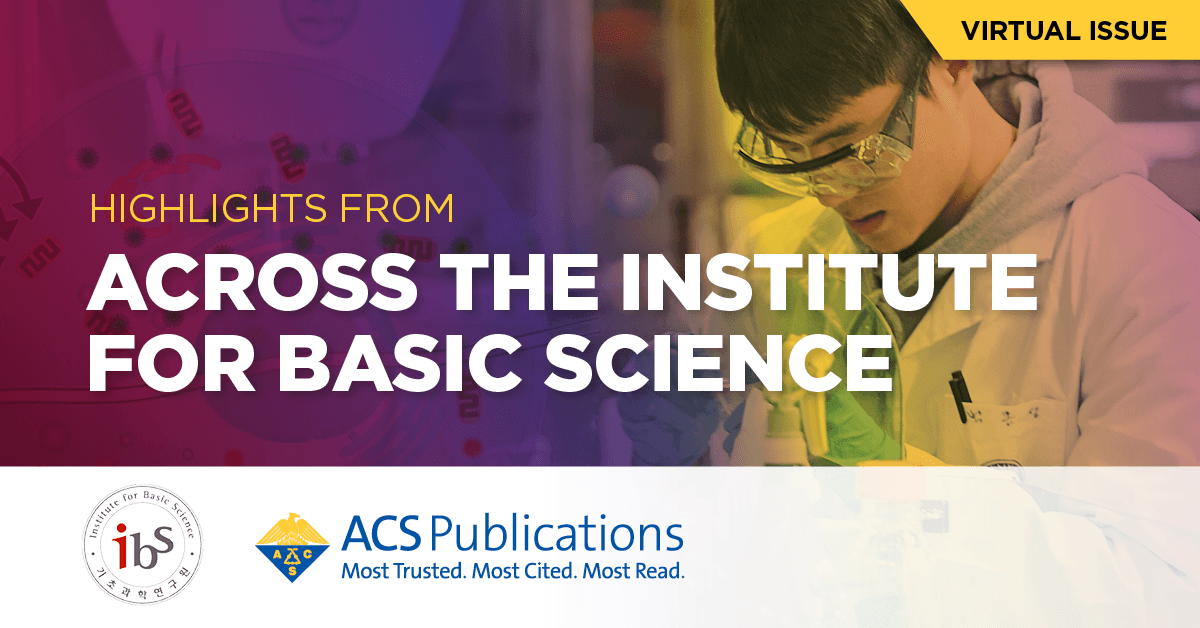
This virtual issue of “Chemistry in Korea: IBS and Beyond” highlights the latest contributions from eight IBS centers along with exciting advances from other emerging scientists in South Korea. Topics encompass a wide range of chemistry and its cross-boundary researches from theory and simulations, nanomaterials, molecular synthesis, catalysts, spectroscopy, supramolecular chemistry, soft materials to nanomedicine.
Highlighting Analytical Chemistry 2020 Advisory Board Members

The members of Analytical Chemistry ‘s Editorial Advisory Board (EAB) and Early Career Board (ECB) panels devote substantial voluntary time and energy to support Analytical Chemistry and deserve special recognition for their contributions. In recognition of their service, this new virtual issue is dedicated to the members of both the journal’s EAB and ECB, with each selecting one of their recent Analytical Chemistry articles to highlight.
A Bright New World of Ferroelectrics: Magic of Spontaneous Polarization

Ferroelectric materials featured with spontaneous polarization have experienced a century of vigorous development. The permanent electric dipole moment makes ferroelectric an outstanding multifunctional material for a wide range of applications. Ferroelectrics with unique coupling effects among electric, optical, mechanical, thermal, and magnetic orders, have been developed for a wide range of functional devices and triggered a new world-wide wave of ferroelectric research. This virtual issue highlights some of the key state-of-the-art findings in ferroelectrics published in ACS Applied Materials & Interfaces and ACS Applied Electronic Materials , and the editorial attempts to reflect the rapid development and provide a perspective in this field.
Peter J. Rossky Festschrift
This Virtual Special Issue honors Professor Peter J. Rossky and his contributions to the field of physical chemistry.
Computational and Experimental Advances in Biomembranes
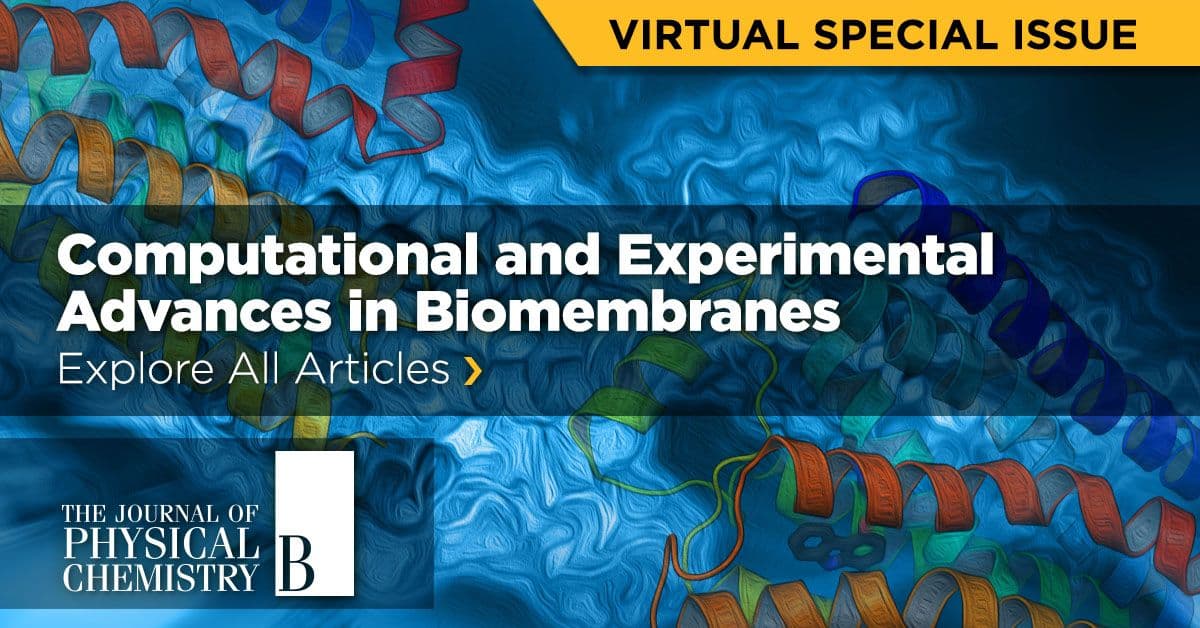
As an integral component of cellular architecture and signalling, cell membranes are central to cell physiology. Comprising a vastly heterogeneous mixture of proteins and lipids, cell membranes are constantly adapting their structural organization to regulate cellular processes. Malfunction at the level of lipid-protein interaction is implicated in numerous diseases, and hence, understanding cell membrane organization at the molecular level is of critical importance. The collection of articles in this Virtual Special Issue from The Journal of Physical Chemistry B provides a survey of the advances in both computational and experimental characterization of the complex processes underlying the behavior of cellular membranes.
Sensors and Industry

In this virtual issue, ACS Sensors and Analytical Chemistry highlight 30 of these outstanding industrial co-authored papers recently published in the two journals. The breadth of the articles in this collection emphasizes the incredible research on diagnostic methods being performed in both universities and industries, and highlights the benefits of collaboration between the two. Read the Issue . ***
Machine Learning in Physical Chemistry
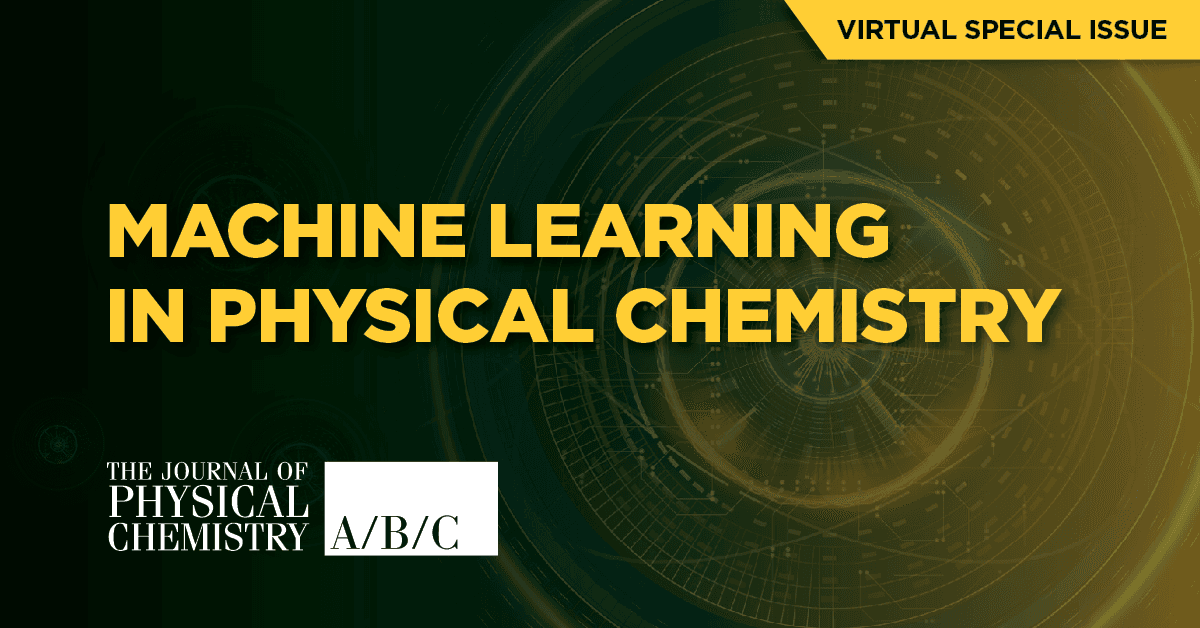
Physical chemistry stands today at an exciting transition state where the integration of machine learning and data science tools into all corners of the field is poised to do nothing short of revolutionizing the discipline. These powerful techniques – when appropriately combined with domain knowledge, tools, and expertise – have led to new physical insights, better understanding, accelerated discovery, rational design, and inverse engineering that transcend traditional approaches to materials, molecular, and chemical science and engineering. This collection of nearly 150 manuscripts from The Journal of Physical Chemistry A / B / C and The Journal of Physical Chemistry Letters reflects the relevance and popularity of this topic in physical chemistry by both the depth and breadth of excellent articles in this exciting collection.
Self-Healing Materials
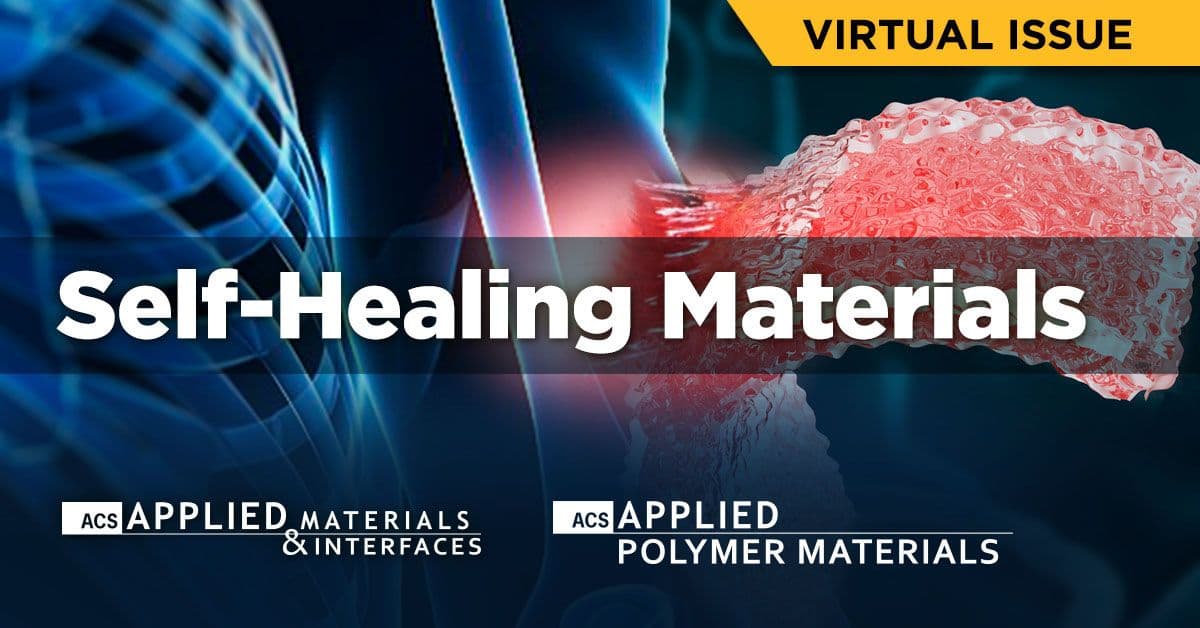
This is a spotlight on applications discusses developments made over the last six years that have enabled the fabrication of increasingly high-performance spray-coated perovskite solar cells. In particular, the various approaches adopted to spray-cast perovskite films (one-step vs two-step processes) ware charted and the development of sophisticated techniques used to control thin-film crystallinity is described. Finally, remaining research challenges are discussed that, once solved, may allow the mass deployment of low-cost solar energy.
Women in Mass Spectrometry

This virtual issue was assembled to feature talented women mass spectrometrists who publish in JASMS as the corresponding author. The articles compiled are among the most highly cited that were published in the journal in the last 5 years, regardless of gender, and are representative of the best mass spectrometry science reported in JASMS .
In Memory of Mario Molina (1943-2020)

Mario Molina was a Mexican chemist who shared the 1995 Nobel Prize in chemistry with the late F. Sherwood Rowland of UC Irvine and Paul Crutzen of the Max Planck Institute for Chemistry in Mainz “for their work in atmospheric chemistry particularly concerning the formation and decomposition of ozone.” Molina passed away in his birth city of Mexico City at age 77 on 7 October 2020. A physical chemist at heart, Molina published about 80 papers in The Journal of Physical Chemistry . His mentees remember him by celebrating 30 of them. His indelible legacy lives on through his publications, his collaborators, the scholars that he trained, the innovations in experimental design he made, the thousands who were inspired and informed by his science communication, and the millions whose quality of life improved thanks to his work on stratospheric ozone depletion and air quality in megacities.
Women Scientists at the Forefront of Energy Research: A Virtual Issue, Part 3
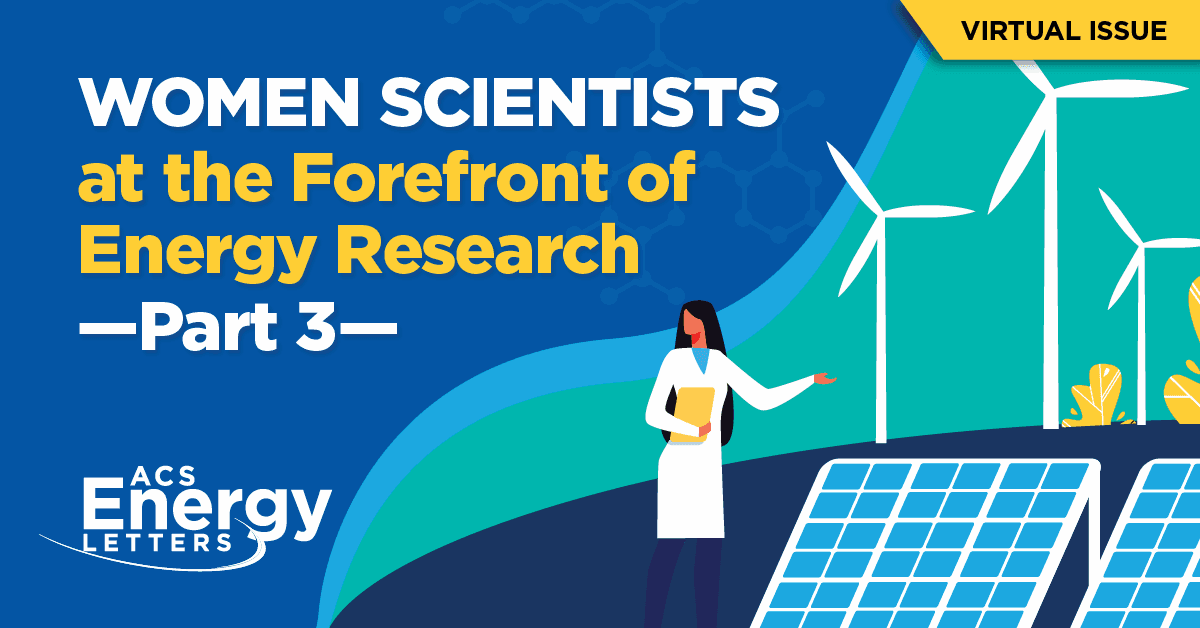
This is the third part of a series that recognizes women energy researchers who have published new advances from their laboratories in ACS Energy Letters . The inspirational stories and advice to newcomers in the field contained in this issue should provide motivation to advance the scientific research in energy conversion and storage. Through their personal reflections, these researchers discuss the successful career paths they have taken to become leaders in the scientific community.
Scalable Organic Chemistry: A Virtual Issue to highlight Organic Process Research & Development
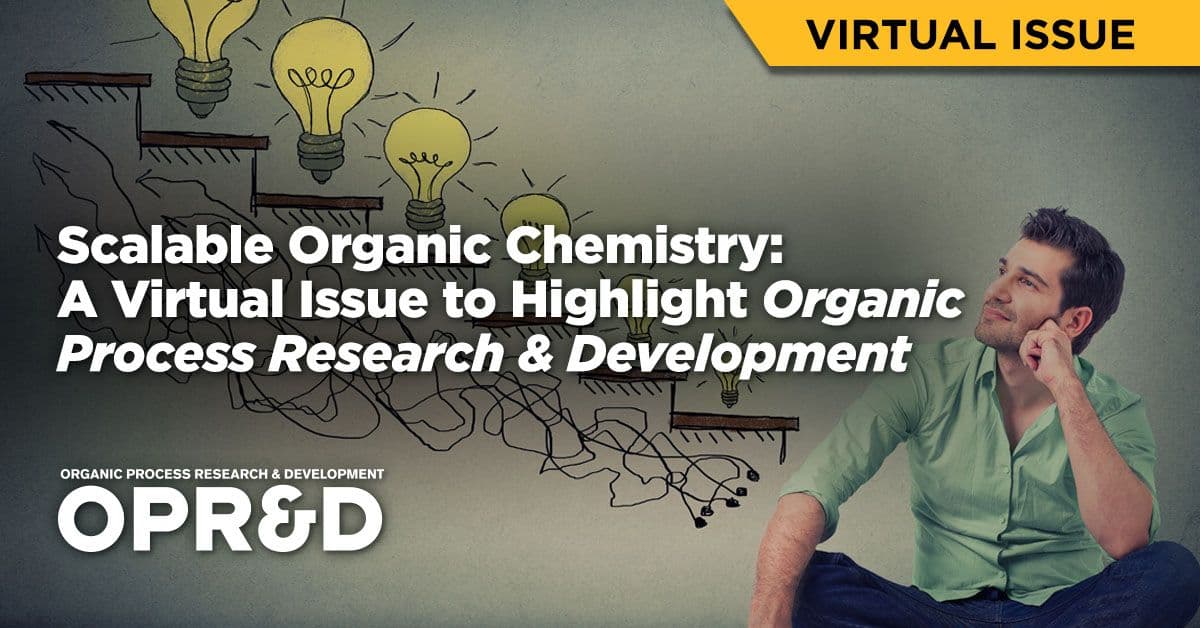
From small-scale use in academic research to large-scale application in industrial processes, only select chemistries make the cut to be relevant throughout the scale-up process. This virtual issue showcases a collection of innovative and industrially-relevant papers on key topics from academic and industrial chemists in Organic Process Research & Development .
Virtual Issue in Memoriam of Dr. Alan Poland (1940-2020)
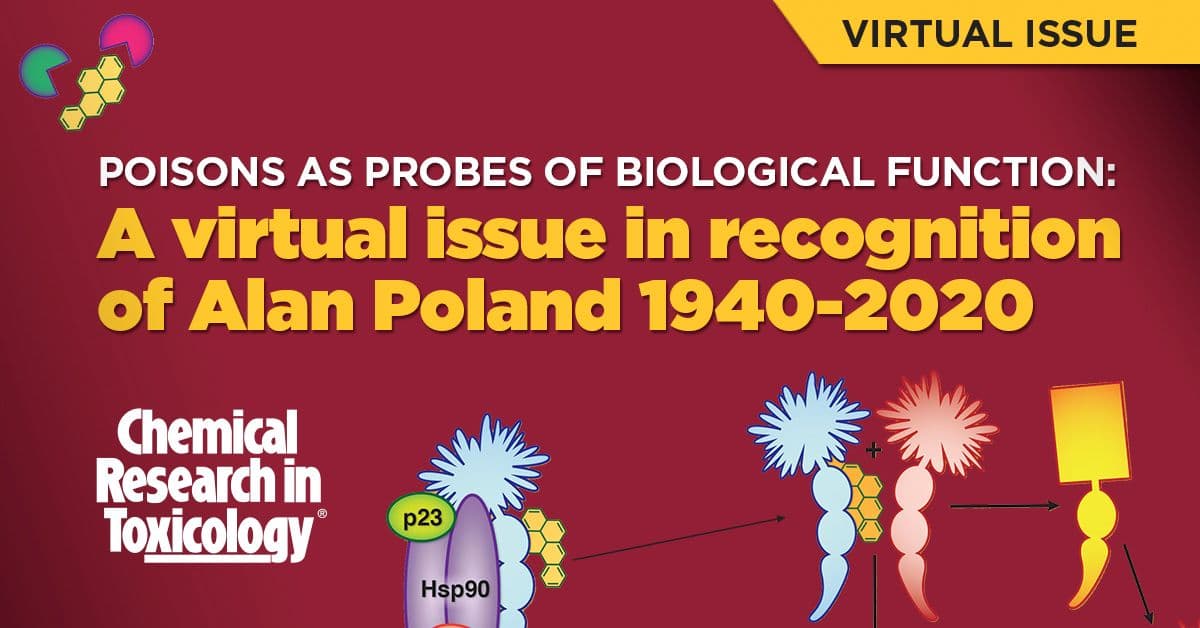
Dr. Alan Poland was a major influence on the development of modern molecular toxicology and the understanding of how chemicals cause cancer. He is most widely known for his groundbreaking work to explain the adverse effects of dioxins, chemicals and related environmental pollutants.
Deep Eutectic Solvents
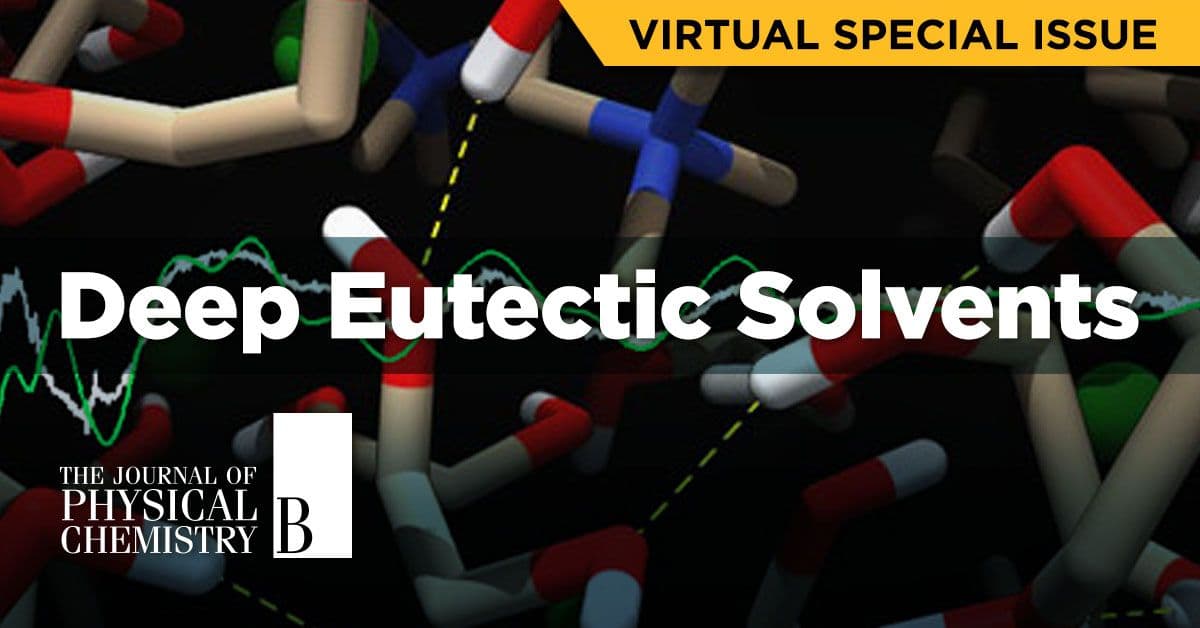
This virtual issue focuses on scientific and engineering advances related to Deep Eutectic Solvents. It includes papers that have appeared in the last two years in ACS Sustainable Chemistry & Engineering , Industrial & Engineering Chemistry Research , Journal of Chemical & Engineering Data , and Journal of Physical Chemistry B and C .
Celebrating ACS Sensors ‘ Editorial Advisory Board

Metal-Organic Frameworks: Fundamental Study and Applications
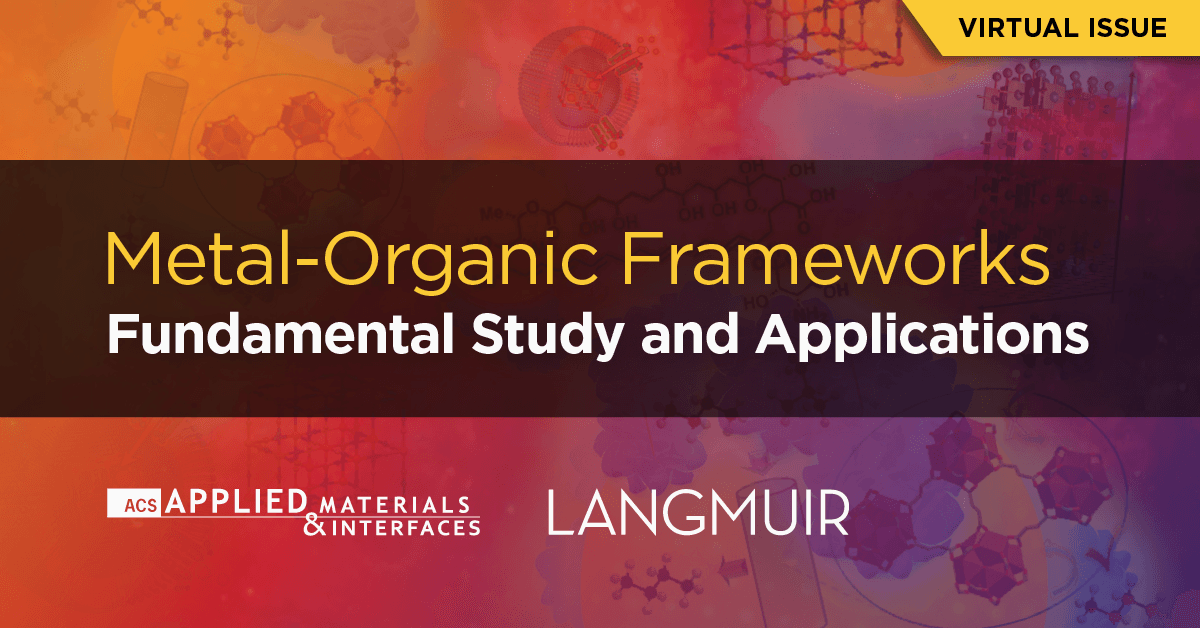
Exciting developments in metal-organic frameworks (MOFs) are the focus of this Virtual Issue that is jointly produced by Langmuir and ACS Applied Materials & Interfaces ( ACS AMI ). These two journals publish complementary and ground-breaking work on interfacial science. ACS AMI has a strong focus on practical applications whereas Langmuir encourages reports of both fundamental and applied nature, when rational design is a highlighted feature of the work.
Inorganic Synthesis in Uncommon Reaction Media
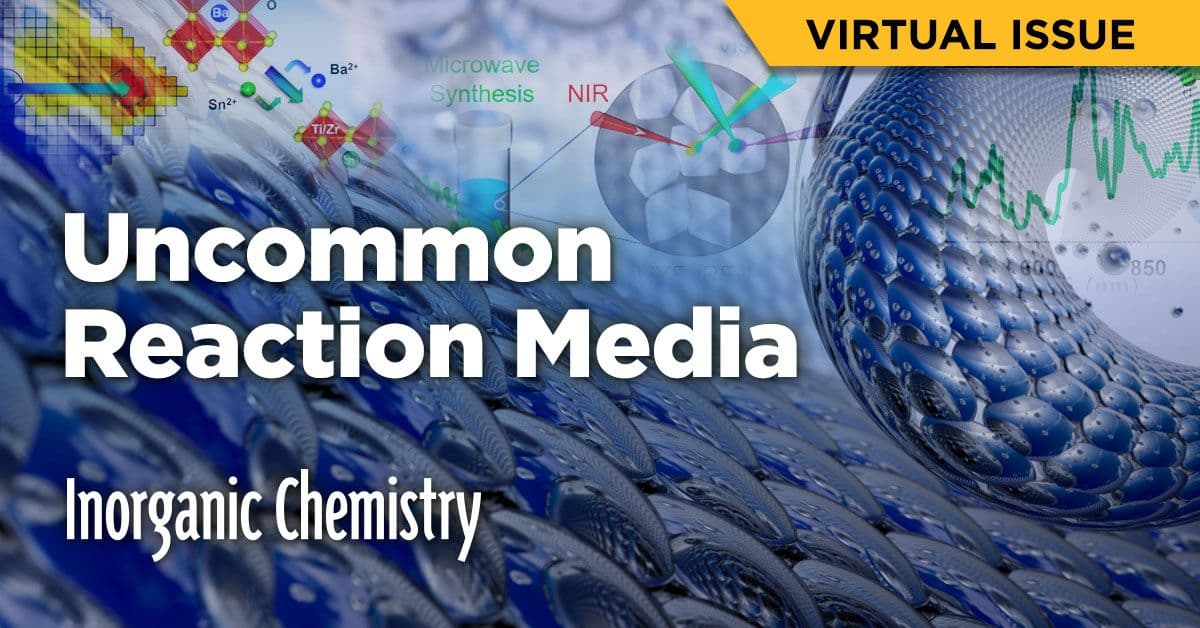
Water and organic solvents have long been the most common reaction media for chemical synthesis. Nevertheless, given limits in solubility and the need for extreme temperatures sometimes, especially for inorganic substances, chemists have had a growing interest in moving to “uncommon” reaction media to improve the access to certain compounds or to permit the fundamental study of the behavior of chemicals under unique conditions. In this Virtual Issue, “Inorganic Synthesis in Uncommon Reaction Media,” Guest Editor Julia Chan and Associate Editor Stefanie Dehnen highlight recent reports from Inorganic Chemistry and additionally from Chemistry of Materials and Crystal Growth & Design that feature reactions taking place in currently used uncommon systems: molten metals (metal flux), molten salts (nonmetal flux), ionic liquids (ionothermal if carried out under elevated temperatures), supercritical solvents (solvothermal), and liquefied gases.
The Challenge of Antibacterial Drug Permeation and Current Advances
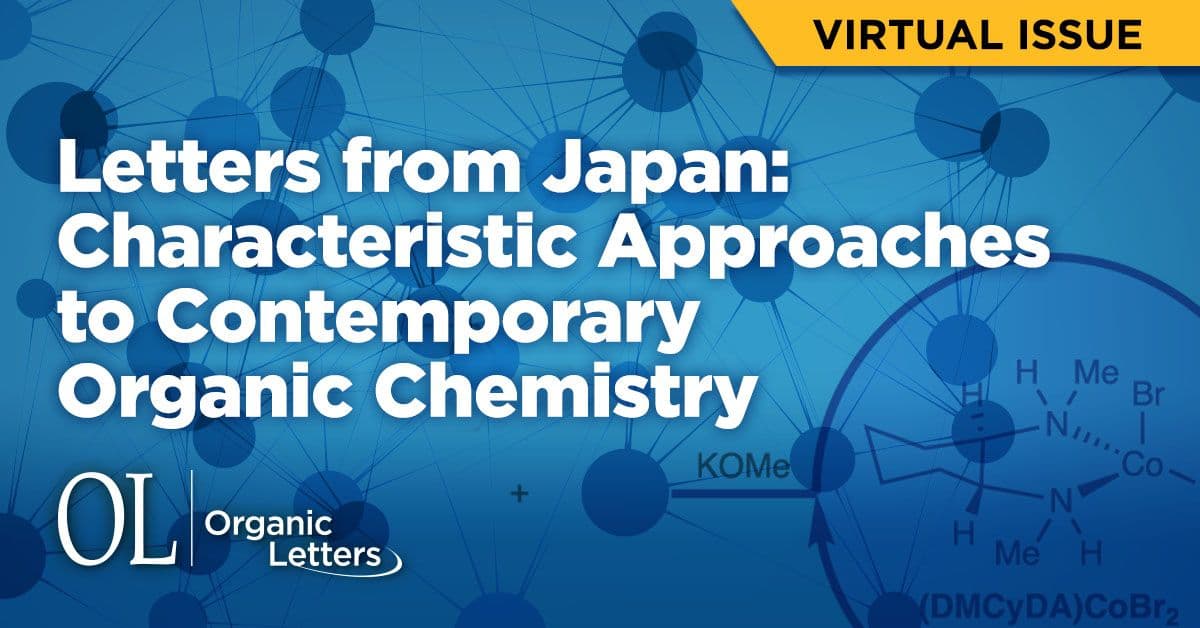
Recent advances in the area of drug permeation feed the pipeline of antibacterial agents with new and improved activities and keep the ever-changing landscape of antibiotic resistance effectively managed by small molecule therapeutics. The articles included in this Virtual Issue broadly represent three areas of research: 1) new experimental approaches to analyze intracellular accumulation of compounds in whole cells and compound permeation across model membranes; 2) new computational models of drug permeation across the outer membrane and integrated kinetic models of drug permeation across membranes with active efflux; and 3) new antibiotic screening campaigns and exploration of synergistic drug combinations bypassing bacterial permeation barriers.
Organic Chemistry in Japan: A Strong Foundation and Honorable Tradition
Organic chemistry has a strong foundation and honorable tradition in Japan, centering in recent decades predominantly on the development of synthetic methodologies, particularly in an interdisciplinary fashion focusing on cross-coupling and C-H activation and functionalization, the total synthesis of natural products, chemical biology research, supramolecular chemistry, and applications of (opto)electronic materials—all with an eye toward fostering international collaborations. This new Organic Letters Virtual Issue features 25 selected articles form 2019-2020 to highlight these achievements.
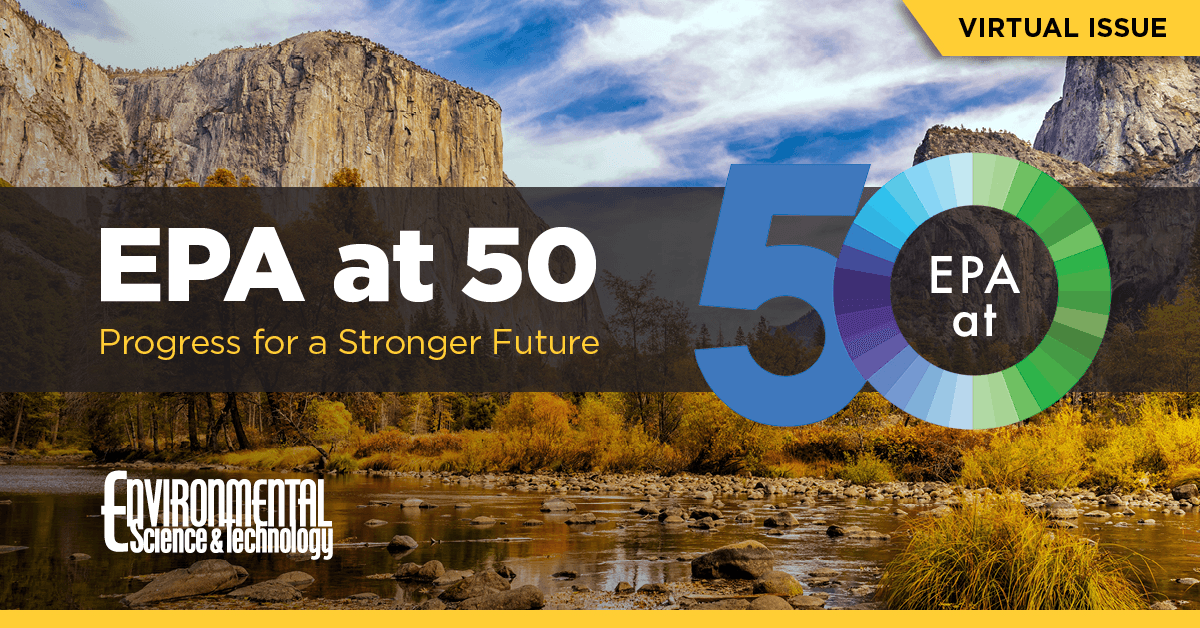
This virtual issue in Environmental Science & Technology ( ES&T ) marks the 50-year anniversary of the United States Environmental Protection Agency (US EPA). Recognizing this significant milestone brings an opportunity to reflect on the enormous achievements and impact this federal agency has had on the remediation and protection of the environment, reaching both domestically within the USA and globally since its official beginnings on December 2nd, 1970.
Bioconjugate Chemistry 30th Anniversary Reviews
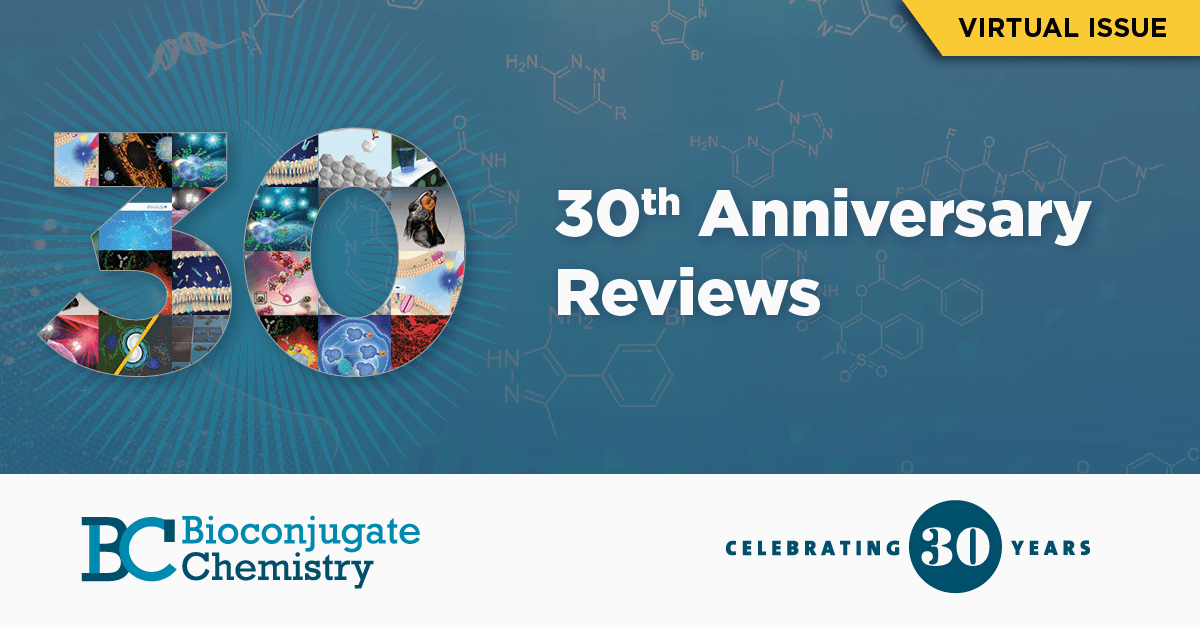
The breadth and impact of these 30th anniversary reviews demonstrate how the Bioconjugate Chemistry of today continues the forward-looking embrace of new science and systems while maintaining the old-fashioned virtues of scientific rigor and reproducibility.
Want the latest stories delivered to your inbox each month?
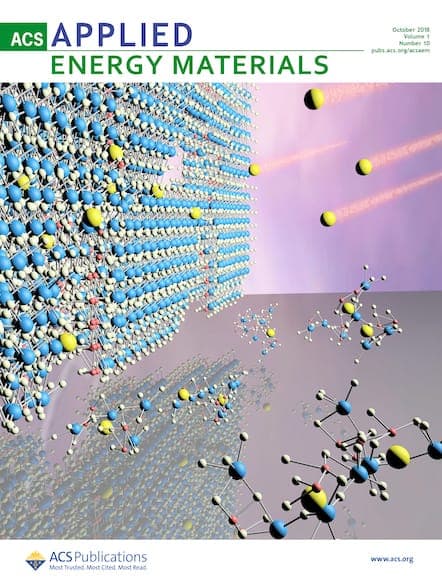
ACS Applied Energy Materials
- Paper writing help
- Buy an Essay
- Pay for essay
- Buy Research Paper
- Write My Research Paper
- Research Paper Help
- Custom Research Paper
- Custom Dissertation
- Dissertation Help
- Buy Dissertation
- Dissertation Writer
- Write my Dissertation
- How it works
200 Outstanding Chemistry Topics For Research Papers
Chemistry is an interesting science because you can study global phenomena or the smallest particles of various organic or inorganic compounds. When choosing chemistry research paper topics, you can focus on a specific section, select an entire industry, and be guided by authoritative sources.
One of the main advantages is the ability to choose an interesting chemistry topic for an essay or research paper. But this paperwork has a number of nuances. Chemistry research paper topics for high school can be as complex and challenging as the college or university ones.
The professors of the department set out standard requirements for the technical design of such assignments. You should also draw on authoritative sources by choosing one of the chemistry topics for research. The structure of your paperwork should contain a consistent outline and fully cover the selected problem. Every statement or statistical fact must be supported by evidence.
This is especially true when choosing chemistry research topics for college, where each piece of data must be confirmed. It is best if you follow several reputable sources. Then it will be easier for you to cover chemistry research paper topics for college and create expert paperwork that will bring you a high score.
High School Chemistry Topics
Such chemistry presentation topics for high school are quite interesting because they cover various fields of science. You can write about the chemical interactions of molecules, covalent bonds, or even the acid-base balance of the human body. Another plus is that topics like these are easy to find on the Internet and from several reputable sources for inspiration.
- Study of acid-base neutralization.
- The action of acid when interacting with other components.
- General composition of acids and their basic properties.
- Methods of air protection from pollution.
- Features of alkali metals and their derivatives.
- Metallurgy as the main component of the economy.
- The study of the chemical properties of metals.
- The basic atomic theory.
- The analysis of biochemical processes of magnesium.
- Process of catalysis.
- The general valence of chemical components and studies of metal relationships.
- The study of the chemical balance of bioreagents.
- The analysis of the rate of a chemical reaction.
- Chemical reaction as a basis in all science.
- Examples of chemical reactions in real life.
- Chemistry as the basis of industry.
- The chemical composition of drugs.
- Basic safety methods for chemical experiments.
- The analysis of covalent non-polar bonds.
- The general concept of acids and solvents.
Organic Chemistry Topics
Such analytical chemistry research topics deal with organics and everything related to living organisms. You can prepare paperwork related to the effect of food on the human body, the nuances of creating organic fertilizers, or the principles of pheromone generation at the chemical level.
- The basic composition of chemicals and organic compounds.
- The peculiarity of the isomerism of organic chemicals in real life.
- Atoms and molecules of organic substances.
- General properties of electrophiles.
- Hydrocarbons in real life.
- The methods of gas production.
- Bases of hydrocarbon fuels.
- Benzene and its chemical compound.
- Basic aromatic hydrocarbons.
- Atomic alcohols and their properties.
- Molecules and the bases of polyhydric alcohols.
- What are alkaloids, and how do they interact with each other?
- Water-soluble vitamins and examples.
- Chemical compositions of modern drugs.
- The main stages of the formation of gas deposits.
- Oil and hydrocarbons.
- The peculiarity of nucleophiles.
- The main stages of the interaction of atoms in the modern world.
- Structure of organic chemicals on real examples.
- The process of gas formation.
Entertaining Chemistry Topics
Researchable topics in chemistry can be quite entertaining, especially if you like the chosen field. For example, you can choose something from biochemistry or write about the stages of creating an atomic bomb. This section allows you to choose any unusual topic, guided by information from authoritative sources.
- Biochemical composition of tap water.
- The main stages of the study of fertilizers.
- The chemical composition of ice cream.
- The general components of cosmetics.
- The communication between molecules & intra-quarter.
- The aging process of cells at the molecular level.
- The major substitutes for engine oil.
- Chemical energy as the main basis of interaction in the real world.
- Organic elements.
- Biochemical processes in modern plants.
- The analysis of the periodic table.
- The basic inanimate chemical compounds.
- Pharmaceuticals and drug research.
- The organic surfaces and basic reactions.
- The structure of electronic cigarettes at the biological level.
- The basis of synthetic food.
- The homochirality of amino acids
- Biochemical composition of Coca-Cola.
- Analysis of alcohol and ethanol.
- Structural changes in the chemical composition of modern reservoirs.
Controversial Chemistry Research Topics
This chemistry research paper topics list is especially interesting for fans of controversial topics and chemistry experiments. You can prepare paperwork, which will be based on experimental chemical research or put forward your own hypothesis of the origin of a certain chemical phenomenon.
- Chemical mixtures and gases during the Second World War.
- The analysis of the hazard of chemical reactions in factories.
- Synthetic molecules as the basis of future chemistry.
- Biological wars and conflicts.
- Fundamentals of synthetic biology.
- Gene analysis on the example of modified molecules.
- Biological cloning process.
- Human experiments you are in Nazi Germany.
- The features of biological research using real examples.
- The benefits and harms of chemical research.
- The analysis of factors of biochemical aging.
- Genetic engineering.
- The analytical structure of modern DNA
- The analysis of evolution at the cellular level.
- Chemical synthesis of molecules.
- Biochemical composition of arsenic.
- The reaction of the Silver Mirror in modern conditions.
- The analysis of the structure of human cells.
- The biological core and its structure.
- The bases of biological activity.
- The molecular level and genetic changes in organisms.
Complex Chemistry Research Topics
These chemistry research topics for undergraduates are quite popular because they allow you to prepare complex paperwork. The main nuance is to choose a topic with a sufficient amount of information. Then your work will be more informative.
- Chemical composition of modern fertilizers.
- Features of photocatalysis and 3D printing of cells.
- The main nuances of the synthesis of stable elements.
- The stages of polymer diagnostics.
- The model of research processes of biochemistry.
- The analysis of chemical reactions.
- The amplitude of modern dynamic processes.
- Chemical composition of polymers.
- The main nuances of the study of compounds in mineral fertilizers.
- Structure of biologically altered cells.
- The analysis from cultured organs.
- The synthesis of photopolymers.
- Symbiotic communication between cells.
- Fundamentals of agricultural chemistry.
- Symbiotic relations of organisms.
- Biologically active additives.
- The effect of pyrolysis on cells.
- The main structural stages of biochemical research.
- The factors affecting the change in the biological structure of the cell.
- Stages of structural chemical research.
Critical Chemistry Research Topics
Such chemistry research topics for high school students are especially appreciated to critically approach the collection and analysis of data. You can prepare a whole basis of theses and confirm them with real research. This is a good option for creating complex work based on authoritative sources.
- The modern concept of stereochemistry.
- The cosmetic industry and biochemical innovation.
- The main stages of divergent electrolysis.
- The conversion of polymers in modern society.
- All biological changes in cell structure.
- A critical look at modern chemistry.
- The analysis of valence bonds.
- The structural changes at the cellular level.
- All critical aspects of chemical substances.
- Methods of divergence and cell structuring.
- The main stages of DNA change.
- Structural deformations of biological organisms.
- The biological development at the cellular level.
- The analysis of two factorial structures of cells.
- The main biological stages of activity.
- The growth phase of biological cells.
- Synthetic and molecular changes.
- The main and development factors of structural chemistry.
- A critical look at modern chemical conservatism.
- The deformation of the cell at the early stages.
Analytical Chemistry Research Topics
- The placebo effect in modern biochemistry.
- The basic principles of chemical equilibrium.
- Isomerism as the main trend in chemistry.
- The chemical compositions of modern butane.
- The analysis of amide bonds.
- The format of analytical chemistry in the context of modern research.
- A critical look at chemical reactions.
- Planning and chemical analysis.
- All structural changes in chemical bonds.
- The structural biological element in the composition of cells.
- The research of organic chemistry.
- The modern communication of chemical additives.
- The types and stages of chemical analysis
- The general format of procedural cell generation.
- The chemical structure and its basic environment.
- The main factors of chemical bonds between heavy metals.
- The basic structural unit of chemical research.
- Analytical aspects of modern biochemistry.
- The general factors of structural chemical analysis.
- The classification of chemical reactions in production.
Chemistry Presentation Topics
By choosing chemistry presentation topics, you get the opportunity to study an interesting topic and prepare a comprehensive research paper. The main plus is that this segment is especially convenient for creating slides. This will help you to make a compelling presentation backed by authoritative sources.
- The main stages of thermal analysis.
- The structural separators in modern biochemistry.
- The ethics of chemical warfare.
- The nuances of chemical toxicity.
- The basic reagents for chemical nanoreactors.
- The fundamentals of chemical neurology.
- The atmospheric research at the chemical level.
- The enzymes and their effect on toxicology.
- Intensification of chemical processes.
- The basic photons and physical elements.
- The climatic chemistry.
- The main nuances of chemical processes for allergies.
- The chemical structure of the main elements of atmospheric compounds.
- The silicon as a chemical alternative to modern microchips.
- The bases of fluorine and inert gases.
- The main nuances of the interaction of chemical compounds.
- The biochemical composition of nitrogenous fertilizers.
- The chemical composition of nitrogen compounds.
- The main structural elements of modern biochemistry.
Interesting Chemistry Topics
By choosing interesting chemistry topics to research, you can combine a comprehensive analysis of a specific aspect and acquire new information. Paperwork like this can be rewarding and will make you less fatigued while analyzing data. It is believed that students write research papers faster if they like the topic.
- The main elements of chemical fertilizers.
- The influence of molecular composition on cell shape.
- Chemical analysis of bonds in living cells.
- An alternative to biological additives in the modern chemical industry.
- The chemical energy based on new valence bonds.
- The fundamentals of chemical transplantation.
- The basic chemical compounds in the modern industry.
- The alpha effect is the basis of all chemistry.
- The harm of electronic cigarettes.
- The main stages of creating synthetic food
- The rate of reaction of enzymes.
- The main nuance of modern biochemistry.
- The new structural innovations in the field of chemistry.
- The chemical analysis of bioactive substances.
- The lipids in modern chemistry.
- Methods of creating biological weapons.
- The inert gases as the basis of chemistry.
- The DNA cell structure.
- The analysis of unicellular organisms.
General Chemistry Topics
These can be inorganic or organic chemistry research topics. The general topic allows you to apply a flexible approach to choosing a field for preparing paperwork. For example, you can describe the biochemical processes in cells or the steps in creating inert gases. It all depends only on your preferences.
- The history of modern chemistry.
- The development of atomic-molecular theory.
- Features of saltwater purification.
- The chemical processes in the human body.
- The basic chemical reactions.
- The main stages of atomic energy research.
- The chemical reactions in solutions.
- The indicator and hydrogen and their derivatives.
- The system of reactions to biochemical components.
- The role of heavy metals in chemical processes.
- The analysis of the acid composition
- The alkali point and main components of biological changes.
- The hydrogen compound in nature.
- The basic chemical processes.
- The biochemical structure of molecules.
- The analysis of changes at the cellular level.
- The chemical composition of the hydrogen bomb.
- The role of chemical weapons in modern wars.
- The main components of mustard gas.
How to Write a Research Paper on Chemistry Related Topics?
With an interesting chemistry topic selected, you can start preparing basic information. First of all, you need to make an outline and general abstract as a framework for your paperwork. Each chemistry research topic for high school must be analyzed to collect important statistics. You need to rely on authoritative sources with verified data. Then the choice of chemistry presentation topics will be justified.
But this is not the whole list of nuances. You should adhere to all technical guidelines after choosing chemistry topics for research. The content and general structure of your paperwork play an important role in getting the final grade. While chemistry research paper topics for high school are simpler, university students will find it much more difficult. This is especially true when choosing a section with a minimum amount of scientific data.
When choosing chemistry topics for research papers, you should only rely on trusted sources. Wikipedia and other open-source encyclopedias are considered unacceptable resources because you must be guided by authoritative research. This even applies to chemistry topics for high school, where the requirements are slightly lower than at a college or university.
It should be noted that all chemistry research paper ideas in this article are for informational purposes only. This is a kind of reference point for students. The topics will also be of interest to those looking for chemistry undergraduate research project ideas to prepare complex paperwork.
Sometimes independent work can be too difficult. It is especially frustrating if you really like interesting chemistry research topics but can't prepare everything as required. In this case, you can use the services of our company. We will help you select interesting chemistry topics for presentation and create expert work for high scores.
You don't have to put in a lot of effort, since the whole process will be completely under our control. We guarantee you high school expert chemistry research topics and high marks. Contact us if you would like us to help you with research paper . We guarantee you first-class services.
An Inspiration List:
- What is chemistry? | Live Science
- chemistry | Definition, Topics, & History | Britannica
- The Royal Society of Chemistry
- Chemistry World: Chemistry news, research and opinions
- Chemistry - Latest research and news | Nature
- Chemistry Is Everywhere - American Chemical Society
- Chemistry | Science | AAAS
Chemistry Extended Essay Topic Ideas and RQs for IB Students

Table of contents
- Writing Metier
Greetings, future innovators and explorers of the chemical world! As a co-founder of Writing Metier , a platform dedicated to fostering the academic growth of IB students, it’s my pleasure to introduce you to THE LIST of good and the most important – working IB Chemistry extended essay topics.
The adventure through chemistry is a quest for knowledge, spanning the micro to the macro, from the intricacies of molecular bonds to the grandeur of environmental chemistry.
Our mission is to light the path for your exploration, offering a rich array of topics that serve as academic pursuits and as gateways to real-world impact.
Thanks to the help of our IB writers , no I am able to break the list into various categories to cover as many ideas as possible.
Here’s a comprehensive guide that spans various aspects of chemistry, designed to spark curiosity and encourage in-depth exploration.
Organic Chemistry
- Synthesis of Biofuels : Investigating methods for producing biofuels from organic waste materials.
- Pharmaceutical Chemistry : Exploring the synthesis and analysis of pharmaceutical compounds.
- Green Chemistry : Developing sustainable and environmentally friendly synthesis methods.
Inorganic Chemistry
- Coordination Compounds : Examining the properties and applications of coordination compounds in medicine and industry.
- Catalysis : Investigating the role of catalysts in speeding up chemical reactions, with a focus on industrial applications.
- Metal Extraction : Analyzing methods for extracting metals from ores using different chemical processes.
Physical Chemistry
- Thermodynamics : Exploring the energy changes that occur during chemical reactions.
- Kinetics : Investigating the factors that affect the rate of chemical reactions.
- Spectroscopy : Using spectroscopy techniques to identify chemical compounds.
Environmental Chemistry
- Atmospheric Chemistry : Studying the chemical composition of the atmosphere and its impact on climate change.
- Water Quality Analysis : Analyzing pollutants in water sources and their effects on the environment.
- Soil Chemistry : Investigating soil contamination and remediation techniques.
Analytical Chemistry
- Food Chemistry : Examining the chemical processes involved in food production and preservation.
- Forensic Chemistry : Using chemical analysis to solve forensic cases.
- Pharmaceutical Analysis : Determining the composition and purity of pharmaceutical products.
Theoretical Chemistry
- Quantum Chemistry : Exploring the application of quantum mechanics to chemical problems.
- Computational Chemistry : Using computer simulations to solve chemical problems and predict the properties of molecules.
- Molecular Modeling : Designing and modeling new molecules for specific applications.
Materials Chemistry
- Nanotechnology : Investigating the synthesis and application of nanomaterials.
- Polymer Chemistry : Studying the synthesis and properties of polymers.
- Battery Technology : Exploring the chemistry behind battery materials and energy storage solutions.
Whether you’re passionate about creating sustainable solutions or unraveling the complexities of chemical reactions, this guide is designed to spark your imagination and set the stage for a journey of significant discovery.
Before I proceed to the list, I’ll also suggest that everyone who is interested in Chemistry check our article with the awesome IB IA Chemistry topics list. Moreover,you can always get assistance with writing your IB Chemistry extended essay from our experts at Writing Metier.
Each topic you’ll encounter is a step toward not only mastering the principles of chemistry but also applying them in ways that challenge, innovate, and inspire.
Are you ready for the list?
IB Chemistry EE Topic Ideas List

Below is a list of Chemistry Extended essay topics and research questions for each subcategory I’ve mentioned above, designed to align with IB Extended Essay criteria and, most importantly, spark interest in ambitious students who selected IB Diploma Program.
We’re stepping into an arena where the building blocks of life become the playground for our curiosity.
Here, we explore how everything from the fuels that power our world to the medicines that keep us healthy are crafted. It’s a space where creativity meets science, transforming simple carbon chains into complex life-improving compounds.
Synthesis of Biofuels
- Research Question: How do varying feedstocks affect the efficiency and sustainability of biofuel production?
- Research Question: Which method offers a more sustainable and efficient pathway for biodiesel production: enzymatic or chemical?
Pharmaceutical Chemistry
- Research Question: How does the synthesis process affect the purity and effectiveness of aspirin?
- Research Question: Can specific chemical compounds enhance the effectiveness of existing antibiotics against resistant bacteria?
Green Chemistry
- Research Question: How do catalysts improve the efficiency and environmental impact of biodegradable plastics synthesis?
- Research Question: How can the principles of green chemistry be applied to reduce waste in industrial chemical syntheses?
Moving on from the carbon-centric universe of Organic Chemistry, we find ourselves in the diverse and often colorful world of Inorganic Chemistry.
This is where metals, minerals, and other non-carbon elements take center stage, revealing a spectrum of compounds that influence everything from technology to medicine.
In Inorganic Chemistry, we venture beyond the realm of carbon to explore the vast array of elements that make up our world. From the coordination compounds that color our fireworks to the metals at the heart of our electronic devices, this field is about the endless possibilities that arise when we combine different elements from the periodic table.
Coordination Compounds
- Research Question: How does changing ligands in coordination compounds affect their color and absorption spectra?
- Research Question: How do specific coordination compounds enhance the efficiency of photocatalytic reactions?
- Research Question: How do heterogeneous catalysts compare in efficiency and selectivity in the production of biofuels?
- Research Question: Can nano-catalysts significantly improve the decomposition rates of common industrial pollutants?
Metal Extraction
- Research Question: How do different hydrometallurgical techniques affect the efficiency and purity of copper extraction?
- Research Question: Is bioleaching a more environmentally friendly method for gold extraction compared to traditional methods?
As we leave the tangible world of compounds and crystals, we approach the more abstract but equally thrilling domain of Physical Chemistry.
Here, we zoom in even further, examining the very essence of chemical reactions and the energy that powers them.
Welcome to Physical Chemistry, where the micro meets the macro in the most fascinating ways. This is where we get to decode the secrets behind the energy changes in reactions , the speed at which they occur, and the advanced techniques we use to peek into the molecular realm.
It’s like being a detective, but for molecules, uncovering clues about how and why reactions happen.
Thermodynamics
- Research Question: How do temperature changes affect the efficiency and voltage output of electrochemical cells?
- Research Question: How do energy changes in endothermic and exothermic reactions compare in terms of reaction spontaneity?
- Research Question: How does the introduction of different catalysts affect the decomposition rate of hydrogen peroxide?
- Research Question: How does varying the temperature influence the rate of esterification reactions?
Spectroscopy
- Research Question: How effective is UV-Vis spectroscopy in measuring the concentration of specific pollutants in water samples?
- Research Question: How can infrared spectroscopy be used to identify and distinguish between different organic compounds?
From the microscopic interactions in Physical Chemistry, we broaden our view to the impact of chemicals on our planet in Environmental Chemistry. It’s about understanding how chemical reactions don’t just happen in labs but are ongoing in the air we breathe, the water we drink, and the soil that feeds us.
Environmental Chemistry takes us into the heart of our natural world, examining how chemicals play a role in everything from the air quality in our cities to the health of our oceans.
This is our chance to see how chemistry directly impacts our environment and what we can do to protect it. It’s a call to action, using our chemical knowledge for the greater good.
Atmospheric Chemistry
- Research Question: What role do nitrogen oxides play in the formation of urban smog, and how can their impact be mitigated?
- Research Question: How does the chemical composition of rainwater in industrial areas reflect the presence of atmospheric pollutants?
Water Quality Analysis
- Research Question: How do agricultural runoff and the presence of nitrates and phosphates affect the quality of water in local waterways?
- Research Question: What are the sources and potential health impacts of heavy metal contamination in urban drinking water supplies?
Soil Chemistry
- Research Question: How does acid rain alter soil pH levels and affect the availability of essential nutrients for plant growth?
- Research Question: What are the most effective chemical remediation techniques for restoring oil-contaminated soils?
After considering the broad environmental impacts, let’s zoom back in on the specifics with Analytical Chemistry. Here, we focus on the tools and techniques that allow us to measure, analyze, and understand the chemical makeup of our world.
In Analytical Chemistry, it’s all about the details. Whether we’re testing food for safety, analyzing forensic evidence, or ensuring the quality of pharmaceuticals, this field equips us with the precision to quantify the chemical components of various substances.
It combines chemistry and detective work, where accuracy can solve mysteries and save lives.
Food Chemistry
- Research Question: How can chromatographic techniques be used to detect and quantify adulterants in olive oil?
- Research Question: How do different cooking methods affect the retention of vitamin C in commonly consumed vegetables?
Forensic Chemistry
- Research Question: How can chemical analysis of bodily fluids contribute to determining the time of death in forensic investigations?
- Research Question: How can the composition and distribution of gunshot residue be used to reconstruct crime scenes?
Pharmaceutical Analysis
- Research Question: How do different storage conditions affect the stability and efficacy of vitamin supplements?
- Research Question: What methods can be used to evaluate the purity and dosage accuracy of over-the-counter painkillers?
Leaving the hands-on world of analysis, we venture into the theoretical landscapes of Theoretical Chemistry. This is where imagination and mathematics converge , allowing us to predict and model the behaviors of atoms and molecules in ways we can’t always see.
Theoretical Chemistry invites us into a world of possibilities, where we use computers and equations to unlock the mysteries of chemical behavior.
Here, we’re not just observing what happens; we’re predicting what could happen, exploring everything from the quantum level to complex molecular structures. It’s about pushing the boundaries of what we know and venturing into new territories of understanding.
Quantum Chemistry
- Research Question: How does quantum chemistry contribute to predicting the interaction between drugs and their target molecules?
- Research Question: How can quantum mechanics principles be applied to explain the bonding and structure of complex molecules?
Computational Chemistry
- Research Question: How can computational chemistry techniques be used to predict protein folding and its implications for diseases?
- Research Question: How accurate are computational methods in estimating the energies of chemical reactions compared to experimental data?
Molecular Modeling
- Research Question: How can molecular modeling be used to design efficient catalysts for use in green chemistry applications?
- Research Question: How does molecular modeling aid in the development of new materials for renewable energy sources, such as solar cells?
From the abstract models of Theoretical Chemistry, we transition to the tangible innovations of Materials Chemistry. This field is where theory meets application, leading to the development of new materials that shape the future of technology and society.
Materials Chemistry is where innovation takes form. From the nanomaterials that could revolutionize medical treatments to the polymers that reduce our environmental footprint, this field is about creating the future.
It’s an exciting intersection of chemistry, engineering, and imagination, driving us towards solutions for some of the world’s biggest challenges.
Nanotechnology
- Research Question: How can nanoparticles be engineered to improve the efficiency and targeting of drug delivery systems?
- Research Question: How do nanomaterials contribute to enhancing the efficiency of solar panels?
Polymer Chemistry
- Research Question: How do biodegradable polymers decompose, and what is their environmental impact compared to conventional plastics?
- Research Question: How can conductive polymers be used in the development of flexible electronic devices?
Battery Technology
- Research Question: What are the key chemical reactions that occur in lithium-ion batteries, and how do they affect battery life and efficiency?
- Research Question: What are the most promising chemical alternatives to lithium-ion batteries for sustainable energy storage solutions?
These topics and research questions aim to inspire IB Chemistry students to explore the frontiers of chemical science, fostering a deep understanding and appreciation for the subject’s potential to address real-world challenges.
I hope these ideas will help in understanding the fundamental processes that shape our world and how we can harness them to improve our lives and protect our planet.
Select IB Chemistry EE Topic Wisely, My Friend
As I wrap up this guide with an amazing and detailed list of IB Chemistry Extended essay topics, I hope you feel inspired and ready to take on the challenge.
The journey ahead is one of inquiry and perseverance, where your questions and experiments can lead to insights that resonate far beyond the classroom. At Writing Metier, our commitment to your success is unwavering.
We’re here to assist you with all the complexities of your research and writing process, ensuring that your Extended Essay stands as a testament to your dedication and intellectual curiosity.
As you select your topic, remember that your work has the potential to illuminate unknown aspects of chemistry and make a meaningful contribution to the scientific community.

With Writing Metier’s chemistry essay writers by your side, your exploration into chemistry is not just an academic requirement; it’s an opportunity to leave your mark on the field. Together, let’s turn curiosity into discovery, transforming the theoretical into the tangible.
Free topic suggestions
Vasy kafidoff.
Vasyl Kafidoff is a co-founder and CEO at WritingMetier. He is interested in education and how modern technology makes it more accessible. He wants to bring awareness about new learning possibilities as an educational specialist. When Vasy is not working, he’s found behind a drum kit.
Similar posts
Biology extended essay topics and rqs for ibdp.
Whether you're fascinated by the intricate workings of ecosystems or intrigued by the complexities of cellular processes, this article offers a diverse range of IB Biology extended essay topics collected by expert academic writers to suit your interests.
Business Management Extended Essay Topic Ideas and RQs
Looking for the perfect topic for your IB Business Management Extended Essay? Dive into our comprehensive guide, covering everything from organizational leadership to the latest trends in 2023. And if you need a bit of extra help, Writing Metier is just a click away to assist with topic suggestions, writing, and editing.
Economics Extended Essay Topic Ideas for IB Students
This article serves as a launchpad for students crafting their Economics Extended Essays, offering a diverse array of topics that span from the intricacies of microeconomic market structures to the broad strokes of macroeconomic policy. It provides a rich tapestry of ideas, inviting exploration into the complex interplay between economic theory and real-world application across various branches such as labor, environmental, and health economics.
English B Extended Essay Topic Ideas
Discover the perfect English B Extended Essay topic with our curated list, designed to spark your creativity and intellectual curiosity. And if you're looking for a bit of expert assistance in crafting your masterpiece, Writing Metier is just a message away. Let's turn your Extended Essay into a standout success!
Film Extended Essay Topic Ideas for IB Diploma
Explore a world of captivating Film extendedeEssay topics, perfect for cinema enthusiasts eager to delve into the art and industry of filmmaking. Discover your ideal subject for an insightful and academically rewarding exploration of film.
Global Politics Extended Essay Topics and Research Questions
Dive into the dynamic world of Global Politics with our curated list of Extended Essay topics for 2023. From the digital revolution in democracy to the environmental challenges reshaping our planet, these topics offer a gateway to understanding and analyzing the pressing issues of our time.
We rely on cookies to give you the best experince on our website. By browsing, you agree to it. Read more
Custom Essay, Term Paper & Research paper writing services
- testimonials
Toll Free: +1 (888) 354-4744
Email: [email protected]
Writing custom essays & research papers since 2008
Top 100 chemistry topics to research in 2023.
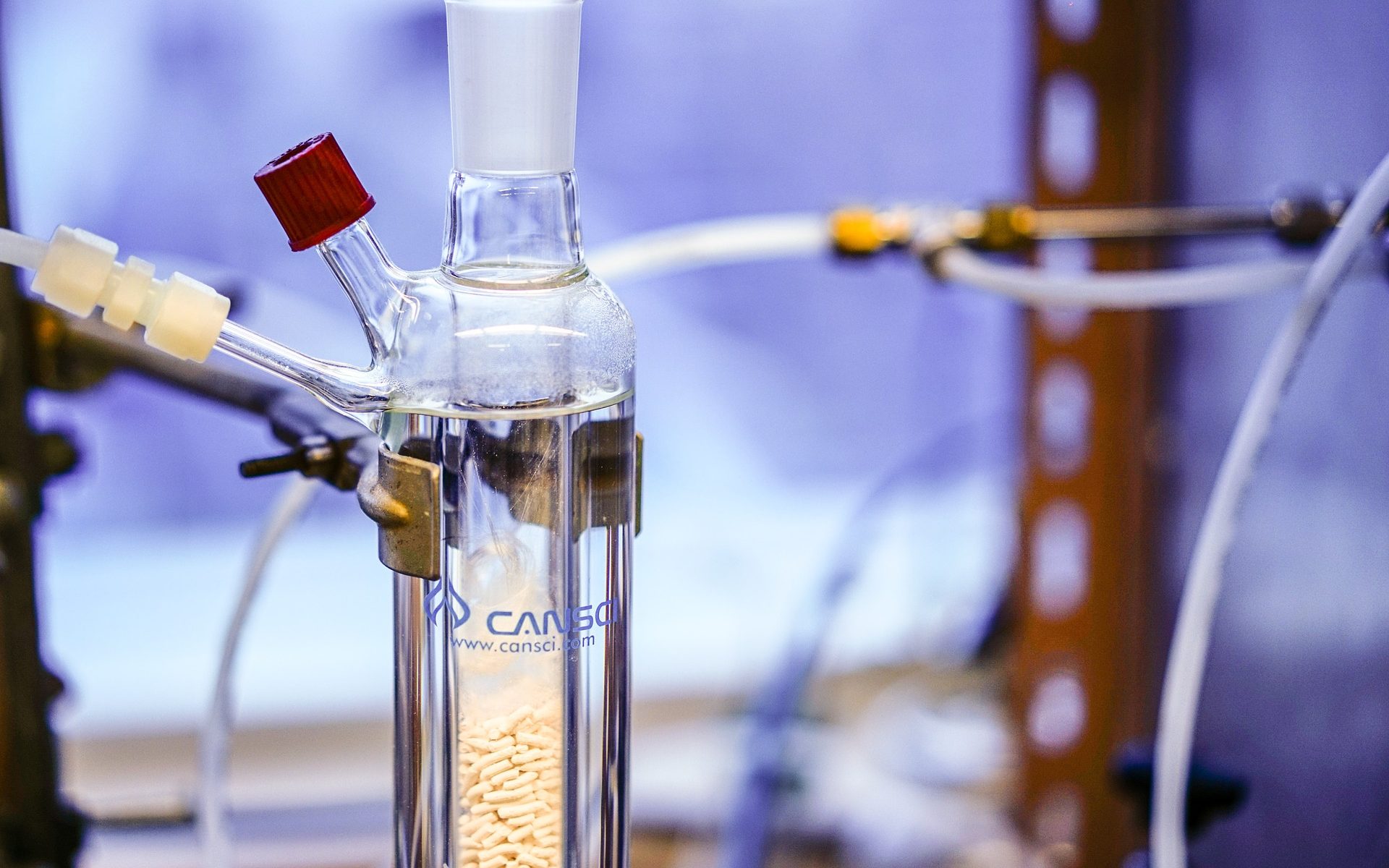
So, are you looking for the best chemistry topics on the Internet? The good news is that you have arrived at the right place. In this blog post, we will explain why you need to find the best topic in chemistry. You will quickly understand that you have a lot to gain just by writing your next paper on an interesting, unique topic. And the good news doesn’t stop here. You will be thrilled to find a list of 100 topics (including AP chemistry topics) right here. Of course, you can use any of our topics. The list is updated periodically to help as many students as possible with their search for chemistry research paper topics.
Do You Need an Interesting Chemistry Topic?
OK, but why do you need to find the best topics in chemistry? Why can’t you just pick one of the first topics that pop up in Google? The answer to these questions is pretty simple actually. Professors want to see something new. They want to see that you have dedicated at least some time and effort to finding an original topic. Your professors see the same chemistry projects topics over and over again. Frankly, they are bored of reading the same essays every time.
We know that finding good chemistry presentation topics can be a daunting task. This is why we have asked our professional writers to put together a list of topics for you. Feel free to use any of the topics below and nail that A!
Always Choose the Latest Chemistry Paper Topics
There are hundreds of chemistry related topics on the Internet. However, not all topics are created equal. The truth is that your professor will appreciate an original topic that is also about something current. In other words, you should do your best to find topics in current chemistry whenever possible. Just go through some of the latest journals and articles about chemistry. You will quickly find out everything about the latest breakthroughs. Also, fresh topics are excellent to use as interesting chemistry topics for presentation. You’ll awe your professor from the second he sees the title of your essay – guaranteed.
The Benefits of Finding Great Chemistry Topics for Research
Finding great chemistry topics for project or for essays has plenty of benefits. Here are just some of the benefits of writing your next paper on one of our excellent topics:
- Your professor will have something new to read. The mere sight of the title should make him or her want to read more.
- You will get bonus points for originality. Professors most often award bonus points to papers that stand out from the rest.
- You will stand out of the crowd because your essay will be different. Your classmates will most likely write about the same old topics.
- You can show your professor that you’ve really dedicated a lot of effort to finding a great topic. He or she won’t know that you’ve picked one of our topics.
Read Our List of 100 Chemistry Topics
Best chemistry research topics.
- Explain photoelectrochemical water oxidation.
- Are food dyes bad for you?
- Importance of silicon dioxide for solar energy companies.
- An in-depth look at Dalton’s Law of Partial Pressures.
- A thorough examination of Electron Dot Models.
General Chemistry Topics
- How can whisky be diluted?
- Uses of Small Molecule Accurate Recognition Technology (SMART).
- Analyze the stability of nucleic acids.
- What is snow pollution and why is it so dangerous?
- The various isomerism types.
Organic Chemistry Topics
- What are nucleophiles?
- How do globular proteins appear?
- What are electrophiles?
- Is phenol an acid or not?
- Analyze and explain aniline dyes.
High School Chemistry Topics
- What is Hordenine in beer?
- Analyze the positive effects of food dyes.
- The Sun: burning without oxygen.
- How can air freeze?
- Describe nanoreactors in chemistry.
Interesting Chemistry Topics
- What are Lewis Structures?
- The effect of sulfuric acid on organic materials.
- The photocatalysis effect in 3D printing.
- Sodium Azide and its use in airbags.
- An in-depth look at the Californium element.
- How does a bomb calorimeter work?
Chemistry IA Topics
- Enzymatic reactions: Explaining the kinetics behind them
- How do iodine values change in cooking oils?
- Is the pH in your mouth affected after brushing your teeth?
- How can we reduce caffeine in coffee?
- Calorimetry: Most common sources of error
- Why are aspirin tablets coated? (hydrolysis of aspirin)
Chemistry Research Topics for High School Students
- How is alcohol metabolized in our bodies?
- How are calories in food counted?
- The dangers of chemical reactions.
- How are chemical adhesives created?
- Properly balancing chemical equations.
Cool Chemistry Topics
- Calculating the concentration of active substance in a medicine.
- Explain the thermodynamics concept.
- How to use a spectrometer to determine the speed of a reaction.
- Using the volume of gas to calculate absolute zero.
- When does lipase denaturation take place?
Physical Chemistry Topics
You can also check out our physics topics .
- What is thermochemistry?
- The importance of spectroscopy.
- Define solid-state chemistry.
- What are chemical kinetics?
- Advantages of photochemistry.
Argumentative Chemistry Topics
- The best way to cook an egg.
- Testosterone is men’s drug of choice.
- Homeopathic treatments and their side effects.
- Is synthetic better than natural in medicine?
- Aromatherapy is not useless.
Inorganic Chemistry Topics
- Antibiotics and they negative effect on your health.
- Explain covalent bonding.
- Common inorganic spectroscopic problems.
- Analyzing ions in solution.
- What is the molecular orbital theory?
Chemistry Project Topics
- Analyzing arsenic concentrations in water.
- Why is cyanogen bromide forbidden in health care centers?
- Is a pH of 5.5 really neutral?
- Can we have a fire in space?
- A thorough analysis of acids.
Controversial Chemistry Topics
- The effects of alcohol on the human brain.
- What makes drugs so dangerous?
- Can a love elixir be made?
- Describe food fraud.
- Differences between generic medicine and original medicine.
Chemistry Topics for Presentation
- The reaction pathways of radicals.
- Let’s analyze the architecture of matter.
- What is entropy?
- Defining aromaticity.
- How an ion-selective electrode works.
Innovative Chemistry Research Topics
- Explain gel electrophoresis.
- What is the fat freezing point?
- How does biological nitrogen fixation work?
- Analyzing symmetry in chemistry.
- NMR spectroscopy and its advantages.
Environmental Chemistry Topics
- Heavy metals are contaminating our environment.
- The effects of plastics on the oceans.
- What causes acid rain?
- Is organic food actually safe to be consumed?
- Detecting traces of heavy metals in plants.
Chemistry Regents Topics
- How do two atoms of fluorine become one molecule?
- Describe the wave-mechanical model of the atom.
- What happens when the electron moves from a higher to a lower energy state?
- Elements with properties similar to cesium.
- Analyzing the kinetic molecular theory.
Chemical Engineering Topics
- How is gas artificially colored?
- How is dry ice obtained?
- How do batteries work?
- How do vitamins help the human body?
Chemistry Research Topics for Undergraduates
- The most dangerous compounds in food dyes.
- Here is how an allergy develops.
- Is Ibuprofen really as safe as some claim it to be?
- An in-depth look at surface tension and its applications.
- Nanophotonics and their military uses.
Easy Chemistry Topics
- What are ionic crystals?
- How are pearls created?
- Can diamonds be grown in the lab?
- How does a nanofiltration system work?
Chemistry Essay Topics for Happy Students from AcademicHelp.net
If you don’t think you can handle the chemistry essay on your own, here are some offbeat titles for your academic chemistry paper:
- Analysis of the Chemicals that Cause Particular Food Allergies
- Plastic Packaging – a Look at Its Effect on the Environment
- An Understanding of the Diet Soda Chemistry and How They Affect the Bone Structure
- Deficiency of Vitamins in Human Bodies – a Look at Its Causes and Consequences
- Analysis of the Use of Sugars for Batteries
- Acid Rain in Your Neighborhood and Its Effects on the Plans
- Plastics Packaging and Its Influence on Food
- An Evaluation of the Chemical Composition of Lava Rocks
- Understanding the Chemistry Behind Liquid Bandages
- Pheromones and Their Effect on Humans
- How Chemistry Brings Alterations to the World
- Is Chemistry Involved in Generic Medicines?
- The Chemistry Behind Dental Fillings
- Wastewater Treatment
- Molecularly Imprinted Polymers
- Counter Electrodes Used for Solar Cell Applications
- Branded Drugs vs. Generic Drugs
- Different Preservatives Used in Carbonated Drinks
- Plant Dyes in Dye-Sensitized Solar Cell Applications
- What Types of Chemical Compounds Trigger the Majority of Human Allergies?
Chemistry Extended Essay Topics & Original Samples
We can provide you with a sample list of titles for your essay, research paper or dissertation. College students and undergraduates use our service on a daily basis for their writing tasks. Our writers will help you with a custom chemistry project of any difficulty level due to their educational level.
At AcademicHelp.net, we will check the structure of your essay, the thesis idea, and the subject. They will see if your analysis and research, the format, organization, and review meet academic requirements. Got stuck? Use a quick messaging system to get in touch with us 24/7.
If the topic has not been given for your organic or non-organic chemistry research paper, select some subject matter from the list we provided. Every topic on our website gives you a good room to find relevant research material and propose insights that showcase your ability to think critically and analyze. If you can’t do it on your own, we have dedicated writers and editors who can do that for you at a reasonable price.
Our writers know how to apply a scientific format for your paper which is important for creating reference pages and referencing source material. Our experts will help you to find out if the data you gather for your research by using libraries or online resources is genuine. We’ll keep an eye on if you’re writing down all the necessary reference information so as to not plagiarize and attribute everything you use.
Chemistry Essay Topics for High School & College Levels
Your essay may involve formulas and calculations. That is why it’s better to approach our experts, who will make sure you know how to place them in your research paper correctly, how to label them, and how to give necessary comments in your chemistry essay that further them. Your chemistry paper can be designed from your notes into a good outline so that you can build up a well-structured framework. This normally contains an introduction paragraph, main paragraphs that detail every aspect of your thesis, and a fine conclusion that entails a references page. If you’re not sure your structure is strong, our writers can check that with ease.
Once our writers receive your draft, they will place all the chemistry essay parts together, revise, and reread it for some editing. We will check if your grammar, spelling and sentence structure are correct and the body parts are transitioned in a logical manner continuing to connect to your thesis statement.
Writing in the field of chemistry is kind of similar to other disciplines because your chemistry paper should show a clear purpose and explanation why you carry out this research, your thesis statement (or main idea) that identifies a particular problem to resolve, and any other information. Our writers will show you where you have to include the appropriate evidence in your chemistry paper, such as tables, graphs, and figures in order to support your statement. But first and foremost, start with offered chemistry essay topics as you need to pick the most outstanding one and make your whole coursework an unprecedented success.
Remember Me
What is your profession ? Student Teacher Writer Other
Forgotten Password?
Username or Email

- Customer Reviews
- Extended Essays
- IB Internal Assessment
- Theory of Knowledge
- Literature Review
- Dissertations
- Essay Writing
- Research Writing
- Assignment Help
- Capstone Projects
- College Application
- Online Class
Chemistry Extended Essay: Definition, Criteria, And Topics
by Antony W
October 30, 2023
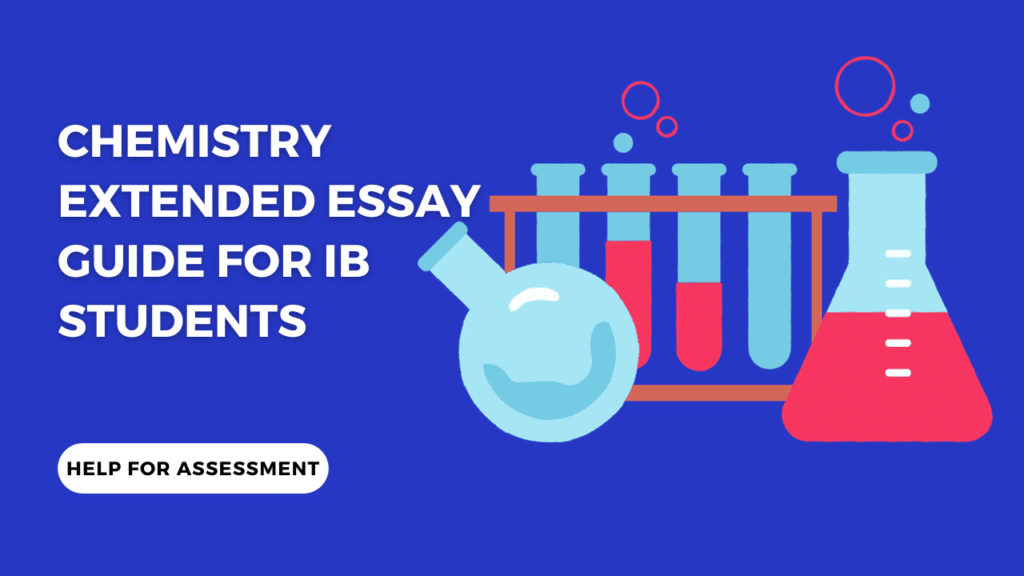
This is the complete guide on IB Chemistry extended essay.
Whether you’re currently considering a subject to write your EE on or you’ve already made up your mind that you’ll write an extended essay on Chemistry, you’ll find this post useful.
What’s a Chemistry Extended Essay?
An extended essay in Chemistry offers you the chance to study a specific area of the environment’s components.
Within a more broad set of research standards, these lengthy, 4,000-word essays must highlight a particular aspect in the Chemistry subject.
The result of the study should be a logical and organized piece of writing that effectively tackles a certain subject or research question and reaches a specific, and ideally personal, conclusion.
What’s the Assessment Criteria for Chemistry EE?
The following is the assessment criteria used for Chemistry extended essay:
Criterion A: Research Question
The research question of your Chemistry extended essay must be distinct and narrowly focused, relevant to the field of study, and centered specifically on the subject.
Criterion B: Introduction
The objective of the introduction is to contextualize the research topic. Present an underlying chemical theory required to comprehend how the research issue arose.
Criterion C: Investigation
For non-experimental essays, explain how you chose the data. Differentiate between primary sources and demonstrate an understanding of the reliability of each.
For experimental tasks, provide sufficient information to allow independent researchers to replicate the experiment if necessary.
You should make it clear which experiments you have devised from scratch and which ones you have modified from existing methodologies.
Criterion D: Knowledge of the Topic
You must demonstrate a comprehensive understanding of the chemistry behind the setting of your research issue and subsequent study.
You don’t have to explain the fundamental chemistry covered in the chemistry course, but you should demonstrate that you have a clear understanding of the necessary concepts and can appropriately apply them.
Criterion E: Reasoned Argument
You should be aware of the necessity to provide a developing argument in the body of your writings.
Consideration and comparison of diverse methodologies and methods directly pertinent to the research issue will almost likely be a component of a convincing argument in chemistry.
Criterion F: Application Analysis & Skill Evaluation
Demonstrate a comprehensive comprehension of the dependability of the facts utilized to support the case. Identify inadequate experimental design or systemic flaws and mention the extent of physical data uncertainty.
Models should allow for approximations, and there should be a proper scrutinizing of all assumptions. Wherever feasible, use secondary sources or direct computations to verify the quality of sources accessed or data provided.
Criterion G: Language Choice
Use the correct chemistry language and nomenclature consistently and efficiently throughout the essay.
Criterion H: Conclusion
The conclusion must be consistent with the stated argument and should not just repeat information from the introduction or include new or irrelevant arguments.
Criterion I: Formal Presentation
Stick to the structure (or format) recommended for the Chemistry Extended Essay.
Criterion J: Abstract
The abstract is evaluated based on the clarity with which it provides a summary of the study and essay, not on the quality of the research question, argument, or conclusions.
Criterion K: Holistic Judgement
Make sure you attend all the extended essay reflections and have your supervisor comment on your EE.
How to Choose IB Chemistry EE Topics
Chemistry is the study of the composition, classification, and change of substances. Therefore, an extended essay in chemistry should include chemical principles and theory, and it should underline the core character of chemistry, which is the study of matter and its transformations.
1. Pick a Topic Specific to Chemistry
Although the same evaluation criteria apply to all extended essays, it is essential that the emphasis of the extended essay in this subject be on chemistry and not on another subject. In other words, the topic you choose for a chemistry extended essay must provide a chemistry-based approach treated from a chemical standpoint.
2. Your Topic Should Be Very Specific
The topic’s breadth and accompanying research should allow for the consideration of all criteria.
An excellent subject is one that focuses on a single research question and adequately addresses the issue within the 4,000-word limit.
Perhaps the most crucial component is your ability to provide an in-depth analysis of the issue.
Broad or complex topics will not allow you to discuss opposing ideas and theories or produce an in-depth personal analysis within the word limit.
3. Avoid Topics Linked to Health and Safety Concerns
Some topics may not be acceptable for examination due to safety concerns. For example, you should avoid experiments that involves the use of poisonous or hazardous chemicals, carcinogenic compounds, or radioactive materials unless suitable safety equipment and competent supervision are available.
Other topics may not be appropriate since there’s already a documentation of the outcome. Such topics don’t leave room for personal involvement.
Free Features

Need help to complete and ace your essay? Order our writing service.
Get all academic paper features for $65.77 FREE
How Should You Treat Your Chemistry Extended Essay Topic?
You can base your Chemistry extended essay on literature, theoretical models, or empirical evidence.
Regardless of the category or combination of categories you choose, you must verify that adequate data is available for review and you can explore the issue by utilizing locally accessible resources.
If you choose to write an extensive essay based on literature or surveys, you must ensure the essay’s chemical foundation is evident.
Since chemistry is an experimental discipline, you are highly encouraged, but not required, to do experiments as part of their studies. Before beginning experimental work, you should conduct background study on the topic to conduct your research within the right framework.
If you include experiments in your work, you’ll need to go a step further to provide a clear and succinct description of the experiment. You should explicitly specify whether you devised the experiment yourself, or provide the source of an existing experiment technique you utilized and explain how you changed and enhanced it.
Examples of the Best Chemistry Extended Essay Topics
The following are examples of some of the best Chemistry extended essay topics for inspiration and direction:
- What effect does acid rain have on the trees, plants, and public gardens in your neighborhood?
- Analyze the chemical composition of various types of lava and magma rocks from across the world.
- Examine the short- and long-term consequences of vitamin deficiency in people.
- What kinds of chemical components are responsible for the majority of food allergies?
- Discuss the chemical changes that occur in aging human bodies.
- What effect do pesticides have on soil runoff and what do the facts say should be done?
- Examine the chemistry of MDMA and other “nightclub” or designer drugs in users of various ages.
- Analyze the impact of radon and explain why it poses such a threat to human health.
- Examine how chemical experiments and the knowledge gained from them have altered the globe.
- How has the usage of fluoride in the community’s water supply benefited and harmed the community?
- Discuss the chemistry involved when sugar is used as a battery source.
- Can you explain the rationale behind capturing and using carbon dioxide?
- What chemical difference does choosing organic foods vs pesticide-treated foods have on our bodies?
- Analyze the chemical changes that occur when various culinary materials are used to prepare various dishes.
- Analyze the substances involved in the occurrence of various food allergies.
- Discuss the distinctions between the various types of milk and explain it compares to the milk of other animals.
- What impact have big cosmetics manufacturers made on our contemporary understanding of chemistry?
- What type of chemistry is involved in making generic medications cheaper than brand-name pharmaceuticals?
- Examine the chemical components of diet drinks and their impact on the human body.
Chemistry EE Checklist
Your Chemistry extended essay is no doubt going to be a challenging assignment, but you can score a 34 nonetheless if you understand and give what your IB teacher is looking for.
The table below is a summary of a checklist you can use to score top marks for the assignment:
If you observe all the points on the checklist above, there’s no reason why you should fail your Chemistry extended essay assignment.
About the author
Antony W is a professional writer and coach at Help for Assessment. He spends countless hours every day researching and writing great content filled with expert advice on how to write engaging essays, research papers, and assignments.
Your browser is not supported
Sorry but it looks as if your browser is out of date. To get the best experience using our site we recommend that you upgrade or switch browsers.
Find a solution
- Skip to main content
- Skip to navigation

- Back to parent navigation item
- Collections
- Sustainability in chemistry
- Simple rules
- Teacher well-being hub
- Women in chemistry
- Global science
- Escape room activities
- Decolonising chemistry teaching
- Teaching science skills
- Post-lockdown teaching support
- Get the print issue
- RSC Education

- More from navigation items
Alkenes and an introduction to organic reaction mechanisms
By Dan Beech 2024-06-04T08:22:00+01:00
- No comments
Discover the reactivity and reactions of alkenes with your 14–16 students with these classroom ideas and activities
We don’t directly use alkenes in our everyday lifes, but they are important in the synthesis of everyday materials. Alkenes are used to synthesise alcohols, plastics, lacquers and detergents. They make possible the production of polythene bags, buckets and bowls, for example.
What students need to know
The alkenes are a homologous series of hydrocarbons with the general formula C n H 2n . Alkenes are unsaturated because they contain a carbon–carbon double bond, which can react with a variety of other substances. They are obtained from the petroleum industry through a process called cracking and are the main feedstock compounds in the synthesis of polymers, alcohols and halogenoalkanes. At 14–16, students are just beginning to learn about organic chemistry. However, it is important that they have a solid foundation before they move onto post-16 education, when they will study mechanisms to help explain how these reactions occur.
Common misconceptions
Students can develop some misconceptions based on how we teach organic chemistry at 14–16. For example, we often draw organic molecules with the atoms in parallel or perpendicular lines. However, the shapes of molecules, and hence the bond angles, are important to explain reactivity. For example, ethene is a trigonal planar molecule and has bond angles of approximately 120°. At post-16 we use the ‘valence shell electron pair repulsion’ theory to predict the bond angles and hence shapes of molecules. Essentially, bonding pairs and lone pairs of electrons repel each other. Pairs of electrons in the outer shell arrange themselves to be as far apart as possible to try to minimise repulsion – causing different bond angles and hence molecular shapes.
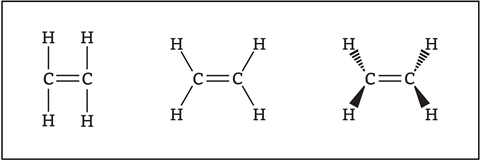
Figure 1 : from left to right: ethene as shown in some 14–16 resources; ethene with more accurate bond angles; and ethene with bonds going into and coming out from the page
My students use Molymod® molecular model sets to build simple organic molecules, which helps them see these in three dimensions with more realistic bond angles.
Suggestions for your teaching
Learning the basics of alkenes and their chemistry can take some time to master, but with practice all students can have a solid understanding of the fundamental ideas.
- Explain that most reactions involve two or more steps — make sure that students understand that they are learning just a simple model.
- Mention that how we draw organic molecules isn’t necessarily an accurate representation of their 3D structure. We simplify to help with learning the different families of compounds.
- Use some post-16 terms, such as electrophilic addition, when discussing why bromine water goes from orange to colourless.
- Use mini whiteboards to check students can accurately draw displayed formulas of alkenes and their addition products.
- Have students map the organic reactions of the alkenes as a starting point for organic synthesis to set them up well at post-16.
Ideas for the classroom
Introducing isomers.
When drawing the displayed formula of butene, students may come across two different formulas. These are isomers, compounds with the same molecular formula but with the atoms bonded in different orders. Students don’t need to know the names but-1-ene and but-2-ene at 14–16. However, it will be useful to practise drawing the displayed formulas of both.
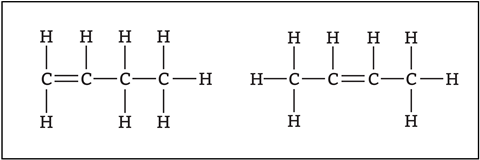
Figure 2 : displayed formula of but-1-ene (left) and but-2-ene (right)
Organic reactions mechanisms
At 14–16, students will look at how alkenes react with steam, halogens and hydrogen. The overall reaction may lead to the misconception that all chemical reactions happen in one step (figures 3 and 4).
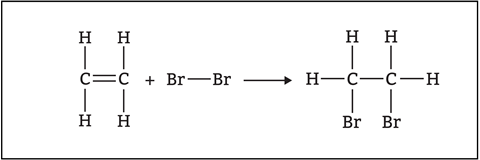
Figure 3 : reaction of ethene with bromine to form 1,2-dibromoethane at 14–16
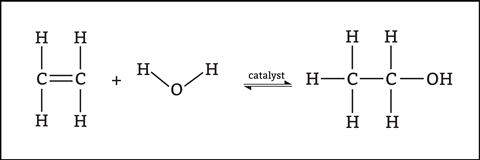
Figure 4 : reaction of ethene with steam to form ethanol at 14–16
In some reactions, reactants are converted into products in one step (concerted reactions). However, it is more common for reactions to occur in two or more steps (stepwise reactions). In these reactions, unstable reactive intermediates form, which then react to form products in subsequent steps.
At post-16, students will study organic reaction mechanisms, which is the step-by-step guide to how reactants become products. Mechanisms reveal which bonds break, where a reactant attacks and in what order the various steps of a reaction occur.
Students will learn about curly arrows, reactive intermediates, electrophiles and nucleophiles. Some of these ideas are discussed here.
Curly arrows
In organic reactions, covalent bonds are broken and made. We show the movement of pairs of electrons as curly (curved) arrows with a full head. When there is movement of more than one pair of electrons in a reaction step, the arrows tend to chase each other around the structures
- The tail of a curly arrow shows where electrons start .
- The arrowhead shows where electrons end up .
The tail of a curly arrow shows where electrons start, and the arrowhead shows where electrons end up.
Nucleophiles and electrophiles
These are chemical species that donate electron pairs (nucleophiles) or accept electron pairs (electrophiles). There is a nice bit of literacy here, teaching the etymology of words – nucleo- for nucleus or positive, electro- related to electrons hence negative, and -phile for loving.
Starting mechanisms
The chemical test for unsaturation — addition of bromine water — is a powerful demonstration to show addition reactions in action. If you have a group of students who aren’t satisfied with just learning the test and observation, this electrophilic addition reaction mechanism may interest them.
Essentially, electrophilic addition is a reaction in which the double bond can be attacked by electrophiles. One part of the alkene double bond breaks and forms a new bond between a carbon and a bromine atom. To allow this, the bond in the Br 2 molecule must also break. This leads to the formation of a positive carbon atom and a negative bromine atom that react together to form a second carbon—bromine bond.
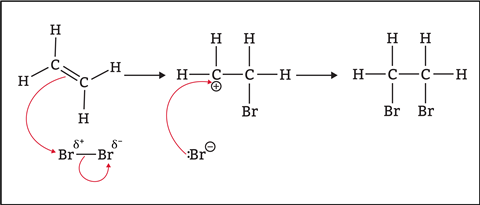
Figure 5 : electrophilic addition reaction between ethene and bromine to form 1,2-dibromoethane at post-16 level. The δ ± symbols show the partial positive and negative charge on the bromine atoms. The molecule in the centre is the reactive intermediate
Be clear with the students that there is a lot more detail to learn, and other addition reactions can be more complex. For example, how does the double bond break? Why are there partial charges in the bromine molecule? And how does phosphoric acid catalyse the hydration reaction? We are only lifting the lid a little here.
Checking for understanding
After alkene reactions, students go on to study alcohols, carboxylic acids and esters. At the end of this series of lessons, provide students with an organic reactions map that shows all the organic reactions encountered so far. Students can practise by filling in a blank version of the map. Maps provide a good way to show the links and reactions between organic molecules and consolidate the basics before students move onto some serious organic chemistry at post-16.
Resources for your classroom
- Use the Alkenes worksheet to give learners context for this topic and use the flexible questions for assessment.
- Follow up with ideas from this additional worksheet that provides assessment questions on the reactions of alkanes and alcohols .
- Use the ideas and resources in this article on teaching curly arrows at post-16 to help your students master mechanisms.
- Help students understand electrical changes with this article on drawing reaction mechanisms .
- Use the Alkenes worksheet to give learners context for this topic and use the flexible questions for assessment: rsc.li/3wLtgnw
- Follow up with ideas from this additional worksheet that provides assessment questions on the reactions of alkanes and alcohol: rsc.li/3VboObh.
- Use the ideas and resources in this article on teaching curly arrows at post-16 to help your students master mechanisms: rsc.li/3K8lQho
- Help students understand electrical changes with this article on drawing reaction mechanisms: rsc.li/3yrqwfv
Dan Beech is a science teacher and subject leader for science at Beamont Collegiate Academy
- Organic chemistry
- Reactions and synthesis
Related articles

Fractional distillation and hydrocarbons | Review my learning worksheets | 14–16 years
By Lyn Nicholls
Identify learning gaps and misconceptions with this set of worksheets offering three levels of support

How to teach extraction of metals at 14–16
2024-04-09T07:20:00Z By Niall Begley
Solidify learners’ understanding of extraction processes with these tips, misconception busters and teaching ideas

Paracetamol book | Using thin-layer chromatography to investigate the reactions
In this activity you investigate the purity and identity of your laboratory prepared samples of nitrophenol or paracetamol using thin-layer chromatography
No comments yet
Only registered users can comment on this article..
- Contributors
- Print issue
- Email alerts
Site powered by Webvision Cloud
Advertisement
Supported by
Climate Change Added a Month’s Worth of Extra-Hot Days in Past Year
Since last May, the average person experienced 26 more days of abnormal warmth than they would have without global warming, a new analysis found.
- Share full article

By Raymond Zhong
Over the past year of record-shattering warmth, the average person on Earth experienced 26 more days of abnormally high temperatures than they otherwise would have, were it not for human-induced climate change, scientists said Tuesday.
The past 12 months have been the planet’s hottest ever measured, and the burning of fossil fuels, which has added huge amounts of heat-trapping gases to the atmosphere, is a major reason. Nearly 80 percent of the world’s population experienced at least 31 days of atypical warmth since last May as a result of human-caused warming, the researchers’ analysis found.
Hypothetically, had we not heated the globe to its current state , the number of unusually warm days would have been far fewer, the scientists estimated, using mathematical modeling of the global climate.
The precise difference varies place to place. In some countries, it is just two or three weeks, the researchers found. In others, including Colombia, Indonesia and Rwanda, the difference is upward of 120 days.
“That’s a lot of toll that we’ve imposed on people,” said one of the researchers who conducted the new analysis, Andrew Pershing, the vice president for science at Climate Central, a nonprofit research and news organization based in Princeton, N.J., adding, “It’s a lot of toll that we’ve imposed on nature.” In parts of South America and Africa, he said, it amounts to “120 days that just wouldn’t be there without climate change.”
Currently, the world’s climate is shifting toward the La Niña phase of the cyclical pattern known as the El Niño-Southern Oscillation. This typically portends cooler temperatures on average. Even so, the recent heat could have reverberating effects on weather and storms in some places for months to come. Forecasters expect this year’s Atlantic hurricane season to be extraordinarily active, in part because the ocean waters where storms form have been off-the-charts warm.
The analysis issued Tuesday was a collaboration between several groups: Climate Central, the Red Cross Red Crescent Climate Centre and World Weather Attribution, a scientific initiative that examines extreme weather episodes. The report’s authors considered a given day’s temperature to be abnormally high in a particular location if it exceeded 90 percent of the daily temperatures recorded there between 1991 and 2020.
The average American experienced 39 days of such temperatures as a result of climate change since last May, the report found. That’s 19 more days than in a hypothetical world without human-caused warming. In some states, including Arizona and New Mexico in the Southwest and Washington and Oregon in the Northwest, the difference is 30 days or more, a full extra month.
The scientists also tallied up how many extreme heat waves the planet had experienced since last May. They defined these as episodes of unseasonable warmth across a large area, lasting three or more days, with significant loss of life or disruption to infrastructure and industry.
In total, the researchers identified 76 such episodes over the past year, affecting 90 countries, on every continent except Antarctica. There was the punishing hot spell in India last spring. There was the extreme heat that worsened wildfires and strained power grids in North America, Europe and East Asia last summer. And, already this year, there has been excessive warmth from Africa to the Middle East to Southeast Asia .
Raymond Zhong reports on climate and environmental issues for The Times. More about Raymond Zhong
Our Coverage of Climate and the Environment
News and Analysis
Over the past year of record-shattering warmth, the average person on Earth experienced 26 more days of abnormally high temperatures than they otherwise would have, were it not for human-induced climate change, scientists said.
The Biden administration laid out for the first time a set of broad government guidelines around the use of carbon offsets in an attempt to shore up confidence in a method for tackling global warming that has faced growing criticism.
A group of health experts, economists and U.S. government lawyers are working to address a growing crisis: people dying on the job from extreme heat. They face big hurdles .
Adopting Orphaned Oil Wells: Students, nonprofit groups and others are fund-raising to cap highly polluting oil and gas wells abandoned by industry.
Struggling N.Y.C. Neighborhoods: New data projects are linking social issues with global warming. Here’s what that means for five communities in New York .
Biden Environmental Rules: The Biden administration has rushed to finalize 10 major environmental regulations to meet its self-imposed spring deadline.
F.A.Q.: Have questions about climate change? We’ve got answers .
share this!
June 3, 2024
This article has been reviewed according to Science X's editorial process and policies . Editors have highlighted the following attributes while ensuring the content's credibility:
fact-checked
Study presents new flexible crystals for optical tuning with multiple deformation options
by KeAi Communications Co.
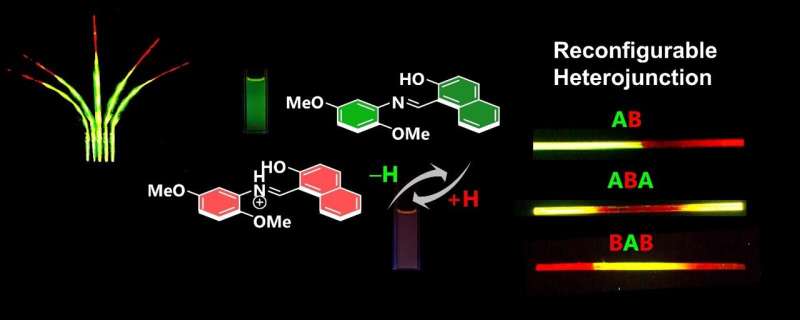
In recent years, significant strides to enhance the functionality and adaptability of devices have been taken in the field of optoelectronics. Now, a team of scientists from State Key Laboratory of Supramolecular Structure and Materials, College of Chemistry, Jilin University, have reported a breakthrough in the development of organic flexible optoelectronic devices using acicular organic crystals.
The crystals , which range from micro- to centimeter-scale in length, have been used as media for transducing optical signals , functioning as active or passive optical waveguides. By integrating the dynamic adaptability of crystals with optical waveguides, the researchers have opened new possibilities for creating crystal-based devices.
"We introduced a Schiff base crystal with remarkable properties, including integrated elastic-bending, plastic-twisting, and acid-bending deformations, alongside protonation-induced crystal acidichromism," said Hongyu Zhang, corresponding author of the study.
"This unique combination allows the emission color of a single crystal to be selectively and reversibly controlled, varying between green (554 nm) and deep red (659 nm) when exposed to protonic acid vapor. This color change creates various block heterojunction structures that can be easily identified by their distinct colors and emissions."
The researchers emphasized that the Schiff base they prepared combines multiple flexibilities and optical output tunability. The crystals exhibit excellent bending elasticity and twisting plasticity, which can be independently controlled.
"Notably, the heterojunction structures, formed through partial acid-fuming of slender crystals, display an erasing-rewriting feature, allowing for the reconfigurable regulation of emission outputs," adds Zhang. "This reconfiguration capability enhances the practicality of the crystals in developing flexible optical tuners with a wide range of adjustable output signals."
The compatibility of the crystals' mechanical properties and acidichromism further enhance their functionality. The study's results, published in the journal Wearable Electronics , demonstrate the potential of designing reconfigurable optical structures using organic crystals, paving the way for their application in lightweight and wearable electronic devices.
Provided by KeAi Communications Co.
Explore further
Feedback to editors

Scientists identify 'missing piece' required for blood stem cell self-renewal
4 minutes ago

New method for creating biomimetic membranes offer solutions for energy, desalination and medicine
6 minutes ago

Boeing launches NASA astronauts for the first time after years of delays
14 minutes ago

Study shows banning false information traffickers online can improve public discourse
22 minutes ago

New study finds many of the world's most threatened species lack evidence of sufficient conservation efforts
30 minutes ago

Large-scale study reveals functional diversity of DNA transposons and expands genome engineering toolbox
40 minutes ago

Toward testing the quantum behavior of gravity: A photonic quantum simulation
44 minutes ago

Food security: Researchers discover gene for resistance against a disease that ravages rice and wheat crops
50 minutes ago

Researchers draw inspiration from ancient Alexandria to optimize quantum simulations
52 minutes ago

Unknown species discovered on deep-sea expedition
Relevant physicsforums posts, hydrochloric acid, naoh, and english ivy.
46 minutes ago
How do you visualise the atomic orbitals?
May 31, 2024
Why isn't bond dissociation energy/bond enthaply measured in Newtons?
May 30, 2024
Oxygen dip in ionization energy trend
May 24, 2024
Most dangerous chemicals?
May 23, 2024
Why do paired electrons have no magnetic field lines?
May 22, 2024
More from Chemistry
Related Stories

Researchers use liquid crystals to control polarization inside laser-written waveguides
Mar 4, 2024

Researchers develop first-of-its-kind woven material made entirely from flexible organic crystals
Nov 28, 2023

Organic crystals twist, bend, and heal
Jun 18, 2018

Stabilized blue phase crystals could lead to new optical technologies
Nov 2, 2021

A novel liquid crystal-based tunable dielectric metasurface
Apr 1, 2024

Liquid crystals create easy-to-read, color-changing sensors
Jul 10, 2020
Recommended for you

Study resolves decades-long debate on cathodic corrosion protection

Observing ultrafast photoinduced dynamics in a halogen-bonded supramolecular system
23 hours ago

Enhancing green hydrogen production with robust carbon fabric electrocatalysts
Jun 4, 2024

Experiments in weightlessness isolate classic diffusion phenomenon

Scientists develop 'X-ray vision' technique to see inside crystals
Jun 3, 2024

Altered carbon points toward sustainable manufacturing
Let us know if there is a problem with our content.
Use this form if you have come across a typo, inaccuracy or would like to send an edit request for the content on this page. For general inquiries, please use our contact form . For general feedback, use the public comments section below (please adhere to guidelines ).
Please select the most appropriate category to facilitate processing of your request
Thank you for taking time to provide your feedback to the editors.
Your feedback is important to us. However, we do not guarantee individual replies due to the high volume of messages.
E-mail the story
Your email address is used only to let the recipient know who sent the email. Neither your address nor the recipient's address will be used for any other purpose. The information you enter will appear in your e-mail message and is not retained by Phys.org in any form.
Newsletter sign up
Get weekly and/or daily updates delivered to your inbox. You can unsubscribe at any time and we'll never share your details to third parties.
More information Privacy policy
Donate and enjoy an ad-free experience
We keep our content available to everyone. Consider supporting Science X's mission by getting a premium account.
E-mail newsletter
The Hidden Costs of Raising the Minimum Wage
This essay discusses the potential negative consequences of raising the minimum wage. It highlights concerns such as increased unemployment, particularly among low-skilled workers, and the potential for higher inflation as businesses pass on labor costs to consumers. The essay also examines how a higher minimum wage might lead to more automation, reducing job opportunities for low-skilled workers. Additionally, it addresses the issue of regional economic differences, where a uniform wage increase may not suit all areas, and the possible reduction in non-wage benefits as employers adjust to higher payroll expenses. The impact on small businesses and startups, which may struggle to cope with increased labor costs, is also considered.
How it works
Raising the minimum wage is a hot topic these days, and it’s easy to see why. On the surface, it seems like a straightforward way to help low-income workers make a decent living. More money in people’s pockets means a better standard of living, right? Well, the reality is a lot more complicated. While the intention behind increasing the minimum wage is noble, there are some serious downsides that we need to consider. These potential drawbacks often get overlooked in the broader debate, but they are crucial for understanding the full impact of such a policy change.
First off, let’s talk about job loss. This is probably the most immediate and visible effect of raising the minimum wage. When the cost of labor goes up, businesses, especially smaller ones, often struggle to keep up. Higher wages mean higher expenses, and employers might have to cut jobs, reduce hours, or put a freeze on hiring to balance their budgets. This issue is particularly pronounced in industries that rely heavily on low-wage workers, such as retail, food service, and hospitality. So, while some workers might see a pay raise, others could find themselves out of a job altogether. Imagine a small family-owned diner that’s already operating on thin margins. An increase in the minimum wage could force the owners to let go of a few employees or, worse, close their doors permanently. This scenario not only hurts the workers but also impacts the local community that relies on these small businesses.
Inflation is another critical issue tied to raising the minimum wage. When businesses face higher labor costs, they often pass these costs on to consumers in the form of higher prices. This phenomenon, known as cost-push inflation, can erode the purchasing power of the wage increase, leaving workers no better off than before. For instance, if a fast-food chain raises its wages, the cost of a burger might go up, affecting everyone who buys it, including the workers themselves. This inflationary cycle can ripple through the economy, impacting not just low-wage workers but all consumers, particularly those on fixed incomes. So, while a higher minimum wage might seem like a win at first, it can lead to higher living costs that negate the benefits.
Then there’s the issue of automation. As labor costs rise, businesses have a greater incentive to invest in technology that can perform tasks more cheaply and efficiently than human workers. This shift is already happening in various sectors, from self-checkout kiosks in grocery stores to automated customer service systems. While automation can lead to productivity gains and lower operating costs for businesses, it also means fewer entry-level jobs for workers. This trend disproportionately affects young and low-skilled workers who rely on these positions as a way to gain work experience and move up the career ladder. For example, a fast-food restaurant might invest in robotic cooks and cashiers, reducing the need for human employees. While this technological progress is inevitable, a sharp increase in the minimum wage could accelerate the pace of job loss due to automation.
Raising the minimum wage can also create regional economic imbalances. The cost of living varies widely across different areas, so a uniform minimum wage increase might not be suitable everywhere. A wage that provides a decent standard of living in a high-cost city like San Francisco might be too high for a small town with a much lower cost of living. This one-size-fits-all approach can place undue strain on businesses in less affluent areas, potentially leading to closures and reduced economic activity. For instance, a small business in rural America might struggle to pay the same minimum wage as a big corporation in New York City, resulting in layoffs or even bankruptcy. This disparity can exacerbate economic inequality between regions, which is counterproductive to the goal of raising the minimum wage in the first place.
Another concern is the potential reduction in non-wage benefits. Employers faced with higher wage bills might offset these costs by cutting back on benefits such as health insurance, retirement contributions, or paid leave. For employees, this trade-off can mean that while they receive a higher hourly wage, their overall compensation package might not improve. In some cases, the loss of these benefits can outweigh the gains from a higher wage, leaving workers in a worse position than before. A worker might find that their new paycheck, though larger, doesn’t stretch as far once they factor in the additional costs of health insurance or lost vacation days.
Small businesses are particularly vulnerable to the negative impacts of a minimum wage increase. Unlike large corporations, small businesses often operate with limited financial resources and thin profit margins. A significant increase in the minimum wage can put these businesses under severe financial strain, forcing them to raise prices, reduce staff, or even shut down. This outcome not only affects the employees of these businesses but also reduces competition in the marketplace, potentially leading to higher prices and less innovation over time. Imagine a local bookstore struggling to compete with a large online retailer. An increase in labor costs might be the final straw that pushes them out of business, leaving the community with fewer choices and a less vibrant local economy.
Additionally, there are broader economic consequences to consider. Higher wages can lead to increased taxes and reduced social benefits as workers move into higher income brackets. This shift can result in a reduction of government assistance for those who need it most. Furthermore, the increased labor costs can deter businesses from expanding or investing in new projects, stunting economic growth. If businesses are forced to divert funds to cover higher wages, they may have less capital available for research and development, infrastructure improvements, or other growth initiatives.
The potential for increased offshoring is another issue. As labor costs rise domestically, companies may look to outsource jobs to countries where wages are lower. This shift can lead to job losses at home and a reduction in the overall number of available positions. For instance, a manufacturing company might move its operations overseas to maintain profitability, resulting in job losses for local workers. This trend not only impacts the workers who lose their jobs but also the local economies that depend on these businesses for economic stability.
In conclusion, while raising the minimum wage aims to improve the livelihoods of low-wage workers, it is essential to weigh these benefits against the potential drawbacks. Higher unemployment, increased inflation, accelerated automation, regional economic imbalances, reduced non-wage benefits, and the adverse effects on small businesses are all significant considerations. Policymakers must carefully evaluate these factors and consider alternative strategies that can support low-income workers without inadvertently causing broader economic harm. By doing so, they can develop more balanced and effective approaches to improving the economic well-being of all workers.
Cite this page
The Hidden Costs of Raising the Minimum Wage. (2024, Jun 01). Retrieved from https://papersowl.com/examples/the-hidden-costs-of-raising-the-minimum-wage/
"The Hidden Costs of Raising the Minimum Wage." PapersOwl.com , 1 Jun 2024, https://papersowl.com/examples/the-hidden-costs-of-raising-the-minimum-wage/
PapersOwl.com. (2024). The Hidden Costs of Raising the Minimum Wage . [Online]. Available at: https://papersowl.com/examples/the-hidden-costs-of-raising-the-minimum-wage/ [Accessed: 5 Jun. 2024]
"The Hidden Costs of Raising the Minimum Wage." PapersOwl.com, Jun 01, 2024. Accessed June 5, 2024. https://papersowl.com/examples/the-hidden-costs-of-raising-the-minimum-wage/
"The Hidden Costs of Raising the Minimum Wage," PapersOwl.com , 01-Jun-2024. [Online]. Available: https://papersowl.com/examples/the-hidden-costs-of-raising-the-minimum-wage/. [Accessed: 5-Jun-2024]
PapersOwl.com. (2024). The Hidden Costs of Raising the Minimum Wage . [Online]. Available at: https://papersowl.com/examples/the-hidden-costs-of-raising-the-minimum-wage/ [Accessed: 5-Jun-2024]
Don't let plagiarism ruin your grade
Hire a writer to get a unique paper crafted to your needs.

Our writers will help you fix any mistakes and get an A+!
Please check your inbox.
You can order an original essay written according to your instructions.
Trusted by over 1 million students worldwide
1. Tell Us Your Requirements
2. Pick your perfect writer
3. Get Your Paper and Pay
Hi! I'm Amy, your personal assistant!
Don't know where to start? Give me your paper requirements and I connect you to an academic expert.
short deadlines
100% Plagiarism-Free
Certified writers

IMAGES
VIDEO
COMMENTS
Find in this article chemistry essay topics to master your paper! 🧪 Chemistry topics on advanced, general, organic chemistry, ⚛️ helpful info and a writing guide. ... What is more, we've prepared a list of 300 exciting chemistry-related topics. You can choose between organic, nuclear chemistry, biochemistry, and other branches. Our ...
If you are looking for essential biomolecular chemistry research topics, here are some ideas to get you started: The structure and function of DNA. Lipidomics and its applications in disease diagnostics. The structure and function of proteins. The role of carbohydrates in the body. The role of lipids in the body.
Contents hide. 1 Organic chemistry research topics. 2 Inorganic chemistry research paper topics. 3 Biochemistry research paper topics. 4 Medicinal chemistry research paper topics. 5 Chemistry project topics on nanomaterials. 6 Green chemistry research paper topics. 7 Chemistry research paper topics on education.
Common environmental chemistry related topics include: Negative effects of deep-sea mining. Ground water contamination: causes, dangers, and potential solutions. ... select chemistry essay topics that will keep you excited till the end of research, as you wouldn't want to quit in the middle and switch to another topic. If you combine all ...
Chemistry is the study of the composition, classification, and change of substances. Therefore, a long essay in chemistry should include chemical principles and theory and underline the core character of chemistry, which is the study of matter and its transformations. 2. Pick a Topic for Which You Can Provide a Chemistry-based Approach.
Physical Chemistry Topics. The role of sulfur-based emissions in contributing to air pollution. Discuss the evolution of the atomic structure over time. How to use mass number to find the number of fundamental particles in ions and atoms. Discuss the existence of isotopes in various reactions.
Physical chemistry research topics. Laws of Thermodynamics. Energy Balance. Gases: Gas Law. harles and Gay Lussac's law. General Ideal Gas Law. The mass of a chemical compound. The moles of an atomic species. The flow of Fluids in Closed Ducts.
Top Interesting Chemistry Essay Topics. Analysis of the atomic and nuclear structures. Usage of nuclear chemistry. Biochemistry in the field of nursing. The importance of dilutions. Critical analysis of acids and bases. Avoiding pesticides in agriculture. How machinery application is helpful in biology. DNA and electrons delocalized rings.
68 essay samples found. Chemistry is the scientific discipline involved with elements and compounds composed of atoms, molecules, and ions. Essays could explore notable discoveries in chemistry, its sub-disciplines, or its applications in daily life. The interrelation between chemistry and other scientific disciplines or contemporary challenges ...
Check our 100% free chemistry essay, research paper examples. Find inspiration and ideas Best topics Daily updates. Clear. Writing Help Login Writing Tools. Research Title Generator Summarizing Tool ... Chemistry Essay Examples and Topics. Updated: May 22nd, 2024 418 samples
Organic Chemistry Research Topics. Organic Chemistry Research Topics are as follows: Development of novel synthetic routes for the production of biologically active natural products. Investigation of reaction mechanisms and kinetics for organic transformations. Design and synthesis of new catalysts for asymmetric organic reactions.
AP Chemistry Topics. Ace your AP chemistry course and get top grades on all your essays with our interesting and 100% original AP chemistry topics: Analyze the molar mass of a particular substance. Chemical equilibrium. Analyze three reaction types. Solids vs. liquids. Evidence for the atomic theory.
We have some of the best chemistry research paper topics for high school students on the Internet. These topics are not very difficult and you can easily find plenty of information online. This means that you can write an essay on any of the following topics in as little as 2 hours: Analyzing the PH effect on plants.
Interesting Chemistry Research Areas. As one sees chemistry topics for research project, it is crucial to choose something that interests you and can fully reveal innovative approach to studies or laboratory work. For example, one can combine biology with genome analysis, which will lead to study of NanoChemistry - innovative and hot topic!
Browse 28 of the most important, engaging topics in chemists with Virtual Collections released by ACS Publications journals in Q4 2020: Crystalline Molecular Materials: From Structure to Function. This Virtual Special Issue focuses on the design and study of materials wherein the target properties arise from, or are enhanced by, the three ...
200 Outstanding Chemistry Topics For Research Papers. Chemistry is an interesting science because you can study global phenomena or the smallest particles of various organic or inorganic compounds. When choosing chemistry research paper topics, you can focus on a specific section, select an entire industry, and be guided by authoritative sources.
February 8th, 2024. IB Topics. Greetings, future innovators and explorers of the chemical world! As a co-founder of Writing Metier, a platform dedicated to fostering the academic growth of IB students, it's my pleasure to introduce you to THE LIST of good and the most important - working IB Chemistry extended essay topics.
Students that are pursuing physical chemistry topics can also find interesting chemistry topics for presentation in this category. Biochemistry Topics. When looking for chemistry related topics, learners can consider ideas for their papers and essays in biochemistry. Here are some of the best chemistry topics for project in biochemistry.
Pick any of our 100 chemistry topics and start writing the essay ASAP. These interesting chemistry topic are exactly what you need. Sign in. Toll Free: +1 (888) 354-4744. Custom Essay, Term Paper & Research paper writing services. ... Related Posts. 150 Environmental Science Topics For Any Taste 50 Physics Topics: Read and Start Writing Today ...
Chemistry Extended Essay Topics & Original Samples. We can provide you with a sample list of titles for your essay, research paper or dissertation. College students and undergraduates use our service on a daily basis for their writing tasks. Our writers will help you with a custom chemistry project of any difficulty level due to their ...
Chemistry is the study of the composition, classification, and change of substances. Therefore, an extended essay in chemistry should include chemical principles and theory, and it should underline the core character of chemistry, which is the study of matter and its transformations. 1. Pick a Topic Specific to Chemistry.
Chemistry is the branch of science that deals with the identification of the substances of which matter is composed. Also the investigation of their properties and the ways in which they interact, combine and change. Matter is based on the physical and the chemical structure and matter is made up of atoms. There are three states of matter and ...
chemistry, the science that deals with the properties, composition, and structure of substances (defined as elements and compounds), the transformations they undergo, and the energy that is released or absorbed during these processes. Every substance, whether naturally occurring or artificially produced, consists of one or more of the hundred-odd species of atoms that have been identified as ...
At 14-16, students are just beginning to learn about organic chemistry. However, it is important that they have a solid foundation before they move onto post-16 education, when they will study mechanisms to help explain how these reactions occur. ... teaching the etymology of words - nucleo- for nucleus or positive, electro- related to ...
"That's a lot of toll that we've imposed on people," said one of the researchers who conducted the new analysis, Andrew Pershing, the vice president for science at Climate Central, a ...
In recent years, significant strides to enhance the functionality and adaptability of devices have been taken in the field of optoelectronics. Now, a team of scientists from State Key Laboratory ...
The essay also examines how a higher minimum wage might lead to more automation, reducing job opportunities for low-skilled workers. Additionally, it addresses the issue of regional economic differences, where a uniform wage increase may not suit all areas, and the possible reduction in non-wage benefits as employers adjust to higher payroll ...